否定(not / no / never など)
英語の否定は、日本語とちがって
文の早いところで「否定だよ!」と合図
するのが得意です😊
このレッスンでは、not / no / never などの基本から、
全否定・部分否定・準否定
までを、迷わないように整理します。
-
英語の否定は
notなどを早めに置いて、 読み手に先に「打ち消し」を知らせる と分かる - 文全体を否定しているのか、 ある語・ある部分だけを否定しているのかを見分けられる
- 全否定 / 部分否定 / 準否定 の違いを、用語より「意味の強さ」でつかめる
▮ 目次
✅ まずは 「1 → 2 → 3」 を押さえると、後半(4〜8)がスッと理解できます😊
📌 サブ項目がある章は「開く」ボタンで展開できます(スマホは見たい章だけ開けばOK)。
-
1. 否定とは?(英語は“先に合図”する) 最初にここまずは「否定=打ち消し」の全体像をつかみます。英語が早めに否定を出す理由もここで納得😊
-
2. 否定の種類(文否定 / 語句否定) 土台「文ぜんぶを否定?」それとも「ここだけ否定?」を分けると、一気に読みやすくなります✨
-
↳ 2-1. 文否定(be動詞・助動詞・do の否定)
notはどこに置く?一般動詞はなぜdoが必要?を整理します。 -
↳ 2-2. 語句否定(not を“否定したい場所”の直前に)
「あなたのじゃない」「仕事じゃなくて遊び」など、“ここだけ否定”の感覚をつかみます😊
-
↳ 2-1. 文否定(be動詞・助動詞・do の否定)
-
3. 全否定(強い否定:ひとつも〜ない) 重要
no/not a single/neither/neverなど「ゼロ」を表す表現をまとめます。-
↳ 3-1. no + 名詞(「ひとつも〜ない」を最短で)
noで「ゼロ」を言い切る、強い否定の基本をつかみます。 -
↳ 3-2. not a (single) + 名詞(「ただの1つも…ない」)
not a singleで “1個もない” をさらに強調する言い方を整理します。 -
↳ 3-3. neither(2つのうち、どちらも〜ない)
2択の「どっちも違う!」を
neitherで一言にします。 -
↳ 3-4. never(いまだかつて〜ない)
「経験ゼロ」の強い否定。文頭に出ると語順が変わる形(倒置)も登場します。
-
↳ 3-5. little + 動詞(文語:まったく〜しない)
“少しも〜ない” を文語っぽく強く言う形。倒置が出ることもあります。
-
↳ 3-6. 全否定の慣用表現(not ... at all など)
会話でもよく見る“強い否定の型”をまとめて覚えます。
-
↳ 3-1. no + 名詞(「ひとつも〜ない」を最短で)
-
4. 部分否定(全部が全部〜とは限らない) 誤読注意
Not all/not alwaysなど「100%否定じゃない」パターンを整理します。-
↳ 4-1. Not all / Not every / Not everyone(「全部」を言い切らない)
all / every / everyoneを丸ごと否定しないで、「全部が全部〜じゃない」を作るコツ。 -
↳ 4-2. not always / not necessarily(「いつも・必ず」を言い切らない)
alwaysやnecessarilyをやさしく弱めて、「いつもそうとは限らない」を自然に言えるようにします。 -
↳ 4-3. not completely / not entirely / not totally(「完全に」を言い切らない)
completelyなどの「100%」を下げて、「完全に〜というわけではない」をスマートに作ります。 -
↳ 4-4. not both(「両方」と言い切らない=部分否定)
bothを使って、「両方とも〜とは言えない」(片方はOKかも)というニュアンスを出します。 -
↳ 4-5. not necessarily have to / need to(「必要」と言い切らない)
have to/need toをやわらかく否定して、「必ず〜する必要はない」を作ります。
-
↳ 4-1. Not all / Not every / Not everyone(「全部」を言い切らない)
-
5. 準否定(ほとんど〜ない / めったに〜ない)
few/little/rarelyなど「弱い否定」をまとめます。-
↳ 5-1. 【量】few / little(ほとんど〜ない)
「数・量が少ない」を表す準否定(“ほぼない”の気持ち)をつかみます。
-
↳ 5-2. 【頻度】rarely / seldom / hardly ever(めったに〜ない)
「回数が少ない」を表す言い方を整理。日常会話の “ほぼしない” が言えるようになります。
-
↳ 5-3. 【程度】hardly / barely / scarcely(ほとんど〜できない/かろうじて)
「できる度合いがギリギリ」を表す準否定。
hardとhardlyの違いも一緒にスッキリ! -
↳ 5-4. 【強調】文頭に出す準否定 → 倒置(語順チェンジ)
Rarely do I ...のように、強調で語順が変わる形(倒置)を入門します。
-
↳ 5-1. 【量】few / little(ほとんど〜ない)
-
6. 否定の転移(I don't think ... 型) 読解のコツ「〜じゃないと思う」=「思う」の否定で言う方が自然な場面を整理します😊
-
↳ 6-1. 「I don't think ...」の基本(意味の読み替え)
I don't think + 文を見たら、まず「中身が否定されている」読み方をつかみます。 -
↳ 6-2. 似てる形の差(I think ... not / I think ... isn't)
日本語だと似るけど、英語では「言い方の強さ(温度)」が変わるのを整理します。
-
↳ 6-3. よく出る動詞に広げる(think / believe / suppose など)
thinkだけでなく、似た動詞でも起きるパターンを「少しずつ」増やします。
-
↳ 6-1. 「I don't think ...」の基本(意味の読み替え)
-
7. 二重否定(打ち消し×打ち消し=強い肯定)“否定が2回”で意味が反転するポイントを、代表パターンで確認します。
-
↳ 7-1.
not / no / never+but / without(見た目は否定→意味は「必ず」)二重に打ち消して「必ず〜する」っぽい意味になる型を、やさしく整理します。 -
↳ 7-2. 二重否定の慣用表現(
not a fewなど “少なくない=けっこう”)直訳すると迷いやすい「決まった言い方(慣用表現=セットで覚える表現)」をまとめます。
-
↳ 7-1.
-
8. 否定を表す慣用表現(会話・読解で頻出)「否定語がないのに否定っぽい」表現もあるので、まとめて慣れていきます✨
-
↳ 8-1. 否定語なしで否定する慣用表現(anything but など)
notがなくても「全然〜じゃない」になる、見た目にだまされやすい型をチェックします。 -
↳ 8-2. 否定語ありの慣用表現(cannot help -ing など)
cannotなどを含む決まり文句を、意味でスパッと取れるように整理します。
-
↳ 8-1. 否定語なしで否定する慣用表現(anything but など)
-
🧾 まとめ:否定の要点チェック(最後に回収) ここで完成重要ポイントを“短く”回収して迷いを減らします。テスト前の見直しにも◎
1. 否定とは?(英語は“先に合図”する)
否定は「〜ではない / 〜しない」を表す言い方です🚫
英語は、文の前のほうで
「これは否定だよ!」
と先に合図するのが得意です😊
まずは not / don't / never などの
否定サイン
を見つけるところから始めましょう。
※ ここでは「否定の感覚づくり」が目的。細かい種類(全否定・部分否定など)は後で整理します。
🧭 図でつかむ:英語は “否定の合図” が早い
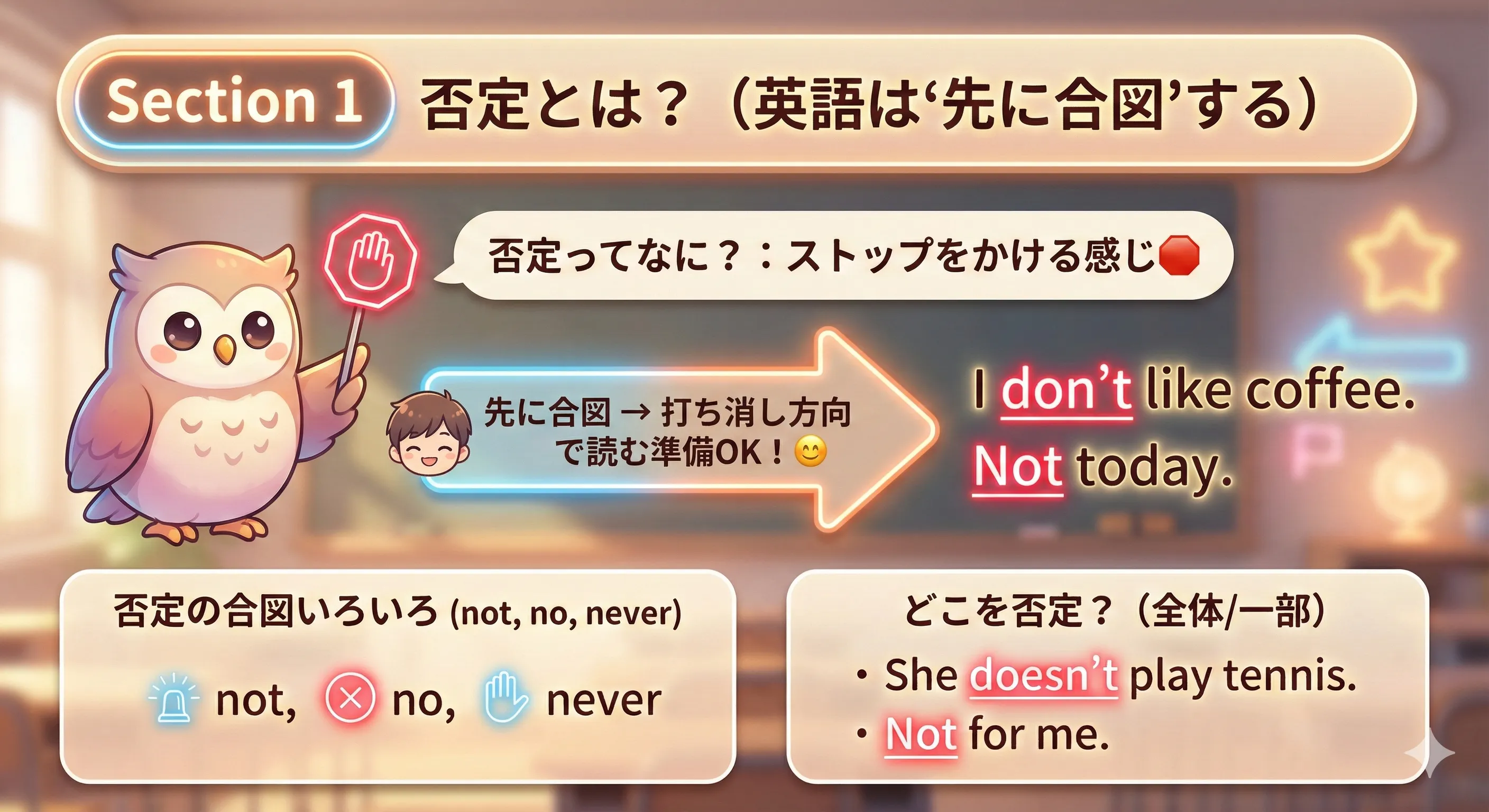
1-1. 否定ってなに?(まずは一言でOK)
否定は、文の意味に「ストップ」をかける感じです🛑
たとえば
like(好き)
を
not
で打ち消すと、「好きではない」になります。
まずは
否定サインを見つける
のが第一歩です😊
I am not hungry.
(私はお腹がすいていません。)
🔧 not を見つけたら 「打ち消しだ!」と気づければOK😊
I don't like coffee.
(私はコーヒーが好きではありません。)
don't が見えたら「〜しない」へ直結!
1-2. 英語は“先に合図”する(否定が早い理由)
英語は、文の前半で
not / don't / never
を出して、読み手に先に方向を伝えます🔔
だから「途中まで読んで、最後でひっくり返る」ことが減り、理解がラクになります😊
最初に否定サインが見えると、後ろは「打ち消し方向」で読む準備ができます。
会話でも、先に “NOの合図” が来ると誤解が起きにくいです。
I don't think he is right.
(私は彼が正しいとは思いません。)
🔧 文の前半で don't が出るので、 「この後は否定方向だ」と早めに分かります。
Not today. I'm busy.
(今日はだめ。忙しいんだ。)
1-3. 否定の合図は1つじゃない(not / no / never などの全体図)
否定の合図は not だけではありません😊
英語には「打ち消し」の道具がいくつもあり、
どれを使うかでニュアンスが変わります。
いちばん基本の否定。「〜ない / 〜ではない」を作る。
「ゼロ(ひとつもない)」を名詞とセットで表す。
「一度もない」など強めの否定(経験ゼロ)。
否定語を使わずに「ほとんど〜ない」を表す(準否定の入口)。
その次に「どれ系の否定?」(
not / no / never など)を見分けると理解が速いです😊
例 否定サインの違いを比べよう
I have no time today.
(今日は時間がありません。)
🔧 no + 名詞 は 「名詞がゼロ」を作る強い形。ここでは time がゼロ です。
I have never been to Okinawa.
(私は沖縄に一度も行ったことがありません。)
not より強く感じることが多いです😊
1-4. いちばん大事:どこを否定してる?(全体?一部?)
ここがいちばん大事です😊
否定は「文ぜんぶ」を打ち消すこともあれば、
「ある部分だけ」を打ち消すこともあります。
つまり、どこに否定サインがかかっているかを見れば意味がハッキリします。
「〜しない」「〜ではない」など、文の内容そのものを打ち消す。 be動詞・助動詞・do とセットで出やすい。
「AじゃなくてB」など、特定の語や句だけを打ち消す。
not が否定したい部分の直前に来やすい。
そこが「打ち消されている場所」=意味の分かれ道です😊
例 “全体否定” と “一部否定” を見分けよう
She doesn't play tennis.
(彼女はテニスをしません。)
🔧 これは文全体の否定です。doesn't が出た時点で「しない」と方向が決まります😊
This gift is for you, not for me.
(このプレゼントは私のためではなく、あなたのためです。)
1-5. よくある勘違い3つ(ここで事故を防ぐ)
否定は「見た目が似ていても、意味のズレ」でつまずきやすいポイントがあります😵💫
ここでは よくある勘違い3つ を先に整理して、
後のセクション(文否定 / 語句否定)で迷わないようにします😊
not がある=全部否定とは限らない(一部だけの否定もある)
no と not は同じではない(no + 名詞 はゼロを作る)
never は強め。文頭に来ると語順が変わることがある(倒置)
例 勘違いしやすいポイントを例文で確認
Not all cats like water.
(すべての猫が水を好きなわけではありません。)
🔧 ここで否定しているのは「猫が水を好き」ではなく、 all(全部) の部分。 「全部がそう、とは言えない」という意味です😊
There is no milk in the fridge.
(冷蔵庫には牛乳がありません。)
🔧 no + 名詞 は 「名詞がゼロ」を作ります。ここでは milk がゼロ というイメージです🧊
I never skip breakfast.
(私は朝食を抜くことは決してありません。)
1-6. ミニまとめ(今日の一言)→ 次は「文否定 / 語句否定」へ
セクション1で押さえることは、難しい暗記ではありません😊
否定サインを見つける →
どこを否定しているか
を見るだけで、英語がグッと読みやすくなります✨
英語の否定は、否定サインを先に出して、 読み手に方向を知らせる。 だからまず「どこが打ち消されてる?」を見よう😊
- not / don't / never / no を見つけられる
- not の直後(打ち消される場所)に注目できる
- ゼロ(no)なのか、強め(never)なのかがざっくり分かる
例 次セクションにつながる「2パターン」を先に体感
He is not ready.
(彼は準備ができていません。)
🔧 is not が出たら「〜ではない」。 文の内容を丸ごと打ち消しています。
This is my pen, not his.
(これは彼のではなく、私のペンです。)
次のセクションでは、否定を 「文全体」と 「一部」 に分けて整理します(文否定 / 語句否定)😊
2. 否定の種類(文否定 / 語句否定)土台(まずは全体像)
否定は「文ぜんぶを否定」することも、
「ここだけ否定」することもあります😊
ここを分けて考えるだけで、英文の読みやすさが一気に上がります✨
キーワードは not / do / be / 助動詞 など。
それぞれが得意な役割(イメージ)を持っています。
ここでは詳しい説明に入る前に、
「まずはざっくりイメージをつかむ」ことを目標にしましょう。
むずかしい用語が出てきたら、
(かんたんな言いかえ)
もいっしょに添えます😊
例:助動詞(動詞を助ける言葉:can / will など)、
文否定(文ぜんぶを打ち消す)、
語句否定(ここだけ打ち消す)
🖼️ 図でつかむ:文否定 vs 語句否定(全体像)
この図は「否定が 文ぜんぶ にかかるのか、
一部だけ にかかるのか」を一目で整理するためのものです😊
むずかしそうに見えても大丈夫。
(全体=文ぜんぶ/一部=ここだけ)
という感覚が分かればOKです✨
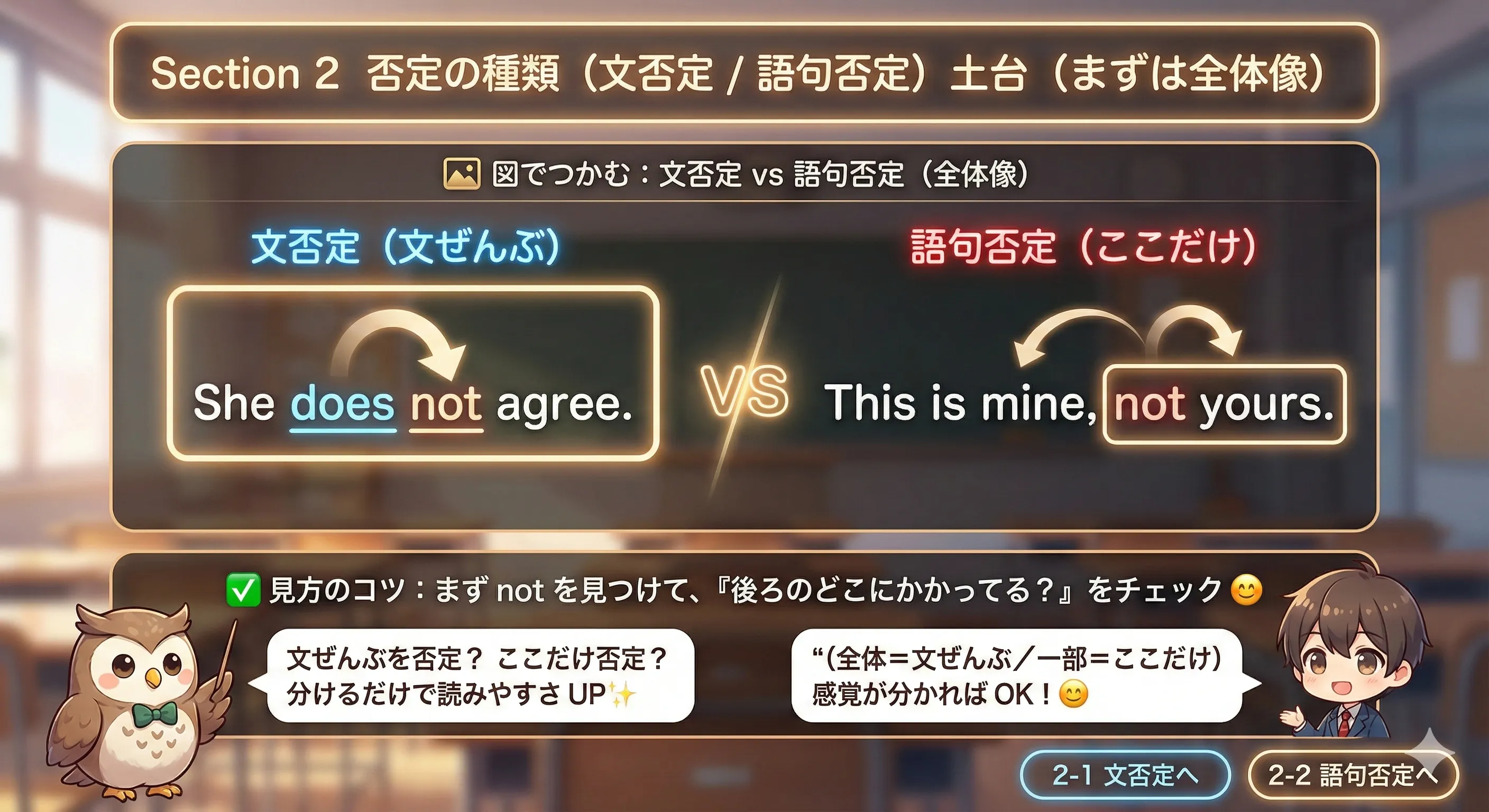
✅ 見方のコツ:まず not を見つけて、 「後ろのどこにかかってる?」をチェックしましょう😊
🧭 次はどちらから読む? 2-1 ~ 2-2 へのナビゲーション
2-1 と 2-2 は、どちらから読んでもOKです😊
「文ぜんぶを否定?」が気になるなら 2-1、
「ここだけ否定?」が気になるなら 2-2 から進みましょう。
途中で行ったり来たりしても大丈夫です✨
-
文否定:
文の内容そのものを「〜しない / 〜ではない」にする(例:
do not/is not)。 -
語句否定:
「AじゃなくてB」のように、
notを使って“ここだけ”を打ち消す。
人は「完璧に分かってから始める」よりも、 「だいたい分かった状態でまず動いてみる」 方が、記憶に残りやすく学習が続きやすいです😊
まずは 2-1 / 2-2 を“入口だけ”でも読んで、少しずつ理解を育てていきましょう✨
🚫 2-1. 文否定(be動詞・助動詞・do の否定)
このパートでは、文の意味をまるごと「〜しない / 〜ではない」にする
文否定を整理します😊
英語の否定は、読み手が迷わないように not を早めに出して
方向を先に知らせる のが得意です✨
not は “助け役” のうしろ!
(助け役=文の形を作るお手伝いをする言葉。be / 助動詞 / do など)
is not/are notなど、be動詞の否定がパッと読めるcan not/will notなど、助動詞の否定の形が分かる- 一般動詞は
do notを使う理由が“納得”できる
まず not を探して、 直前にある “助け役” を確認します👀
be / 助動詞(動詞を助ける言葉) / do
形が分かるだけで英文がスイスイ読めるようになるので、気楽に進めていきましょう😊
🖼️ 図でつかむ:文否定は「助け役のうしろに not」
この図では、否定の合図 not が
どこに置かれるか を見える化しています😊
むずかしく感じたら、
(助け役=文の形を助ける言葉)
とだけ覚えればOKです✨
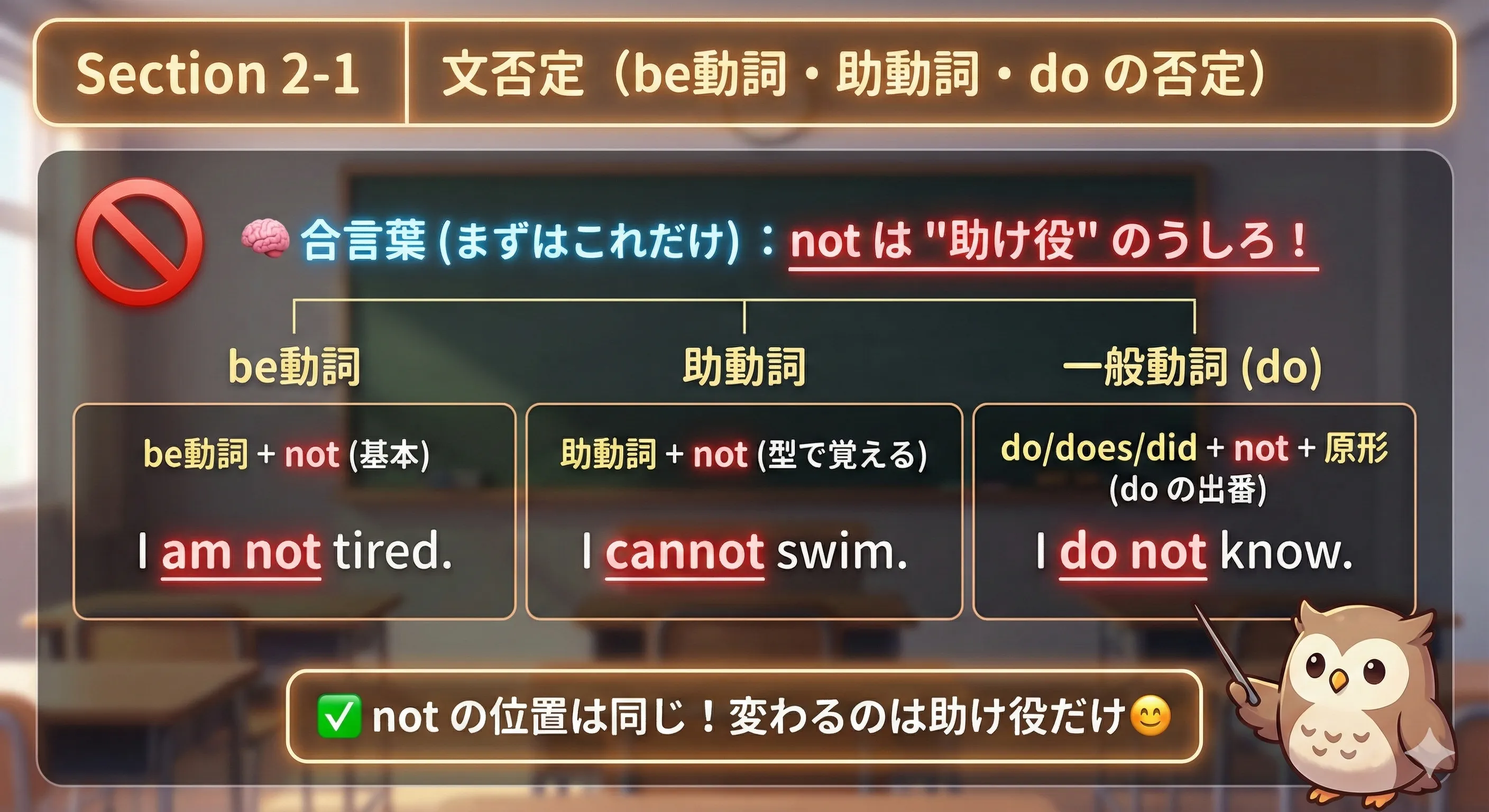
2-1-0. 導入:文否定ってなに?(ここからは“文ぜんぶ”を打ち消す)
文否定は、文の意味をまるごと「NO」にするイメージです🚫
だから、否定サイン not は
文の形を作る“助け役”の近く
に置かれます。
(近く=たいてい“直後”)
not は助け役のうしろ!
これだけで、まずは読めるようになります😊
I am not tired.
(私は疲れていません。)
🔧 am not が見えたら、 文ぜんぶが「NO」方向だと分かります。
I do not know.
(私は知りません。)
2-1-1. be動詞の否定:am/is/are/was/were + not
be動詞は「〜です / いる / ある」を表しやすい言葉です😊
(状態を言う動詞)
否定は超かんたんで、
be動詞の直後に
not を置くだけ!
be動詞 + not が見えたら、文否定だとすぐ分かります😊
He is not a student.
(彼は学生ではありません。)
🔧 “be動詞のすぐ後ろ” の not がポイント。
They were not ready.
(彼らは準備ができていませんでした。)
is/are が was/were に変わるだけ。
位置は同じで was/were の後ろに not です😊
🧩 2-1-2. 助動詞の否定:助動詞 + not(can / will / should など)
助動詞は、動詞に「気持ち」や「予定」などを足す言葉です😊
(動詞を助ける言葉:can / will / should など)
否定の作り方はシンプルで、
助動詞の直後に not を置くだけ!
助動詞 + not + 動詞の原形(原形=辞書にのっている基本の形)
can / will / should / may / must などが見えたら、 そのすぐ後ろの not を探しましょう👀
I cannot swim.
(私は泳ぐことができません。)
🔧 cannot は can + not が合体した形です。
You should not worry.
(心配しないほうがいいよ。)
🧰 2-1-3. 一般動詞の否定:do/does/did + not + 動詞の原形
一般動詞(run / like / play など)は、そのままだと not を置く場所がありません😅
そこで do が助け役として登場して、文否定の形を作ります。
(do=文の形を作るお手伝い)
do / does / did +
not +
動詞の原形(原形=辞書の形。does/did が来ても、後ろの動詞は基本の形に戻ります)
does not / did not の後ろは原形(動詞の基本の形)です✨
I do not know.
(私は知りません。)
🔧 do not が「否定の枠」を作り、 後ろの動詞は そのまま(原形) でOK😊
She does not like coffee.
(彼女はコーヒーが好きではありません。)
does not likes にならないよう注意!does not の後ろは原形なので like です😊
🔎 2-1-4. 形が変わるところだけチェック(時制・主語で助け役が変わる)
否定の形は、基本はずっと同じです😊
変わるのは主に
「助け役」の部分だけ。
ここでは “変わる所だけ” を最小セットで整理します✨
| 場面 | 否定の型(覚える形) | 例(イメージ) |
|---|---|---|
| be動詞 状態の文 |
am/is/are + notwas/were + not
|
例:
She is not happy.
|
| 助動詞 can / will など |
助動詞 + not + 原形
|
例:
You should not worry.
|
| 一般動詞 動作の文 |
do/does/did + not + 原形
|
例:
She does not like coffee.
|
I do not understand.
(私は理解しません。)
🔧 主語が I / you / we / they なら、ふつうは do not がよく出ます。
He does not play soccer.
(彼はサッカーをしません。)
⚠️ 2-1-5. よくあるミス(ここで事故を防ぐ:超短く)
文否定でつまずくのは、だいたいこの3つです😊
ここだけ押さえておけば、ミスが一気に減ります✨
助け役の後ろが基本!
× He not is ...
✅ He is not ...
一般動詞は do が必要🧰
× I not understand.
✅ I do not understand.
does/did の後ろは原形!
× does not likes
✅ does not like
He is not late.
(彼は遅刻ではありません。)
🔧 is のうしろに not が来ます。
She does not like tea.
(彼女は紅茶が好きではありません。)
🔧 does not の後ろは likes ではなく
like😊
✅ 2-1-6. ミニまとめ:合言葉1つ → 次は2-2へ
文否定は、見抜き方が分かれば一気にラクになります😊
最後に、今日の合言葉を1つだけ持ち帰りましょう✨
not は “助け役” のうしろ!
(助け役=
be / 助動詞 / do)
I am not sure.
(私は確信がありません。)
🔧 am の直後に not → 文ぜんぶ否定😊
We do not need it.
(私たちはそれが必要ありません。)
🔧 一般動詞は do が助け役になって not の場所を作ります🧰
2-2 では「文ぜんぶ」ではなく
“ここだけ否定” を練習します😊
not の直後にある語句が、意味のカギになります✨
🎯 2-2. 語句否定(not を“否定したい場所”の直前に)
2-1 の「文否定」は文ぜんぶを「NO」にしましたが、
2-2 は “ここだけNO” を作るテクニックです😊
コツはとてもシンプル:
not の右となり(直後)
を見ると、どこを否定しているかがすぐ分かります👀
not の右隣が“否定される場所”!
(右隣=すぐ後ろ。単語でも、かたまりでもOK)
あとは 「not の右隣チェック」 をクセにするだけ!
🖼️ 図でつかむ:語句否定は「not の右隣」を見る
文ぜんぶを否定するのではなく、ピンポイントでNO にするのが語句否定です🎯
図では not のすぐ後ろが
「否定されているパーツ」だと分かるようにしています👀
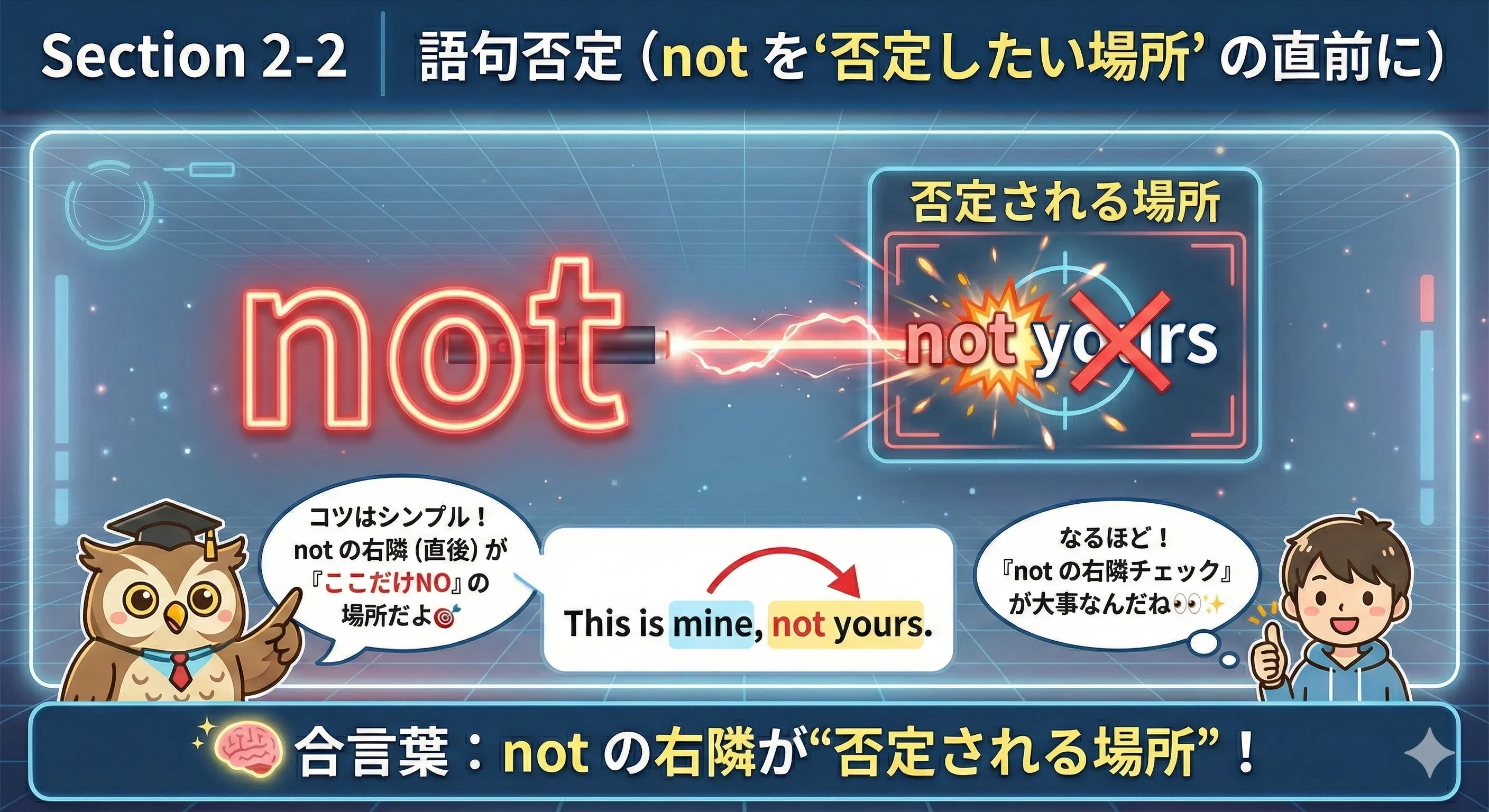
🚦 2-2-0. 導入:語句否定ってなに?(“ここだけNO”)
語句否定は「文ぜんぶ」を否定するのではなく、
ある1か所だけ を否定する形です🎯
だから、読み方もシンプル:
not の直後 を見て
「どこがNOなのか」を当てにいきます👀
This is mine, not yours.
(これは私のもので、あなたのものではありません。)
🔧 not の右隣 yours が否定される場所です。
It’s for fun, not for work.
(これは仕事ではなく、遊びのためです。)
🔧 右隣の for work が 「NO」になるので、全体は「遊びのため」という意味になります😊
I chose tea, not coffee.
(私はコーヒーではなく、紅茶を選びました。)
🧱 2-2-1. 単語を否定:not + 1語(名詞・形容詞・代名詞など)
まずは一番シンプルな形からいきましょう😊
not の直後が「否定される単語」
になります。単語1つだと “どこがNOか” が目で追いやすいです👀
(Aであって、Bではない)
not の右隣の1語 を見て、 「それがNOなんだな」と確認しましょう👀
She is kind, not rude.
(彼女は失礼ではなく、親切です。)
🔧 rude が「NO」なので、 反対側の kind を言いたい文になります😊
This is not mine.
(これは私のものではありません。)
be + not ですが、
意味のポイントは not の直後の mine を否定している点です😊
He wants the blue one, not the red one.
(彼は赤ではなく、青のほうが欲しいです。)
🔧 not の右隣が “ダメな候補” になり、前半が “言いたい候補” になることが多いです😊
🧩 2-2-2. 句を否定:not + かたまり(前置詞句・場所/時間/目的など)
「句(く)」は、かんたんに言うと
単語がまとまった“ひとかたまり” です😊
(たとえば for work / in Tokyo / at 3 p.m. など)
語句否定では、not の直後の“かたまり” が
そのまま「NO」になります🎯
(Aであって、その“かたまり”ではない)
not の右隣を“最後まで”読む と、否定されている範囲が分かります👀
(1語で止めず、
for work のようにかたまりで見る)
This trip is for pleasure, not for work.
(この旅行は仕事ではなく、遊びのためです。)
🔧 for work(仕事のため)が「NO」→ 「遊びのため」が言いたい内容になります😊
He lives not in Tokyo, but in Osaka.
(彼は東京ではなく、大阪に住んでいます。)
We'll meet not at 3 p.m., but at 4 p.m.
(私たちは3時ではなく、4時に会います。)
🔧 “時間” のかたまり(at 3 p.m.)が丸ごと「NO」になります⏰
🧭 2-2-3. 不定詞を否定:not + to do(「〜しないこと」)
to + 動詞 は「〜すること」「〜するために」などを表します😊
そこに not を置くと、
「〜しないこと」 が作れます。
ポイントは、to の前に not を入れることです✨
to + 動詞の原形(例:
not to go=行かないこと)
not to 〜 が見えたら、 「その行動をしない」という意味になります🚫
I decided not to go.
(私は行かないことに決めました。)
🔧 decided の後に not を置くと 「行く」ではなく「行かない」を選んだことになります😊
Try not to worry.
(心配しないようにしてみて。)
It’s important not to rush.
(急がないことが大切です。)
🔧 “大事なのは〜すること” の形で、 not to + 動詞 がよく使われます✨
🚭 2-2-4. 動名詞を否定:not + 〜ing(「〜しないこと」)
〜ing は「〜している」だけじゃなく、
“〜すること” という意味でも使えます😊
(動詞なのに名詞っぽい使い方)
そこに not を前に置くと、
「〜しないこと」 が作れます✨
〜ing(例:
not smoking=喫煙しないこと)
not の直後が 〜ing なら、 「その行動をしないこと」を表します🚫
Thank you for not smoking.
(禁煙にご協力ありがとうございます。)
🔧 for + 〜ing はよく出ます。 not を付けると「〜しないこと」になります😊
She apologized for not calling.
(彼女は電話しなかったことを謝りました。)
I’m proud of not giving up.
(あきらめなかったことを誇りに思います。)
🔧 of + 〜ing も定番。ここでは「やめない」を誇っています✨
⚖️ 2-2-5. 節を否定:not + 文のかたまり(「AではなくB」)
「節(せつ)」は、
主語+動詞がある“小さな文”のかたまり です😊
ここではよく使う形
not A but B
を中心に、
「Aを否定して、Bを言いたい」流れをつかみます✨
(AではなくB)
AもBも否定 ではありません🙅♀️
Aを否定して、Bをはっきり言う 形です✨
I study English not to get perfect scores, but to communicate.
(私は満点を取るためではなく、会話するために英語を勉強しています。)
🔧 not の右隣の目的(to get perfect scores)が「NO」。 言いたいのは後半の目的です😊
It matters not what you say, but what you do.
(大事なのは言うことではなく、することです。)
He apologized not because he was forced to, but because he wanted to.
(彼は無理やりだからではなく、自分から謝りたくて謝りました。)
🔧 「理由」のかたまり(because ~)を否定して、後半の理由を言っています😊
🧾 2-2-6. 文頭の not:Not + 〜ing(理由・状況の説明)
文のはじめに
Not + 〜ing
を置くと、
「〜しなかったので」「〜するつもりがなかったので」など、
理由(わけ)や状況 をサッと説明できます😊
小学生向けに言うと、
(最初に“前置き”をつける言い方) です✨
〜ing, 主語 + 動詞 ...(例:Not knowing ..., I couldn't ...)
文頭の Not + 〜ing は 「前置き(理由)」になりやすいです。
そのあとに来る “主語+動詞” がメインの文です😊
Not knowing her number, I couldn’t call her.
(彼女の番号を知らなかったので、電話できませんでした。)
🔧 前半(Not knowing ...)=理由、後半(I couldn't ...)=メインの出来事📞
Not wanting to bother you, I left early.
(迷惑をかけたくなかったので、早めに帰りました。)
Not being sure, I asked again.
(確信がなかったので、もう一度聞きました。)
🔧 “Not being sure” は「自信がない状態」=状況説明です👀
🧯 2-2-7. よくあるミス3つ(ここで事故を防ぐ)
語句否定はルール自体はかんたんですが、
「どこが否定?」 の見間違いで意味がズレやすいです😅
ここで3つだけ、事故を防ぎます🛡️
not の右隣 を見ずに、 なんとなく訳すとズレます👀
This is mine, not yours.
(これは私のもので、あなたのものではない。)
「文ぜんぶNO」と「ここだけNO」を混ぜると、 形 も 意味 も迷子になります😵💫
I do not like coffee.
(私はコーヒーが好きではありません。)
🔧 これは 文否定(2-1)。
一般動詞の否定は do not が必要です。
これは AとBの両方を否定 ではありません🙅♀️
Aを否定して、Bを言います⚖️
It's not expensive, but cheap.
(高いのではなく、安いです。)
「not の右隣を指で追う」 → まず否定される場所を確定すると、事故が減ります👀✨
🎁 2-2-8. ミニまとめ:合言葉1つ → 次へ
語句否定は、がんばって暗記しなくてOKです😊
“見る場所”が決まれば、意味がスッと取れます✨
not の右隣が“否定される場所”! (単語でも、かたまりでも、“右隣を最後まで”見る)
This is mine, not yours.
(これは私のもので、あなたのものではありません。)
I decided not to go.
(私は行かないことに決めました。)
🔧 not の右隣(to go)が「NO」→「行かない」になります😊
Not knowing her number, I couldn’t call her.
(彼女の番号を知らなかったので、電話できませんでした。)
3. 全否定(強い否定:ひとつも〜ない)をまとめてつかむ
ここでは no / not a single / neither / never など、
「ゼロ(0)」を言い切る否定 をまとめて見ます🧊
「強い否定」は、
小学生にも分かる言い方にすると
(“ひとつもない!”って言い切る) という感じです😊
ここでは詳しい説明に入る前に、
「まずはざっくりイメージをつかむ」ことを目標にしましょう。
ちょっと難しい言葉が出たら、 (かんたんな日本語の言いかえ) をすぐ横に添えていきます✨
否定 × 強さ 概観セクション Lesson 112 / Section 3🖼️ イメージでつかむ:全否定(“0” を見える化)
「全否定」は ゼロ(0) を言い切る否定です🧊
たとえば「雲がひとつもない」「一度もない」「どちらも違う」など、
“ゼロの種類” がいくつかあるのがポイントです😊

no=数が0、not a single=“1つも”0、neither=2択で0、never=経験が0、little=“少しも”0まずは「どの0?」を選べるようになるのが目標です✨
🧨 ここからは「強い否定」ゾーン!3-1 ~ 3-6 の入口ガイド
Section 2 で「どこを否定するか(文?ここだけ?)」が分かったら、
次は “どれくらい強く否定するか” を整えます😊
ここで扱うのは「全否定(ぜんひてい)」=
(ひとつもない、と言い切る否定) です。
例:雲が1つもない / 一度も見たことがない / どっちも違う
次は「ゼロを言い切る表現」を“使える形”にしていきましょう!
人は「完璧に分かってから始める」よりも、 「だいたい分かった状態でまず動いてみる」 方が、記憶に残りやすく学習が続きやすいです😊
このセクションは “地図” なので、まずは気になるカードから進んでOKです!
3-1. no + 名詞(「ひとつも〜ない」を最短で)
no は、名詞の前に置いて
「ゼロ(0)」を言い切る 表現です🧊
小学生向けに言うと、
(名詞の前に「0の札」を置く) イメージ😊
ここでは「まずはイメージ→形→例文」で、スッと使えるようにします。
(例:no time=時間が0 → 時間がまったくない)
🖼️
まずは感覚:no は「0(ゼロ)」を置く
英語の no は「ない」を言うというより、
“数が0” を作る感じです😊
だから no の後ろに来る名詞が、
そのまま「0になるもの」です。

「no の右にある名詞=0になるもの」 と覚えると、 速く意味が取れます👀✨
🧊
3-1-0. 導入:no は「ゼロ」を置くサイン(0を置く)
not は「〜ではない」ですが、no はもっとシンプルに
“名詞をゼロにする” ことができます😊
小学生向けに言うと、
(名詞の前に「0」って札をペタッと貼る) 感じです。
I have no time today.
(今日は時間がまったくありません。)
🔧 time(時間)が0 → 「時間がない」
There is no milk in the fridge.
(冷蔵庫に牛乳がありません。)
🔧 milk(牛乳)が0 → 「牛乳がない」
She has no idea what it means.
(彼女はそれが何を意味するか、全然わかっていません。)
📝 idea=「考え・手がかり」(わかるためのヒント) が0
🧩
3-1-1. 基本の形:no + 名詞(単数 / 複数 / 数えない名詞)
ここで大事なのは1つだけ:
「no の後ろは “名詞”」
です😊
名詞が 単数 か
複数 か
数えない かで、
“ゼロにする対象”が変わるだけです。
(数えない=水や時間みたいに数えにくい名詞)
| 種類 | 形(見た目) | 意味(やさしく) | 例(英文) |
|---|---|---|---|
| 単数名詞 |
no + a を付けない単数名詞
|
「1つもない」(その名詞が0) |
例:
I have no car.
|
| 複数名詞 |
no + 複数名詞
|
「ひとつも/ひとりもない」(数が0) |
例:
We have no meetings.
|
| 数えない名詞 |
no + 数えない名詞
|
「少しもない」(量が0) |
例:
There is no water.
|
👉 表は横にスワイプできます
「no の後ろの名詞が “0” になる」 —— これだけ覚えればOKです😊
I have no car.
(私は車を持っていません。)
🔧 car(車)が0 → 「車を持っていない」
We have no meetings tomorrow.
(明日は会議がひとつもありません。)
🔧 meetings(会議)が0 → 「会議がない」
He has no money right now.
(彼は今、お金が全然ありません。)
🔧 money(お金)が0 → 「お金がない」
There is no water left.
(水がもう残っていません。)
📝 left=「残っている」(残りが0)
🧰
3-1-2. 超よく使う:have no + 名詞(持ってない・ない状態)
have no + 名詞 は、いちばん使いやすい「ゼロ表現」です😊
小学生向けに言うと、
(持ち物・時間・情報などが “0” だよ)
をサクッと言える形。
I have no choice.
(私には選択肢がありません。)
📝 choice=「選ぶもの」(選択肢) が0
We have no information yet.
(私たちはまだ情報がありません。)
📝 yet=「まだ」(今の時点では0)
He has no problem with it.
(彼はそれについて問題ありません。)
🔧 problem(問題)が0 → 「問題ない」
I have no idea how to start.
(どう始めればいいか、全然わかりません。)
📝 idea=「手がかり」(分かるヒント) が0
「時間・情報・選択肢・問題」みたいな “状態(ある/ない)” を言うときに強いです😊
📍
3-1-3. 存在をゼロにする:There is/are no + 名詞
There is/are は「〜がある/いる」を言う形。
そこに no を入れると、
「その場所に“ひとつもない”」
をスパッと言えます😊
小学生向けに言うと、
(その場所の中が “0” です) という感覚です。
| 数の感覚 | 形 | 例(ミニ) |
|---|---|---|
| 1つ/数えない | There is no + 名詞 |
例: There is no water. |
| 複数 | There are no + 複数名詞 |
例: There are no seats. |
is / are の違いは「名詞が1つっぽい? 複数?」だけ見ればOKです😊
There are no seats available.
(空いている席がありません。)
📝 available=「空いている」(使える席が0)
There are no clouds in the sky.
(空には雲がひとつもありません。)
🔧 clouds(雲)が0 → 「雲がない」
There is no parking here.
(ここは駐車できません/駐車場がありません。)
📝 parking=「駐車(する場所/行為)」(ここでは0)
There are no mistakes in this report.
(この報告書にはミスがひとつもありません。)
🔧 mistakes(ミス)が0 → 「ミスがない」
🚀
3-1-4. 強調ブースト:absolutely no / no … at all(ゼロ感を強く)
no だけでも「ゼロ」ですが、
さらに強くしたいときは ブースト語 を足します💥
小学生向けに言うと、(“0” を太字で言う) みたいな感じです😊
(完全にゼロ/まったくゼロ)
(ぜんぜん/まったく〜ない)
強調は便利ですが、毎回つけると重く見えるので 「本当にゼロを強く言いたいときだけ」がおすすめです😊
I have absolutely no interest in it.
(それに興味がまったくありません。)
📝 interest=「興味」(好き・関心)
There is no reason at all to rush.
(急ぐ理由がまったくありません。)
📝 reason=「理由」/rush=「急ぐ」
I have no time at all today.
(今日は時間がまったくありません。)
🔧 no time+at all=「ゼロ感をさらに強く」
There is absolutely no doubt about it.
(それについて疑いはまったくありません。)
📝 doubt=「疑い」(うたがう気持ち)
🔁
3-1-5. 書き換えで理解:no + 名詞 = not any + 名詞
意味はほぼ同じで、言い方が違うだけです😊
ざっくり言うと、
no + 名詞
は 短く・強く、
not any + 名詞
は 動詞に合わせやすい 形です。
「any」 は “どれか1つでも” のイメージ (1つでもあればOK)
I have no friends here.
(ここに友だちがひとりもいません。)
I don't have any friends here.
(ここに友だちがひとりもいません。)
There is no water left.
(水がもう残っていません。)
There isn't any water left.
(水がもう残っていません。)
She has no experience.
(彼女には経験がありません。)
She doesn't have any experience.
(彼女には経験がありません。)
💡 使い分け(やさしく)
- 短く言いたい → no + 名詞
-
動詞に合わせて自然に →
not ... any
(例:
don't have any)
「no は名詞を0にする」→ これが分かれば、書き換えも迷いません。
🧯 3-1-6. よくあるミス(事故防止3つだけ、超短く)
ここだけ押さえれば OK!
(ミスを先に潰すと、後がスイスイ進みます😊)
×
I don't have no time.
〇
I have no time.
/
I don't have any time.
🔎 don't と no を同時に使わない(基本)
×
There are no any seats.
〇
There are no seats.
/
There aren't any seats.
🔎 「no」か「not ... any」か、どっちかにする
×
No parking is here.
〇
There is no parking here.
🔎 「その場にない」は There is/are が自然
no は “名詞を0にする札”。
「名詞に付ける」→ これだけ守れば事故が激減します😊
3-2. not a (single) + 名詞(「ただの1つも…ない」)
no + 名詞 が「ゼロ」なら、not a (single) は
「1個すらゼロ」の超強調バージョン🧊
小学生向けに言うと、
「0をさらにズームして “1つもない!” を強く言う」感じです😊
「ただの1つも…ない」を 短く・強く 言えるようになろう!
🖼️
イメージ図:not a (single) は「1個すらゼロ」
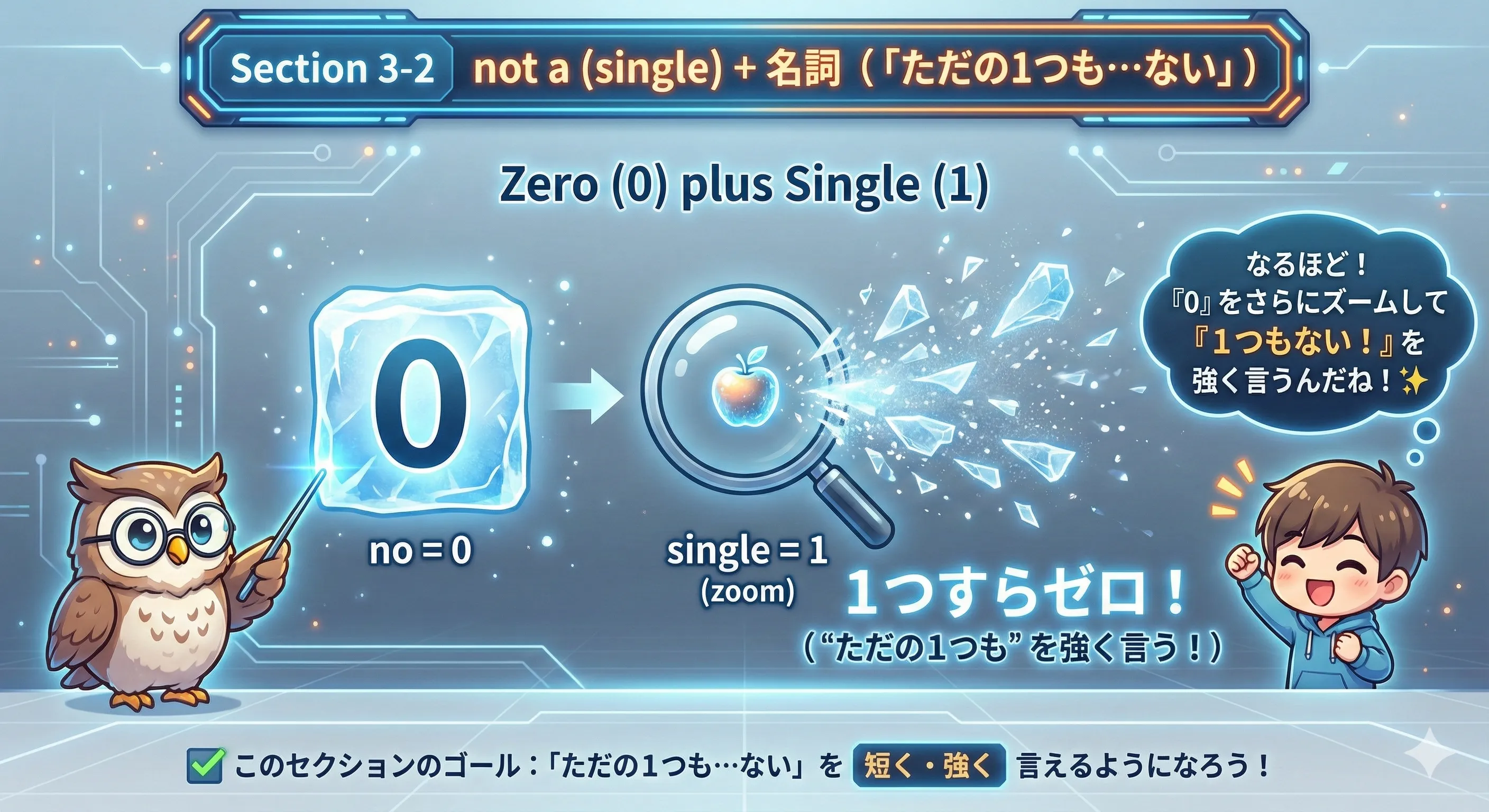
👉 「ゼロ」でも、さらに single(たった1つ) を付けると “1つすら無い” をグッと強くできます。
🧊
3-2-0. 導入:not a (single) は「1個すらゼロ」のサイン
no は「ゼロ」を置く合図でしたね。
それをさらに強くして、
「1個すら無い」
を言いたいときに not a (single) + 名詞 が活躍します✨
not a single=0(しかも 1つも!)
(“1個だけでも” のイメージ)
There was not a sound.
(物音が1つもしなかった。)
I got not a single reply.
(返信が1件も来なかった。)
Not a single student was late.
(遅刻した生徒は1人もいなかった。)
✅ ここが分かればOK!
「no=0」に加えて、single=“1つ” が分かると、 “1個すらない” の感覚が一気にハッキリします😊
次は「形(作り方)」をしっかり押さえて、使える表現にしていきましょう😊
🧩
3-2-1. 基本の形:not a + 単数名詞(“1つもない”の作り方)
ここで大事なのはこれだけ👇
not a の後ろは「単数名詞」
です。
意味は「その名詞が 0(ひとつもない)」になります。
a は「1つ」の印。でも前に
not があるから、
「1つもない」 になるイメージ😊
(数えられる名詞=1個、2個…と言える名詞)
no + 名詞 の方が自然なことも多いですが、not a は 文章・強調・言い切り でよく見ます。
There was not a sign of life.
(生命の気配がまったくなかった。)
There was not a trace of fear.
(恐れの気配は少しもなかった。)
He said not a word.
(彼は一言も言わなかった。)
not a word=「一言も〜ない」の定番表現
🔍 1秒チェック(超大事)
- 形: not a + 単数名詞
- 意味: 「1つもない」=その名詞が 0
- コツ: “a があるのにゼロ?” → not が打ち消してる!
not a single + 名詞 にすると、
「ただの1つも…ない」がさらにくっきり強調できます!
🚀
3-2-2. 強調ブースト:not a single + 名詞(“ただの1つも”)
not a + 単数名詞 でも「1つもない」ですが、
single(たった1つ)を足すと、
“ただの1つも!”
の気持ちがグッと強くなります🧊
(小学生向け)「1つだけでもいいから欲しいのに、それすらゼロ…」というニュアンスです。
not a single + 単数名詞(single は “1つ” を強く意識させる言葉)
word(一言) / mistake(ミス) / chance(チャンス) /
person(人) / reply(返信)
He didn't say a single word.
(彼は一言も言わなかった。)
a single word(たった一言)を否定すると、静けさの強調になります。
She made not a single mistake.
(彼女はミスを1つもしなかった。)
Not a single person noticed it.
(それに気づいた人は1人もいなかった。)
🧩 使い分けミニ
not a word(一言もない)
not a single word(“ただの1つの言葉すら”ない)
single は “1” をズームして強調するスイッチ。「たった1つもダメだった…」の感情がある文で特に映えます😊
🎥
3-2-3. 超頻出:There was/were not a + 名詞(その場にゼロ)
There is/are の過去形が There was/were。
だからこの形は、
「その時、その場所に1つも無かった」
を言う定番フレーズです📍
(小学生向け)「その場に“何もなかった”」を実況する感じです。
There was not a + 単数名詞There were no + 複数名詞
sound(物音) / trace(痕跡) / sign(しるし) /
one(人) / light(明かり)
was、複数なら were を意識しよう!
There was not a sound in the room.
(部屋の中は物音が1つもしなかった。)
There was not a trace of snow.
(雪の跡は少しもなかった。)
There was not a soul on the street.
(通りには人っ子1人もいなかった。)
not a soul は「人っ子一人いない」の定番表現。
🔁 使い分け1行
今の話なら There is/are no、
過去の話なら There was/were not a(または no)がしっくりきます😊
There was/were は「その場の実況(過去)」+ not a で「1つすらゼロ」!物語・説明・レポートでめちゃくちゃ使えます📍
🎤
3-2-4. かっこよく言える:Not a single + 名詞 + 動詞(主語としてゼロ宣言)
Not a single + 名詞
を文の先頭(主語)に置くと、
「1つも(1人も)ない!」を
ドンッと宣言できます✨
(小学生向け)「最初に“ゼロ!”って言ってから説明する」感じです。
Not a single + 単数名詞 + 動詞(単数名詞なので動詞は基本「三単現」になりやすい)
person(人) / student(生徒) / word(言葉) /
ticket(チケット) / email(メール)
Not a single person noticed the mistake.
(そのミスに気づいた人は1人もいなかった。)
Not a single guest showed up.
(来客は1人も来なかった。)
show up=「現れる/来る」
Not a single ticket was left.
(チケットは1枚も残っていなかった。)
was left)でもOK。「残りゼロ」をきれいに言えます。
✨ かっこよさの理由
英語は「最初に合図」を出すのが得意。
Not a single を先に置くと、読み手が一瞬で「ゼロの話だ!」と分かります。
Not a single は「ゼロ宣言」。レポート・ストーリー・会話でも “強い印象” を作れます😊
🔁
3-2-5. 書き換えで理解:
not a (single) + 名詞 = no + 名詞 / not any + 名詞
ここは「意味の地図」を作るパートです🗺️
“ゼロ” を言う方法は複数あるけど、言っていることは同じ
と整理しましょう。
(小学生向け)「ゼロの言い方が3種類あるだけ」だと思えばOK!
| 言い方 | 例文 | 日本語のイメージ |
|---|---|---|
強調
not a (single)
|
例:
There was not a sound.
|
「1つすらゼロ」🧊(インパクト強め) |
短い
no
|
例:
There were no seats.
|
「ゼロ」⚡(短く言い切り) |
ふつう
not any
|
例:
There weren't any seats.
|
「1つも〜ない」🧩(会話でよく出る) |
強く言いたい→
not a single /
短く言いたい→ no /
ふつうに言う→ not any
There was not a sound.
(物音は1つもなかった。)
There was no sound.
(物音はゼロだった。)
There were no seats.
(席が1つもなかった。)
There weren't any seats.
(席が1つもなかった。)
not any 型では not は動詞側(weren't)に入ります。
Not a single person called me.
(私に電話した人は1人もいなかった。)
No person called me.
(私に電話した人はいなかった。)
No person ... は文としてOKですが、日常では
Nobody ...(誰も〜ない)もよく使われます。
🧯 3-2-6. よくあるミス3つ(事故防止・超短く)
not と no を二重にしがち○ I don't have any money.
a が必要なのに落としがち○ There was no sound.
was / were と名詞の単複がズレがち○ There was no time.
3-3. neither(2つのうち、どちらも〜ない)
neither は、
「2つのうち、両方にNO」
を出すためのサインです🧊✋✋
たとえば A と B を選ぶ場面で、
「どっち?」と聞かれても
「どっちも違う」
と言えるのが強みです。
※ 2択(2つだけの選択)専用。3つ以上だと別の言い方が登場します。
このセクション前半では、
neither + 単数名詞(どちらの〜も)を中心に、
(限定詞=名詞の前で“どの〜”を決める言葉)
をやさしく整理します😊
🧭 図でつかむ:A / B どっち? → neither(どっちもNO)
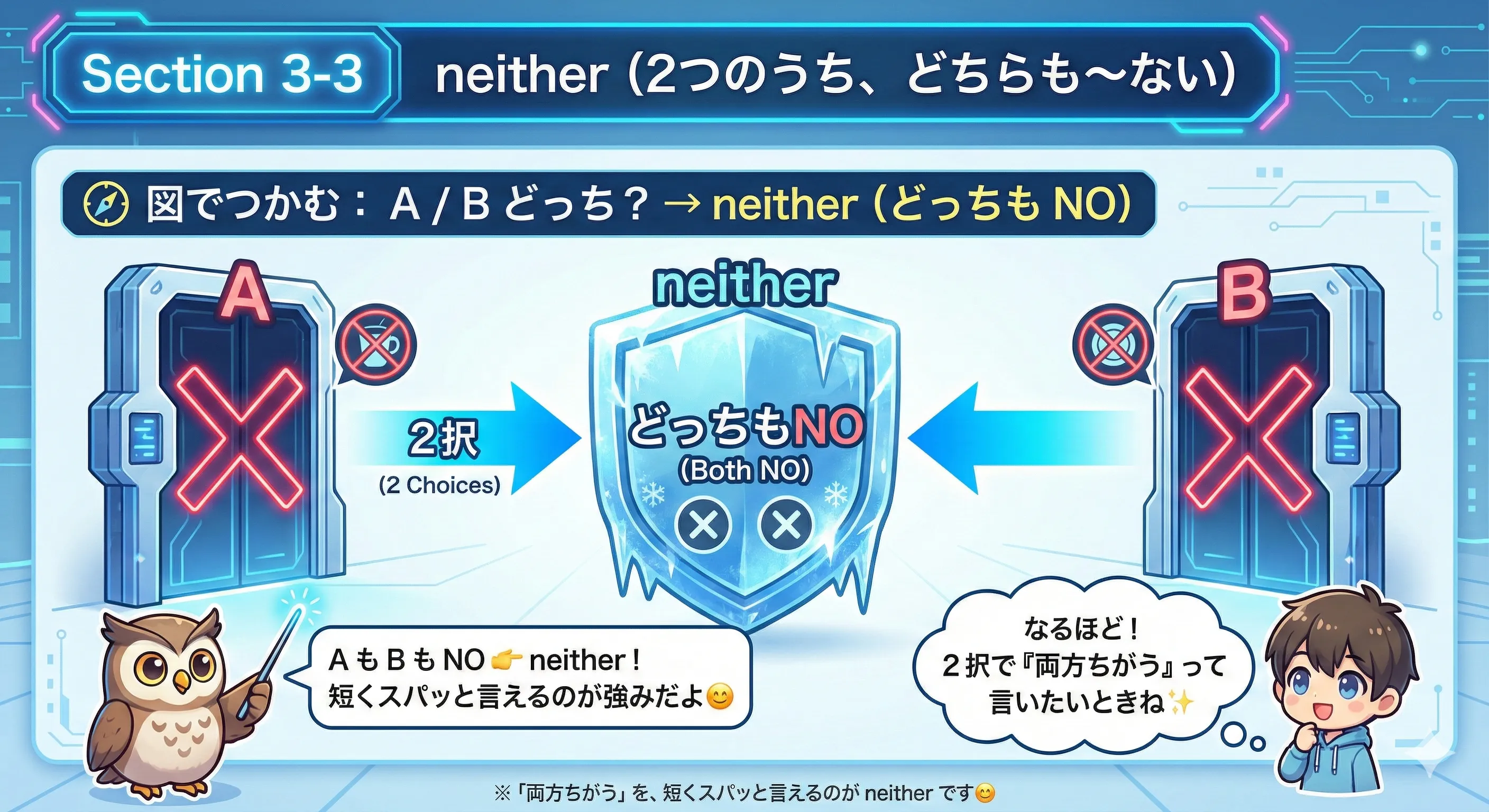
neither※「両方ちがう」を、短くスパッと言えるのが
neither です😊
🧊 3-3-0. neither は「2つともNO」サイン(2択専用)
neither は「2つ」に対して使うのが基本です。
「A と B、どっち?」と聞かれたときに、
両方にバツを付ける感じです✖️✖️
※ ここではまず「neither=2つともNO」の感覚をつかめばOKです😊
「2択で両方NO」さえ押さえれば、neither は一気に楽になります✨
Neither answer is correct.
(どちらの答えも正しくありません。)
✅ answer が2つある状況で「どっちも違う」と言っています。
I like neither of them.
(私はどちらも好きではありません。)
✅ them(2人/2つ)に対して「どっちも好きじゃない」。
Which do you want, tea or coffee? — Neither.
(紅茶とコーヒー、どっちがいい?— どっちもいらない。)
🧩 3-3-1. neither + 単数名詞(どちらの〜も)
いちばん基本の形はこれです👇
neither + 単数名詞
(どちらの〜も…ない / どちらの〜も…ではない)
※ 限定詞(げんていし)=名詞の前で「どの〜?」を決める言葉(a / the / this などの仲間)
名詞は単数になりやすいので、 動詞も 単数(is / was / has) が基本です。 (会話では複数扱いの例もありますが、まずは “単数で安全運転” が安心です😊)
Neither plan is cheap.
(どちらのプランも安くありません。)
✅ plan は単数扱い → 動詞も is。
Neither option works for me.
(どちらの選択肢も私には合いません。)
option は単数 → works(三単現 -s)になります。
Neither child was hurt.
(どちらの子どももけがをしませんでした。)
✅ 「2人いるけど、“どちらの子も”を1人ずつ見る」感じ → child は単数扱いです。
🧲 3-3-2. neither of + 複数(「2つの中のどちらも〜ない」)
neither of + 複数名詞 はとてもよく使います。
例:neither of them(その2人/2つのどちらも) / neither of these books(これら2冊のどちらも)など。
※(中間)限定詞っぽくも、代名詞っぽくも動ける形です。
「2つのグループの中で、どっちもNO」という絵を思い浮かべましょう😊
基本は 単数(is / was)で安全運転 がおすすめです。
(会話では複数扱いの例も見かけますが、まずは “単数で安定” が事故が少ないです🧯)
Neither of them is ready.
(彼らのどちらも準備ができていません。)
🔍 them は複数に見えるけど、neither(どちら) で 1つずつ見ているので is が基本です。
Neither of these books is easy.
(これらの本のどちらも簡単ではありません。)
Neither of the answers was correct.
(どちらの答えも正しくありませんでした。)
✅ 過去でも同じ考え方:was(単数)でまとめてOKです。
💬 3-3-3. neither(代名詞)=「どっちも」
neither は 代名詞
(名詞の代わりになる言葉)
としても使えます。
このときは、ズバッと短く
Neither.
と言えるのが気持ちいいポイントです😎
「A?それともB?」と聞かれたときに、“どっちも違う / いらない” を一言で返せます✨
Which do you want, tea or coffee? — Neither.
(紅茶とコーヒー、どっちがいい?— どっちもいらない。)
✅ 返事が短くてOK。会話だととても自然です😊
Is your key on the desk or in the drawer? — Neither.
(鍵は机の上?それとも引き出し?— どちらでもない。)
Do you agree with him or her? — Neither.
(彼に賛成?それとも彼女に賛成?— どちらにも賛成しない。)
✅ 「AでもBでもない」を、短く強く言えるのが Neither. の良さです💪
🧷 3-3-4. neither A nor B(「AもBも〜ない」)
neither A nor B は、
「AもBもどっちもNO」
を1本で言える超重要パターンです✋✋🧊
✅ ルールはシンプル:neither と nor はセット。
❌ neither A or B にはしない(or ではなく nor)!
ポイント①: A と B は 同じ種類 にそろえる(名詞×名詞 / 動詞×動詞 など)🧩
ポイント②: 動詞はふつう B(nor の後ろ)に近い主語 に合わせることが多い(迷ったらここを見よう)🧭
He neither smokes nor drinks.
(彼はタバコもお酒もやりません。)
✅ smokes と drinks(動詞×動詞)でそろっていてスッキリ✨
Neither the manager nor the staff knows the answer.
(マネージャーもスタッフも答えを知りません。)
nor の後ろが the staff(ここでは「スタッフ」という集合)なので、
knows(単数寄り)でまとめています。
Neither my sister nor I am good at math.
(姉も私も数学が得意ではありません。)
✅ nor I に近いので am が自然です(B に合わせる目安🧭)。
🗣️ 3-3-5. Neither do I(「私も〜ない」)
ここはとても大事!
相手の否定文に「私も(〜ない)」
と同意するとき、英語では Neither do I の形をよく使います😊
✅ 日本語の「私も〜ない」は短いけど、英語は
助け役(do / be / can など)を前に出すのがポイントです。
相手が do の否定なら
Neither do I。相手が be の否定なら
Neither am I / Neither is she。相手が 助動詞の否定なら
Neither can I / Neither will we。
I don't like spicy food. — Neither do I.
(辛い食べ物、好きじゃない。— 私も好きじゃない。)
✅ 相手が don't(do の否定)なので、返しは Neither do I。
She isn't ready. — Neither am I.
(彼女は準備できてない。— 私もできてない。)
be の否定なら do は使いません。
「am / is / are を前に出す」だけでOK😊
I can't stay long. — Neither can I.
(長くいられない。— 私も無理。)
✅ 助動詞の否定なら、その助動詞を前に出す:Neither can I / Neither will we など。
🔁 3-3-6. 書き換えで理解:neither = not either(どっちも〜ない)
neither は、書き換えると
not either
の意味になります。
✅ ざっくり言うと:
neither =「どっちもNO」
not either =「どっちもOKじゃない(=どっちもNO)」
「AかBか?」と聞かれて、
Aでもないし、Bでもない
と言いたいときの武器です🧊
Neither answer is correct.
(どちらの答えも正しくありません。)
Do you want the red one or the blue one? — Neither.
(赤と青、どっちがいい?— どっちもいらない。)
Neither of them is available.
(その2人/2つのどちらも空いていません。)
✅ これも同じ発想:
neither of = not either of(どっちも〜ない)
🧯 3-3-7. よくあるミス3つ(ここだけ見ればOK)
or じゃなくて nor を使う。
neither A nor B
either は「どっちか(OK)」、
neither は「どっちも(NO)」🧊
neither
neither of は
単数(is/was)で安全。
Neither of them is ...
「2択なら neither」、 「AもBもNOなら neither A nor B」、 「neither of は単数で安定」 —— この3つでだいたい勝てます😊
✨ ミニまとめ:neither は「2つともNO」
✅ 合言葉はこれ!
2択でゼロ → neither
-
neither A nor B:AもBも〜ない(or じゃなくてnor) -
Neither do I:私も〜ない(相手の否定に同意) -
neither=not either:どっちも〜ない(書き換えると理解が安定)
「ゼロ」をもっと強く言いたいなら、 3-4.
never
や
3-2. not a (single)
に進むと、表現のパワーが一気に増えます💪
3-4. never(いまだかつて〜ない)
never は、回数や経験が
0(ゼロ)
だとハッキリ言う「強い否定」です🧊
このセクションではまず、
「never のイメージ」
と
「置き場所ルール」
を、いちばん分かりやすい形でつかみます。
むずかしい言い方が出ても大丈夫😊 (やさしい言いかえ) をいっしょに付けて説明します。
🖼️ イメージでつかむ:never は「0%(ゼロ回)」
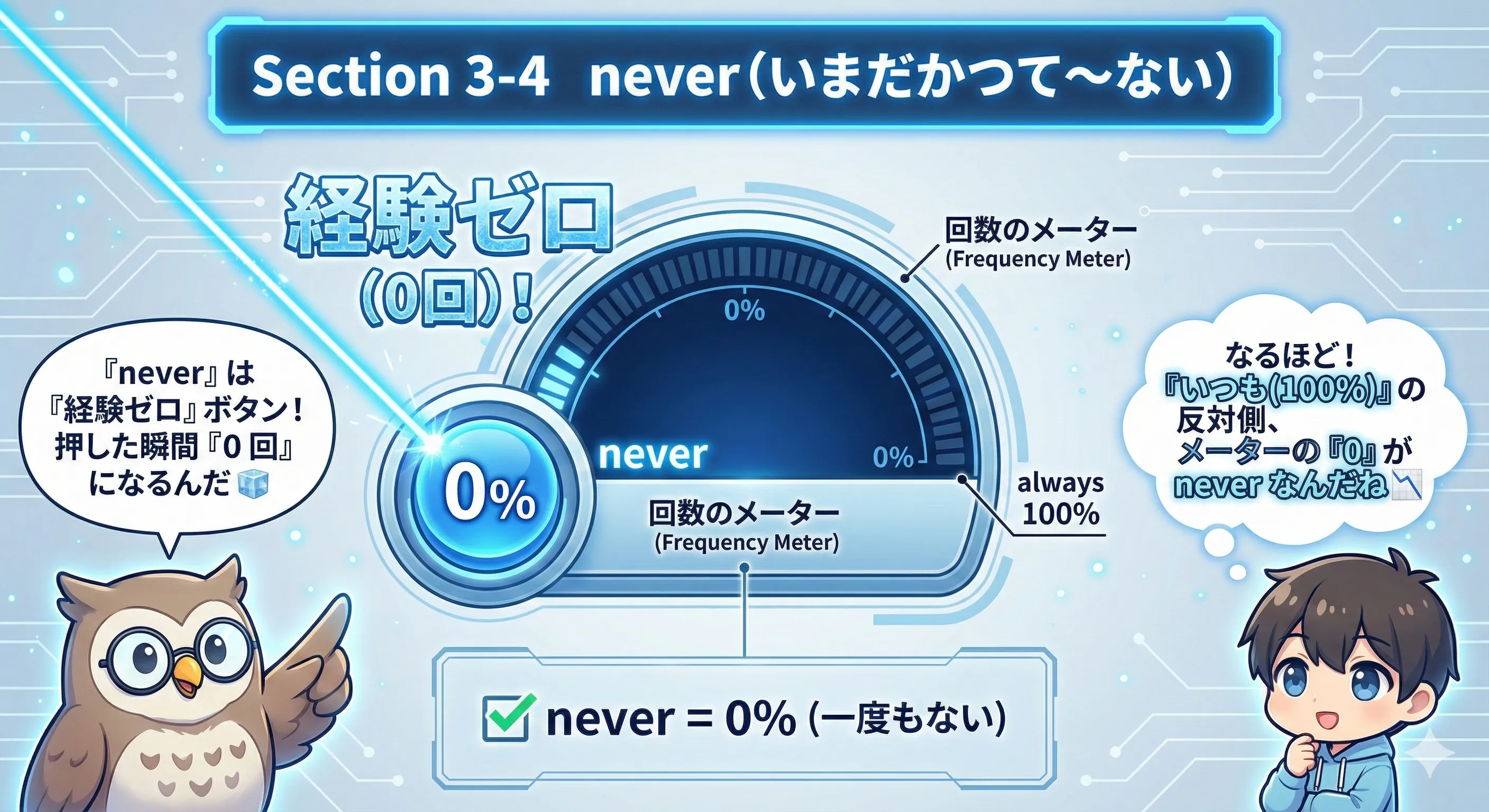
「いつも(100%)」の反対側にあるのが
never です📉
🔘 3-4-0. never は「経験ゼロ」ボタン(0%)
never は、簡単に言うと
「1回もない」
という意味です。
🧒(やさしい言いかえ)「ゼロ回」「いちども」「ぜったい〜ない(強め)」
🧠 英語は「否定を早めに出す」ことが多いので、never があると
聞いた瞬間に「NOだな」と分かります。
「回数のメーター」で考えると、never はいちばん左(ゼロ)です📉
💬 例文で感覚をつかもう!(never = 0%)
I never lie.
(私は決してうそをつきません。)
✅ never があるだけで「0回=否定」が一瞬で伝わります。
She never eats breakfast.
(彼女は朝ごはんを食べません。)
✅ 「0回」なので、“たまに食べる” ではなく “食べない” になります。
We never forget our friends.
(私たちは友だちのことを決して忘れません。)
✅ 「強い否定」なので、気持ちの強さ(決意)も出せます💪
📍 3-4-1. 基本の置き場所:never はどこに置く?(位置ルール)
never の置き場所は、だいたい
「助け役(be/助動詞)の近く」
か
「一般動詞の前」
です😊
🧒(やさしい言いかえ)「助け役=文を助ける動詞(be や can/will など)」
まずは下の表だけ覚えればOK!
| パターン | never の位置 | 例(イメージ) |
|---|---|---|
🧩be 動詞
|
be + never |
例: He is never late.
|
| 🛠️助動詞(can/will/should など) | 助動詞 + never |
例: I will never give up.
|
| 🏃一般動詞(eat/like/play など) | never + 動詞 |
例: They never complain.
|
次は例文で「置き場所」を体にしみこませましょう!
💬 例文で位置ルールを固めよう!(タイプ別)
He is never late.
(彼は遅刻しません。)
✅ is の後ろに never を置く(be の後)。
I will never give up.
(私は決してあきらめません。)
✅ will の後ろに never(助動詞の後)。
They never complain.
(彼らは文句を言いません。)
✅ 一般動詞の前に never(do は不要)。
She can never understand it.
(彼女はそれを決して理解できません。)
✅ can の後ろに never。できる可能性が 0% みたいな強さも出せます🧊
🧭 3-4-2. 定番:have never + 過去分詞(経験ゼロを言う)
have never + 過去分詞 は、
「今まで一度も〜したことがない」
と言いたいときの超定番です🧊
🧒(やさしい言いかえ)「今日までの人生で、0回」
✅ ポイント:never は have / has の
すぐ後ろに置くことが多いです。
例:I have never seen it.
(私はそれを見たことが一度もない)
💬 例文で感覚をつかもう!(have never + p.p.)
I have never been to Kyoto.
(私は京都に行ったことが一度もありません。)
✅ 「今までの人生で0回」。been to は「行ったことがある」の言い方です。
She has never seen snow.
(彼女は雪を見たことが一度もありません。)
✅ 主語が she なので has。never はその直後!
We have never heard that story.
(私たちはその話を聞いたことが一度もありません。)
✅ 「耳に入った経験がゼロ」。会話でもよく使います😊
🚫 3-4-3. 禁止の強調:Never + 命令文(強めの注意)
文の先頭に Never を置くと、
「絶対に〜するな」
のように強い禁止になります⚠️
🧒(やさしい言いかえ)「ぜったいダメ」「ぜったいしないで」
✅ 看板・注意書き・ルール説明などで出やすい形です。
Don’t + 動詞 は「しないで(普通)」、
Never + 動詞 は「絶対しないで(強め)」です。
💬 例文で覚えよう!(Never + 命令文)
Never touch this button.
(このボタンは絶対に触らないで。)
✅ 先頭の Never が「強い禁止」の合図です。
Never leave the door open.
(ドアを開けっぱなしにしないで。)
✅ leave A B は「AをBのままにする」=「開けっぱなし」みたいに言えます。
Never tell anyone my password.
(私のパスワードを誰にも言わないで。)
✅ ネットの安全でもよく出る考え方です🔐
⚡ 3-4-4. 文頭に置くと倒置:Never have I…(かっこいい強調)
never を文の先頭に置くと、強調のために
語順が入れ替わる
ことがあります。これを
倒置(語順チェンジ)
と言います⚡
🧒(やさしい言いかえ)「ふつうの順番を、強調のために入れかえる」
✅ 合言葉:Never + 助け役(助動詞 / have など) + 主語
例:
I have
never
seen it.
(私はそれを見たことが一度もない)
強調:
Never have I
seen it.
(今までそれを見たことが一度もない)
文頭に
Never が来たら、
「次に助け役(have / will / can / did など)が来る」
と身構えるとミスが減ります😊
💬 例文で“倒置”の形を体で覚えよう!
Never have I seen such a beautiful view.
(こんなに美しい景色を見たことが一度もありません。)
✅ have が先に来るのが倒置!「すごすぎて強調したい」感じに合います✨
Never had I met him before.
(私はそれまで彼に会ったことが一度もありませんでした。)
✅ 「その時点より前はゼロ」を強調。had が前に出ます。
Never will I forget this day.
(私はこの日を決して忘れません。)
✅ 強い決意を「かっこよく」言える形です💪
🔥 3-4-5. 強調ブースト:never ever / never again / never before(ゼロ感MAX)
never だけでも強いですが、
よく一緒に使われる言い方を覚えると
「ゼロ感」
がさらに強くなります🔥
🧒(やさしい言いかえ)「ぜったい」「二度と」「これまで」
✅ まずはこの3つ:never ever / never again / never before
「絶対に〜しない」
(気持ちが強い)
「二度と〜しない」
(もう繰り返さない)
「これまで一度も〜ない」
(今までの記録)
「ゼロ」だけじゃなく、「二度と」や「絶対に」まで言えるようになります!
💬 例文で “ブースト表現” を覚えよう!
I will never ever do that again.
(私は二度と絶対にそれをしません。)
✅ never を二重に強める感じで、気持ちが強いときに出ます🔥
Never again will I trust him.
(私は二度と彼を信じません。)
✅ 文頭に出すと強調+倒置。ドラマっぽい強さが出ます⚡
I have never seen it before.
(私はそれをこれまで見たことが一度もありません。)
✅ before を添えると「これまで」の感じがハッキリします📌
🔁 3-4-6. 書き換えで理解:never = not ever(ever との関係も)
never は、ざっくり言うと
not ever(今まで一度も〜ない)
と同じ方向の意味です。
🧒(やさしい言いかえ)ever は「今までに(経験として)」みたいな言葉。
そこに not がつくと「今までに一度も…ない」になります。
✅ 覚え方:
ever(経験ボタン)を
not(OFF)にしたのが
never です🔌
よく見る形 Have you ever ...?
✅ ever は疑問文で「今までに〜したことある?」で超よく登場します。
だから never を学ぶと、会話の理解が一気に進みます😊
💬 例文で「never ⇄ not ever」を確認しよう!
I have never seen it.
(私はそれを見たことが一度もありません。)
🔁 書き換え:
I have not ever seen it. (意味はほぼ同じ)
Have you ever tried sushi?
(今までにお寿司を食べたことはありますか?)
No, I have never tried it.
(いいえ、食べたことが一度もありません。)
✅ ever(経験ある?)→ never(経験ゼロ) の流れ、会話で超使えます🍣
I will not ever say that again.
(私はそれを二度と言いません。)
✅ 実際は never の方が自然なことが多いですが、仕組み理解に役立ちます。
🧯 3-4-7. よくあるミス3つ(事故防止・超短く)
never 自体が否定なので、not を重ねると不自然になりがち。
× I don't never ...
○ I never ...
基本は 助け役の後ろ に置く(have / be / can の後ろ)。
○ has never / is never / can never
文頭に Never を置いたら、次に
助け役が前へ。
○
Never have I ...
🧠 ミニまとめ:合言葉1つ(never = 0%)
今日の合言葉はこれ!
never = 0%(経験ゼロ)
✅ 位置の基本:助け役の後ろ
(have never / is never / can never)
✅ 文頭なら山場:倒置
(Never have I ...)⚡
never が分かると、「ゼロ」表現の理解が一段上がります。 このまま勢いで次へ行きましょう😊
3-5. little + 動詞(文語:まったく~しない)
little は「少し」のイメージが強いですが、このセクションでは
“ほぼゼロ(ほとんど〜ない)” を作る文語表現として登場します🧊
ポイントは2つ:
① 動詞の前に置く/
② 文頭に出ると倒置(語順チェンジ)
の入口になります。
(やさしい言いかえ:little なのに「ぜんぜん〜ない」になることがある)
全否定 文語(かたい表現) Lesson 112 / Section 3-5🖼️ イメージでつかむ:little は「少し」じゃなくて “ほぼゼロ” の合図

✅ little(文語)= almost not(ほとんど〜ない)
🧒(やさしい言いかえ)「ちょっと」じゃなくて「ほぼゼロ」って思うと事故りません😊
🧊 3-5-0. 導入:little は「少し」じゃなくて“ほぼゼロ”の合図(文語)
ふつうの little は「少し」ですが、
このセクションの little は
否定寄り(ほとんど〜ない / まったく〜ない)
になります。
🧒(やさしい言いかえ)「little って書いてあるのに、意味は “ぜんぜん” になることがある!」
📌 かたい文章・物語・スピーチで見かけやすい表現です。
「0に近い」感じだと思えばOKです😊
💬 まずは“意味が否定になる”感覚をつかもう!
I little expected this.
(こんなことになるなんて、思ってもみませんでした。)
✅ little expected は「少し予想した」ではなく、
「ほとんど(=全然)予想しなかった」のイメージです。
She little knew the truth.
(彼女は真実をまったく知りませんでした。)
✅ 「知っていた」っぽく見えるけど、 “知っていなかった(ほぼゼロ)”がポイントです。
They little imagined the cost.
(彼らはその費用をほとんど想像していませんでした。)
✅ little imagined = 想像がほぼゼロ。
🧩 3-5-1. 基本形:主語 + little + 動詞(= almost not)
いちばん基本はこれです👇
主語 + little + 動詞
(やさしい言いかえ:その動作を “ほとんどしない”)
「little を 動詞の前 に置く」と覚えるとスッキリします😊
✅ ありがちな勘違い:
× little = 少し(この用法では違う!)
○ little(文語)= ほぼゼロ(ほとんど〜ない)
📌 よく組む動詞:
know, realize, expect, imagine, suspect, care
など
💬 例文で「S + little + V」を固めよう!
I little knew what was coming.
(この先どうなるか、私はまったく知りませんでした。)
✅ little knew =「知っていた」ではなく、
ほとんど(=全然)知らなかった。
He little cares about fame.
(彼は名声を全然気にしません。)
✅ かたい言い方ですが、「全然気にしない」をキュッと表せます。
We little realized the danger.
(私たちはその危険にほとんど気づいていませんでした。)
✅ little realized は「気づきがほぼゼロ」。
“危険をナメてた”ニュアンスにもつながります。
⚡ 3-5-2. 文頭に出ると倒置:Little did I know ...(山場)
little が 文の先頭 に出ると、
「強い否定(ほぼゼロ)」をドーン!と強調するために
倒置(語順チェンジ)が起こります。
🧒(やさしい言いかえ)「びっくりさせる言い方」だから、順番が入れ替わるイメージです。
✅ 基本の“並び替え”はこれ👇
| 倒置なし(ふつうの語順) | 倒置あり(文頭 little) |
|---|---|
I
little
knew ...
|
Little
did
I
know ...
|
| (私はほとんど知らなかった…) | (私は夢にも思わなかった…) |
📌 コツ:助け役(do/does/did) が前に出ると、
動詞は原形 に戻ります(knew → know)。
「完璧に理解してから」じゃなくて大丈夫!
“あ、こう並ぶんだ!” と気づけた時点で、もう前進しています😊
💬 例文で倒置の感覚をつかもう!(3つ)
Little did I know that she was listening.
(彼女が聞いているなんて、夢にも思いませんでした。)
✅ Little を文頭に置いて「まったく知らなかった」を強調しています。
Little did we realize how serious it was.
(それがどれほど深刻か、私たちは全く気づいていませんでした。)
✅ realize(気づく)が原形のままなのは、did が助け役だからです。
Little does he know what I’m planning.
(彼は私の計画をまったく知りません。)
✅ 現在の話なら does。でも動詞はやっぱり know(原形)です。
📌 3-5-3. よくセットで出る動詞まとめ(頻出リスト)
little は「どんな動詞でもOK」というより、
“心の動き・気づき・予想”系の動詞 と相性がよいです。
🧒(やさしい言いかえ)「頭の中で起きること(知る・気づく・思う)」が “ほぼゼロ” の感じ。
-
🧠
know(知る) /realize(気づく) -
🔮
expect(予想する) /imagine(想像する) -
🕵️
suspect(うすうす思う) /believe(信じる)
-
💭
think(思う) /dream(夢にも思う) -
🧭
understand(理解する) /notice(気づく) -
😐
care(気にする) /mind(気にする)
「気づき・予想・理解」が “ほぼゼロ” のときに
little を使うとハマります✨
💬 例文で「頻出動詞」をまとめて確認!(3つ)
I little expected an apology.
(謝ってくるなんて、思ってもみませんでした。)
✅ 「予想がほぼゼロ」= little expected
She little realized the mistake.
(彼女はそのミスにまったく気づいていませんでした。)
✅ 「気づきがほぼゼロ」= little realized
They little suspected the truth.
(彼らは真実を少しも疑っていませんでした。)
✅ suspect は「うすうす思う」。それが “ほぼゼロ” = little suspected
🔁 3-5-4. 書き換えで理解:little = hardly / scarcely / almost not
ここでの little は「少し」ではなく、
“ほぼゼロ(ほとんど〜ない)” の意味でしたね🧊
だから、次の表現にだいたい置き換えできます。
🧒(やさしい言いかえ)「ゼロに近い」を言う仲間がほかにもいるよ!
| 表現 | ニュアンス | ミニ例(英文 → 日本語訳) |
|---|---|---|
| little |
文語っぽい・かたい (文章で映える) |
He little cared.(彼はほとんど気にしなかった。) |
| hardly |
ほとんど〜ない(会話でもOK) (ゼロに近い) |
He hardly cared.(彼はほとんど気にしなかった。) |
| scarcely |
ほとんど〜ない(少しかため) (わずかに、の反対寄り) |
He scarcely cared.(彼はほとんど気にしなかった。) |
| almost not |
意味が直球で分かりやすい (説明用に便利) |
He almost didn’t care.(彼はほとんど気にしなかった。) |
little(文語) は、 hardly / scarcely と同じ仲間。
「意味は同じ」でも、雰囲気(かたい/ふつう)が少し違います😊
💬 例文で“書き換え感”を体で覚える!(3つ)
I little understood his point.
(私は彼の言いたいことがほとんど分かりませんでした。)
✅ だいたい同じ:I hardly understood his point.
(ほとんど分からなかった)
She hardly noticed the change.
(彼女はその変化にほとんど気づきませんでした。)
✅ 文語っぽく:She little noticed the change.
(ほとんど気づかなかった)
We scarcely believed the news.
(私たちはそのニュースをほとんど信じられませんでした。)
✅ 意味の直球:We almost didn’t believe the news.
(ほとんど信じなかった)
🧯 3-5-5. よくあるミス3つ(事故防止・超短く)
-
❌ 1) little を「少し」と直訳してしまう
→ この用法は almost not(ほぼゼロ) です。 -
❌ 2) 文頭 little の倒置で、動詞を原形に戻し忘れる
→Little did Iのときはknewではなくknow。 -
❌ 3) “少ししか〜ない” の little(名詞の量)と混ぜる
→a little water(少しの水)と、little knew(ほとんど知らなかった)は別モノです。
🧠 3-5-6. ミニまとめ:合言葉1つ(little = almost zero)
✅ 合言葉:
little(文語)= almost zero(ほぼゼロ)
「少し」じゃなくて「ほぼゼロ」!
文頭に出たら 倒置 もセットで思い出せれば完璧です😊
not ... at all / by no means など、会話にも出る“強い否定の型”をまとめていきます。
3-6. 全否定の慣用表現(not ... at all など)
not だけでも否定は作れますが、
「全然〜ない」「決して〜ない」みたいに
“ゼロ感”を強くしたいときは、よく使われる 慣用表現(決まり文句)を足すと一気に自然になります😊
ここではまず、代表的な型を「ざっくり地図」でつかみます。
(むずかしい言葉=よく決まって出る形、のこと)
どれも「否定をブーストする部品」だと思うと覚えやすいです🚀
🎨 イメージでつかむ:否定ブースターの全体図
「not にパーツを足すと、否定がもっと強くなる」イメージを図で確認しましょう。
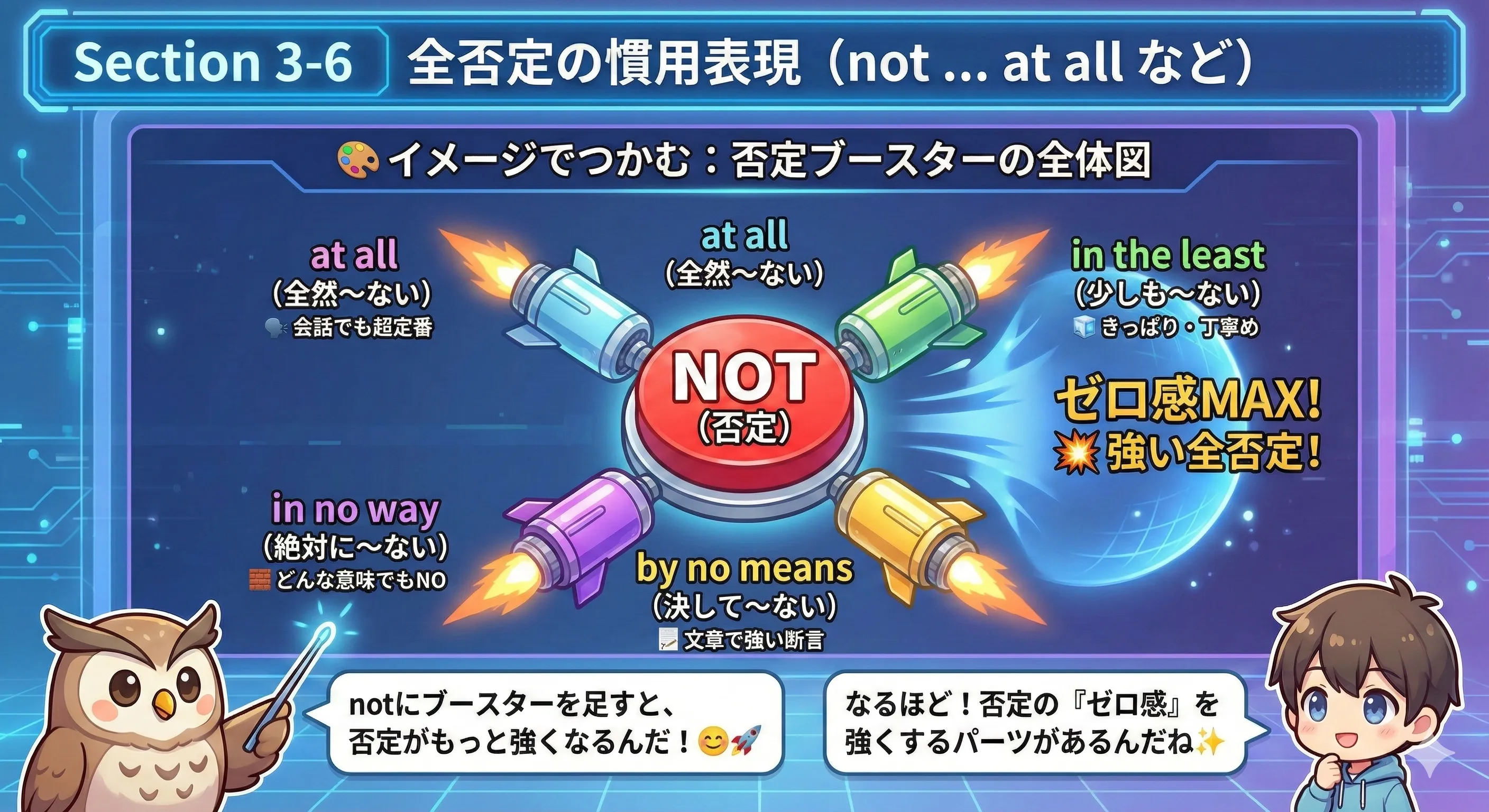
not(否定)+ブースター(強調パーツ) = 「ゼロ感が強い否定」 になります!
🚀 3-6-0. 導入:全否定の慣用表現は「否定のブースター」
まずは超シンプルに言うと、「否定(not)をもっと強くする部品」です。
(慣用表現=よくセットで使われる決まり文句)
たとえば not に
at all を足すと、
「全然〜ない」にパワーアップします✨
| ブースター | 強さ・雰囲気 | 意味(やさしい言いかえ) |
|---|---|---|
| at all |
会話でも超定番 🗣 (ふつうに使える) |
「全然」「まったく」 (1ミリも、の感じ) |
| in the least |
きっぱり・少し硬め 🧊 (丁寧な強さ) |
「少しも〜ない」 (“ひとつぶ分もない”) |
| by no means |
文章で強い断言 🧾 (決して〜ない) |
「絶対に」「決して」 (“たぶん”じゃない!) |
あとは 「どれを足すと、どのくらい強い?」 を例文で体に入れるだけ😊
💬 例文で“ブースト感”をつかもう!(3つ)
I don’t understand it at all.
(私はそれが全然分かりません。)
🔍 not に at all を足して「ゼロ感」を強化!
She isn’t worried in the least.
(彼女は少しも心配していません。)
🧒(言いかえ)「ひとつぶ分も心配がない」=ゼロ!
This is by no means easy.
(これは決して簡単ではありません。)
⚠️ 「たぶん」ではなく、強い否定の断言です。
✨ 3-6-1. 超定番:not ... at all(全然〜ない)
not だけでも否定はできますが、
「全然〜ない」を言いたいなら
at all を足すのが鉄板です😊
(やさしい言いかえ)at all=「1ミリも」「少しでも(→それすらない)」
📍 置き場所のコツ
基本は 文の後ろに置いて、否定をブーストします。
- not(否定)+ at all(全然)で ゼロ感
-
会話でよく使う:
I don’t ~ at all. - ※疑問文でも使えます(例:Do you like it at all?)
🧠 覚え方(超短い合言葉)
not + at all = 「全然〜ない」
「at all=少しでも?」→ 否定と組むと「少しでも…ない」=全然ない、になります✨
I don’t like it at all. は、強い否定だけど自然で言いやすい型です。
💬 例文で「not ... at all」を固める!
I don’t like it at all.
(私はそれが全然好きじゃありません。)
🔍 強調:at all が「ゼロ感」を作る!
He didn’t help me at all.
(彼は私をまったく助けてくれませんでした。)
✅ didn't の否定に at all を足して「ゼロ」を強調。
She isn’t nervous at all.
(彼女は全然緊張していません。)
💡 isn't(否定)+ at all(全然)でセット暗記!
Don’t worry at all.
(全然心配しないでください。)
🗣 会話でよく使う「安心させる」言い方です。
🧊 3-6-2. もう一段強め:not ... in the least / not ... a bit(少しも〜ない)
「少しも〜ない」を言いたいときに便利なのが
in the least
と
a bit です。
(やさしい言いかえ)in the least=「ひとつぶ分も」/a bit=「ちょっと」→ not a bit=「ちょっとも〜ない」
🧊 in the least(少しも)
きっぱり・丁寧めの「少しも〜ない」。説明文や落ち着いた会話でよく合います。
-
形:
not ...+ in the least - イメージ:1ミリも/ひとつぶ分も
🧊 not a bit(ちょっとも)
a bit(ちょっと)を否定して「ちょっとも〜ない」にする形です。
会話でも使えます😊
-
形:
not ...+ a bit - イメージ:「ちょっと」すら無い=ゼロ
a bit は「ちょっと」。 だから not a bit は「ちょっとも〜ない」。
(
not a little は逆に「かなり」になりやすいので、別セクションで扱うのが安全です)
💬 例文で「少しも〜ない」を固める!
I’m not worried in the least.
(私は少しも心配していません。)
✅ 「不安ゼロ」を落ち着いて言える形です。
He doesn’t care in the least.
(彼は少しも気にしません。)
💡 don't/doesn't にも自然にくっつきます。
I’m not tired a bit.
(私はちょっとも疲れていません。)
🗣 「大丈夫、全然平気」系のニュアンスにも使えます。
She wasn’t surprised a bit.
(彼女はちょっとも驚きませんでした。)
✅ wasn't にも相性◎(状態の全否定)。
🧾 3-6-3. 文章で強い:by no means / not by any means(決して〜ない)
「決して〜ない」を、
ちょっと文章っぽく・きっぱり言いたいときに便利なのが
by no means です。
(やさしい言いかえ)「どんな手段でもムリ」→「だから絶対にNO」=決して〜ない
📌 by no means(決して〜ない)
強い否定の断言。説明・意見・レビューなどでよく出ます。
- 形:
be / do / 助動詞の文に入れて強い否定 - キーワード: 決して (「たぶん」ではない)
📌 not by any means(決して〜ない)
any means(どんな方法でも)を否定して、意味はほぼ同じです。
- 形:
not+by any means - 文章でも会話でもOK(少し硬め)
by no means は 「ほぼ〜ない」ではなく「決して〜ない」です。
強い断言なので、言うときは「本当にそう思う?」を一度だけ確認すると安全です😊
💬 例文で「決して〜ない」を固める!
This is by no means easy.
(これは決して簡単ではありません。)
✅ 文章の「きっぱり否定」にぴったり。
It is by no means the best option.
(それは決して最善の選択肢ではありません。)
🔍 「最善ではない」と強めに言いたいときの型。
He is not by any means lazy.
(彼は決して怠け者ではありません。)
✅ 誤解をはっきり否定する場面で便利です。
By no means will I give up.
(私は決してあきらめません。)
⚡ 文頭に置くと「強調」になり、語順が変わることがあります(ここは“おまけ”でOK)。
🧱 3-6-4. 「どんな意味でもNO」:in no way / not in any way(絶対に〜ない)
in no way は
「どんな意味でも/どんな方法でも〜ない」という、かなり強い否定です。
似た形に not ... in any way もあり、意味はほぼ同じです。
(やさしい言いかえ)“0%の可能性”=絶対にNO
🧱 in no way(絶対に〜ない)
文章・説明で「強めに否定」したいときに便利。硬めだけど超パワフル。
-
形:
S + V ...+ in no way - イメージ:「どの方向から見てもNO」
🧱 not ... in any way(どんな意味でも〜ない)
any way(どんなやり方でも)を not で否定する形。
会話にも入れやすいです。
-
形:
not+ in any way - イメージ:「一切、関係ない/影響しない」
「ただの否定」より強くしたいときに in no way を使うと、 “絶対にNO” の空気が出ます。
ただし強い表現なので、言い過ぎになりそうなら not really などに弱める選択もアリです😊
💬 例文で「どんな意味でもNO」を固める!
This is in no way the same.
(これは決して同じものではありません。)
✅ 「同じと言うのは無理!」を強く否定。
It does not affect you in any way.
(それはあなたにどんな意味でも影響しません。)
💡 “影響ゼロ”をはっきり言える形。
He is in no way responsible for it.
(彼はそのことにまったく責任がありません。)
✅ 「責任ゼロ」を強く表現できます。
🧊 3-6-5. 名詞の「ゼロ感MAX」:no ... whatever(少しも〜ない)
no に whatever(どんな〜でも)をくっつけると、
「少しも〜ない/いっさい〜ない」のパワーが一気に上がります。
(やさしい言いかえ)“どんな種類の〜でもゼロ”=ゼロ感MAX
📌 形のイメージ
no + 名詞 +
whatever
(=「どんな名詞でもゼロ」)
例:no idea whatever / no reason whatever / no difference whatever
「本当にゼロ!」と強く言いたいときに便利です。
ただし強めなので、ふだんの会話では no ... at all の方がやわらかいこともあります😊
💬 例文で「名詞ゼロ」を固める!
I have no worries whatever.
(私は少しも心配がありません。)
✅ “worries” を「種類問わずゼロ」にして強調。
There is no reason whatever to panic.
(パニックになる理由はまったくありません。)
💡 「理由がゼロ」をキッパリ表現。
It makes no difference whatever.
(それはまったく違いになりません。)
✅ 「違いゼロ」=どっちでも同じ、を強調できます。
🧠 3-6-6. ミニまとめ:強い否定の選び方(合言葉)+ 事故防止3つ🧯
「目的で選ぶ:日常=at all/硬め=by no means/ゼロ断言=in no way」
ここまで読めたあなたは、もう準備はバッチリです😊
🎯 使い分け早見(ざっくりでOK)
| 表現 | ニュアンス | おすすめ場面 |
|---|---|---|
✨not ... at all
|
全然〜ない | 会話・日常の否定の基本 |
🧊not ... in the least / not ... a bit
|
少しも〜ない | 「不安ゼロ」を丁寧に言いたい |
🧾by no means / not by any means
|
決して〜ない | 文章・説明で強く否定 |
🧱in no way / not ... in any way
|
どんな意味でもNO | 責任/影響/同一性を強く否定 |
🧊no ... whatever
|
名詞ゼロ感MAX | 理由/心配/違いなどを「種類問わずゼロ」 |
-
強さに注意:
by no means/in no wayは強い断言。言い切りすぎ注意。 -
whatever は名詞にくっつける:
no reason whateverのように「名詞ゼロ」を強調するイメージ。 -
迷ったら at all:
日常会話ではまず
not ... at allが安全で自然😊
4. 部分否定の使い分け(まずは全体像)
このセクションでは、
部分否定(「ぜんぶじゃない」とやさしく言う否定)を
まとめてつかみます😊
たとえば not all / not always / not necessarily / not completely / not both など。
強く言い切りすぎないことで、英語がぐっと自然になります。
ここでは詳しい説明に入る前に、「まずはざっくりイメージをつかむ」ことを目標にしましょう。
ポイントは「どこを弱めるか」です💡
(量=どれくらいの数/頻度=どれくらいよく/程度=どれくらいのレベル/組み合わせ=セットで言い切るか)
を、英語では all / always / completely / both などで表すので、
そこに not を上手に乗せていきます。
🖼️ 図でつかむ:部分否定(「全部が全部〜とは限らない」)
not が all / always / completely / both など
「100%っぽい言葉」にかかると、意味が
“100%じゃない”に変わります😊
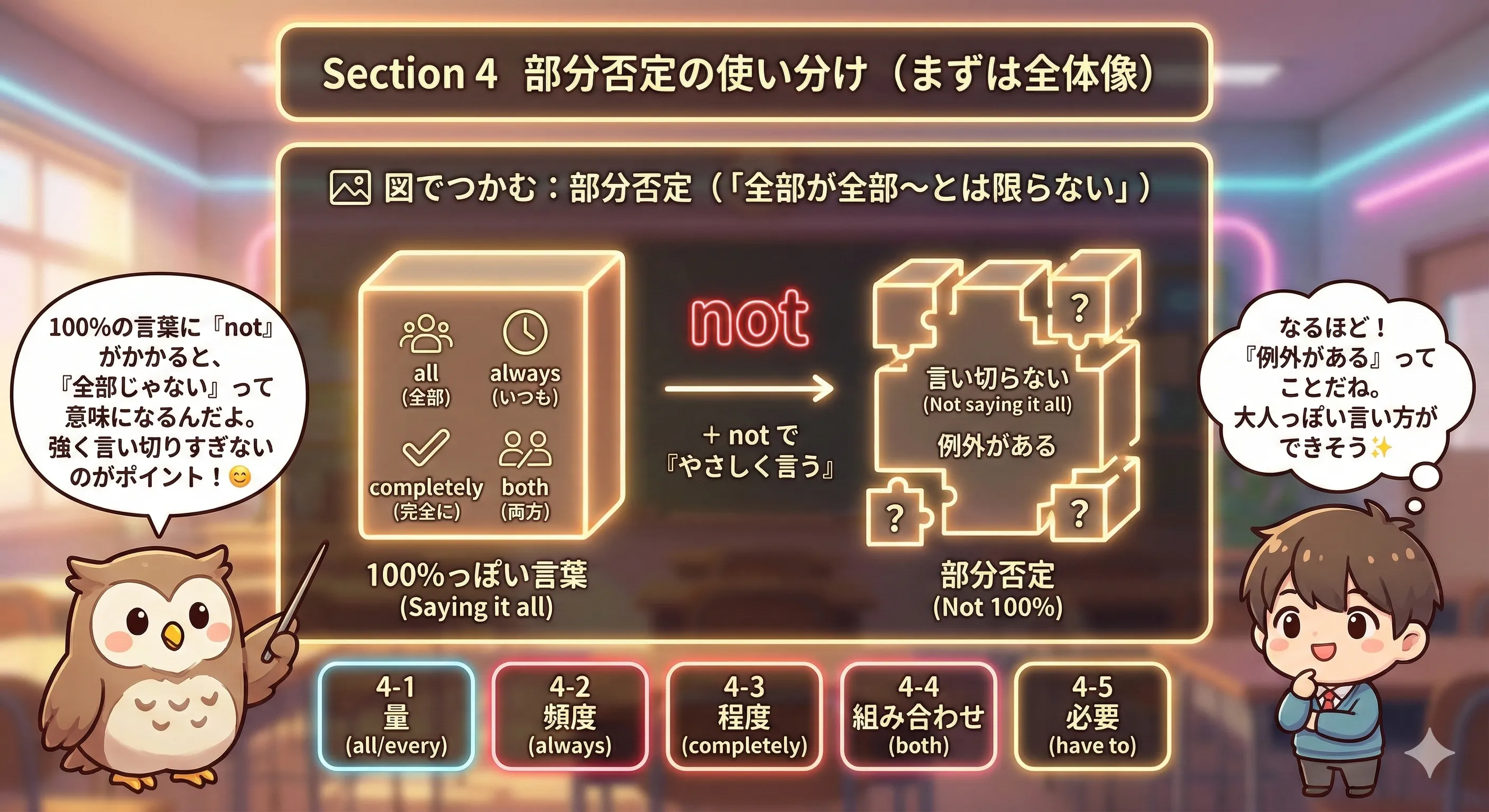
💡 この図は「細かい文法」よりも、まず “ニュアンスの方向”をつかむためのものです。
🧭 次はどこから読む? 4-1 ~ 4-5 へのナビゲーション
部分否定は「どれを否定するか」で型が分かれます。
先に気になるものから読んでOKです😊
「全部(量)」「いつも(頻度)」「完全に(程度)」「両方(セット)」「必要(義務)」のどれが引っかかるかで選びましょう。
not の後ろに
何が来ているかを見るだけで、
「どのタイプの部分否定か」が見分けやすくなります✨
🍬 ミニで味見:部分否定ってこういう感じ(まずは3つ)
Not all customers like spicy food.
(お客さんがみんな辛い食べ物が好き、というわけではありません。)
She is not always on time.
(彼女がいつも時間通り、とは限りません。)
The report is not completely accurate.
(その報告書が完全に正確、というわけではありません。)
🗺️ 4-1 ~ 4-5:どの「言い切らない」を身につける?
人は「完璧に分かってから始める」よりも、 「だいたい分かった状態でまず動いてみる」 方が、記憶に残りやすく学習が続きやすいと言われます。
まずは各セクションで “型” を1つずつ回収していきましょう😊
ここまで読めたあなたは、もう準備はバッチリです✨
部分否定は「言い切らない」だけなので、型さえ見えれば一気にラクになります。次は気になる番号からどうぞ!
4-1. Not all / Not every / Not everyone(「全部」を言い切らない)
このセクションでは、
all(全部)や every(全部の〜)、everyone(みんな)みたいな
「100%ワード」を、
not でやさしく弱めて
「全部が全部〜とは限らない」を作るコツを学びます😊
強く言い切りすぎないので、会話でも文章でも 大人っぽく自然 に聞こえます。
ここではまず「見た瞬間に意味がわかる」ことを目標にしましょう。
※ 部分否定(ぶぶんひてい)=「全部をゼロにしない否定」→ (つまり「例外があるよ」という言い方)
🧭 図でつかむ:「not + 100%ワード」= “100%じゃない”

「ゼロ」ではなく「全部ではない」なので、やさしく正確な言い方になります。
🚥 4-1-0 導入:「Not + 100%ワード」は “100%じゃない” の合図
まずはここだけ押さえればOKです😊
not の後ろに all / every / everyone が来たら、
「全部が全部〜じゃない」のサイン。
※ 合図(あいず)=「これが出たら、この意味!」と気づく目印のこと
not + 100%ワード → 「例外がある」(全部と言い切らない)
Not all students learn at the same pace.
(生徒がみんな同じペースで学ぶわけではありません。)
✅ 「全員同じ」とは言っていない → 例外ありの言い方
Not every email needs an immediate reply.
(すべてのメールに、すぐ返信が必要とは限りません。)
✅ 「どれもこれも全部」ではない → 一部は違うの合図
Not everyone agrees with this idea.
(この考えに賛成する人ばかりではありません。)
🧩 4-1-1 Not all + 複数名詞:全体の一部だけ否定
Not all + 複数名詞 は、
「全部がそうとは限らない」を作るいちばん基本の形です😊
つまり「ゼロじゃない」ので、言い方がやわらかく、しかも正確になります。
※ 複数名詞= students / emails / customers みたいに “-s” が付く名詞
✅ もっと自然に:「全部が全部〜とは限らない」
Not all = “一部は当てはまらない” です。
「ひとつも当てはまらない(ゼロ)」と言いたいなら、別の言い方(例:
none)になります。
Not all mistakes are bad.
(間違いが全部悪いわけではありません。)
✅ 「間違い=全部悪い」と言い切らない → 気持ちもやさしい言い方
Not all emails require a reply.
(すべてのメールが返信を必要とするわけではありません。)
Not all students learn in the same way.
(生徒がみんな同じやり方で学ぶわけではありません。)
✅ 「例外がある」= 現実に合った言い方
Not all information online is accurate.
(ネット上の情報が全部正確とは限りません。)
Not all を見たら 「一部は違う」が頭に浮かべばOK!
ここまで読めたあなたは、もう準備はバッチリです✨ 次は 4-2(Not every)へ進んでも、4-1の続きで固めても大丈夫😊
🧠 4-1-2 Not every + 単数名詞:『ひとつひとつ全部』を否定
every は「全部」というより、
「1つずつ全部(= どれもこれも)」のイメージです😊
だから Not every + 単数名詞 は、
「どれもこれも全部〜とは限らない」という “例外あり” の言い方になります。
※ 単数名詞= email / rule / day など(ふつう “-s” が付いていない形)
✅ ニュアンス: 「例外がある」(全部同じじゃないよ)
Not every + 単数名詞 は “1つずつ見ていく感じ” が出ます。
「全部まとめて」よりも、丁寧で自然に聞こえることが多いです😊
Not every day is sunny.
(毎日が晴れとは限りません。)
✅ “毎日ぜんぶ” を否定 → 例外の日がある
Not every email needs an immediate reply.
(すべてのメールに、すぐ返信が必要とは限りません。)
Not every rule makes sense.
(すべてのルールが納得できるとは限りません。)
✅ “どのルールも全部正しい”とは言わない → 現実に合う言い方
Not every + 単数名詞 は 「全部まとめて」じゃなく「1つずつ見たら例外がある」感じ。
だから、やさしくて大人っぽい言い方になります😊
👥 4-1-3 Not everyone + 動詞:『みんな(人)』を否定(動詞は単数)
everyone は「みんな」ですが、
文法的には 単数扱いです(=「みんな」を1つのまとまりとして見る感じ)😊
だから、動詞は is / has / agrees など
単数の形にします。
※ 単数扱い=「人数が多くても、文法では1人みたいに扱う」イメージ
✅ 形の注意: Not everyone is / has / agrees(動詞は単数)
everyone は複数っぽく見えるけど、動詞は単数です。
例:✅
Not everyone is ... / ✅ Not everyone agrees ...
Not everyone agrees with this plan.
(この計画に賛成する人ばかりではありません。)
✅ “全員賛成”ではない → 反対の人もいる
Not everyone is comfortable with silence.
(沈黙が平気な人ばかりではありません。)
Not everyone can work from home.
(在宅で働ける人ばかりではありません。)
✅ “みんなできる”と言い切らない → 現実的で伝わりやすい
Not everyone を見たら、 「みんながみんな〜じゃない」が浮かぶ。
さらに 動詞は単数(is / agrees / has)までセットで思い出せたら完璧です😊
📦 4-1-4 Not all of + the/these/my/them:『その中の全部』じゃない
of は、かんたんに言うと
「その中の」 という目印です😊
the / these / my などで
「どのグループか」をはっきりさせたいときに
Not all of ... がよく使われます。
※ “全体の中の一部だけ” を言いたいときに便利!
✅ たとえば:
Not all of the students / Not all of these answers
「クラスの中の生徒」「この中の答え」「私の友達」など、 範囲(グループ)を限定したいときに
of が活躍します😊
Not all of the tickets were sold.
(そのチケットが全部売れたわけではありません。)
✅ 「そのチケットの中で」全部ではない → 売れ残りもある
Not all of my friends live nearby.
(私の友達が全員近くに住んでいるわけではありません。)
Not all of these answers are correct.
(この答えが全部正しいわけではありません。)
✅ “この中で”全部じゃない → 間違いも混ざっている
Not all of them are coming today.
(彼らが全員今日来るわけではありません。)
✅ them=「その人たち」→ その中の全部ではない
⚠️ 4-1-5 間違えやすいポイント:Not all と None / All…not の注意
ここは “間違い防止コーナー” です😊
Not all は「全部じゃない」ですが、
ゼロ(ひとつもない)ではありません。
さらに、All ... are not ... は誤解が起きやすいので、学習では
Not all をおすすめします。
🆚 A) Not all(全部じゃない)と None / No one(ゼロ)の違い
Not all seats are taken.
(席が全部埋まっているわけではありません。)
None of the seats are taken.
(席はひとつも埋まっていません。)
Not all = 一部は違う / None = ひとつもない (意味がぜんぜん別物です!)
🚧
B) All ... are not ... は誤解されやすい → 学習では Not all 推奨
All seats are not taken. は、人によって
「全部埋まってない(= 一部空き)」とも「全部が埋まっていない(= ぜんぶ空き)」とも取られやすく、
誤解が起きやすいです。
だから、意味をハッキリさせたいときは Not all を使うのが安全です😊
Not all seats are taken.
(席が全部埋まっているわけではありません。)
All seats are not taken.
(※ 意味の取り方がブレやすいので、学習では避けるのがおすすめ)
部分否定は、「意味がハッキリ伝わる形」が正解!
迷ったら
Not all を使えば安全です😊
✅ 4-1 まとめ:Not all / Not every / Not everyone の地図
4-1 は、「100%ワードを not で弱める」だけでした😊
下の地図を見て、型と意味をセットで覚えればOKです。
| タイプ | 型(見た目の目印) | 意味(やさしい言い換え) |
|---|---|---|
| 🧩 量 |
Not all + 複数名詞例: Not all students
|
「全部じゃない」 一部は違う |
| 🧠 1つずつ |
Not every + 単数名詞例: Not every day
|
「どれもこれも全部〜とは限らない」 例外あり |
| 👥 人 |
Not everyone + 単数動詞例: Not everyone is
|
「みんながみんな〜じゃない」 動詞は単数 |
| 📦 範囲 |
Not all of + the/these/my/them例: Not all of these
|
「その中の全部じゃない」 “範囲あり” |
Not all を見たら「一部は違う」、 None を見たら「ゼロ」…と 瞬間で変換できれば完成です😊
ここまで読めたあなたは、もう準備はバッチリです✨
次は「頻度の部分否定」へ進むのもOK(
not always など)、
4-1 を例文で固めるのもOK。好きな順で進めましょう😊
4-2. not always / not necessarily(「いつも・必ず」を言い切らない)
always(いつも)や necessarily(必ず)みたいな
断定ワードを、
not で少し弱めると
「いつもそうとは限らない」/「必ずしもそうとは言えない」
が作れます😊
これができると、英語が やわらかくて大人っぽい印象になります。
ここではまず「意味の方向」をつかみ、次に形(型)を身につけましょう。
※ 断定(だんてい)=「ぜったいそう!」と強く言い切ること → (not を足すと、言い方がやさしくなります)
🖼️
図でつかむ:not で「いつも・必ず」を少し下げる
always(いつも=100%)や necessarily(必ず=絶対)を、
not で少しだけ下げると、
「例外があるよ」という意味になります😊
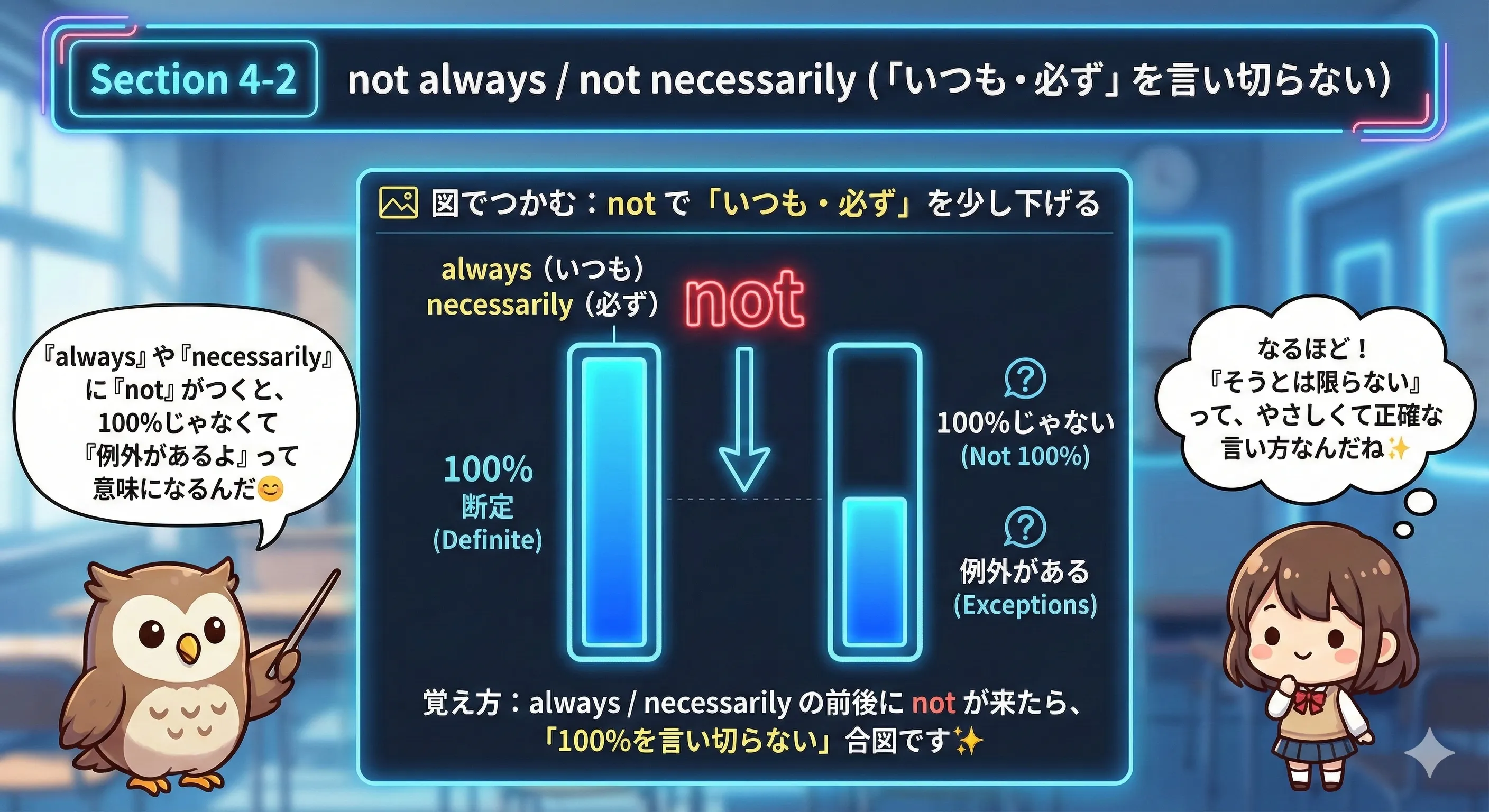
🔽 4-2-0 導入:not always / not necessarily は「断定を下げるスイッチ」
まずはイメージをつかみましょう😊
always(いつも)や necessarily(必ず)に not がつくと、
「100%じゃない」と言えるようになります。
つまり「例外がある」「そうとは限らない」という、やさしくて正確な言い方です✨
※ スイッチ=「意味を切り替える合図」というイメージ
not always =「ときどき違う」/ not necessarily =「必ずそうとは言えない」
This rule doesn’t always apply.
(このルールがいつも当てはまるとは限りません。)
That’s not necessarily true.
(それが必ず正しいとは限りません。)
He is not always polite.
(彼がいつも丁寧とは限りません。)
⏰ 4-2-1 not always:頻度を下げる「いつもじゃない」
not always は、ひとことで言うと
「ときどき違う」です😊
「ぜんぶ否定(ゼロ)」ではなく、
“たまに例外がある” というやさしい否定になります。
※ 頻度(ひんど)=「どれくらいよく起きるか」(毎回?ときどき?)
I don’t always ... / He is not always ... / You can’t always ...✅ 意味:「いつも〜というわけではない」
not always を見たら、 頭の中で sometimes not(ときどき〜ない)に置き換えるとスッと分かります😊
I don’t always have time to cook.
(私は料理する時間がいつもあるわけではありません。)
She doesn’t always reply right away.
(彼女がすぐ返信するとは限りません。)
The bus isn’t always on time.
(そのバスが時間通りとは限りません。)
You can’t always control everything.
(すべてをいつもコントロールできるわけではありません。)
not always を見たら 「ときどき違う」が出ればOK!
ここまで読めたあなたは、もう準備はバッチリです✨
🧩 4-2-2 not necessarily:必然・論理を下げる「必ずしも〜ではない」
not necessarily は、
「必ずそうとは言えない」という意味です😊
「いつもじゃない(頻度)」ではなく、
「そう決まるとは限らない(必然・論理)」を下げるのがポイント。
※ 必然(ひつぜん)=「そうなるのが当たり前」「絶対そうなる」という感じ
※ 論理(ろんり)=「AだからBだよね」と筋道で言うこと
✅ さらに自然:「だからといって〜とは限らない」
not necessarily を見たら、 「自動で決まるわけじゃない」と考えるとスッと分かります😊
That’s not necessarily true.
(それが必ず正しいとは限りません。)
Being busy doesn’t necessarily mean being productive.
(忙しいことが、生産的だという意味とは限りません。)
Expensive doesn’t necessarily mean good.
(高いことが、良いという意味とは限りません。)
It won’t necessarily be easy.
(必ず簡単とは限りません。)
not necessarily を見たら 「必ずそうとは言えない」が出ればOK!
「頻度」じゃなく「必然・論理」だと分かれば、もう勝ちです😊
🧭 4-2-3 使い分け:not always と not necessarily の選び方
迷ったら、ここだけ見ればOKです😊
not always は
「時間的に毎回?」= 頻度の話。
not necessarily は
「論理的に絶対?」= 必然の話です。
⏰ not always 頻度(いつも?)
「毎回」じゃない=ときどき違う😊
He is not always right.
(彼がいつも正しいとは限りません。)
This method doesn’t always work.
(この方法がいつも効くとは限りません。)
🧩 not necessarily 必然(必ず?)
「自動でそう決まる」わけじゃない=そうとは限らない😊
He isn’t necessarily right.
(彼が必ず正しいとは限りません。)
This method doesn’t necessarily work.
(この方法で必ずうまくいくとは限りません。)
「毎回?」なら not always。
「必ずそうなる?」なら not necessarily。
ここまで読めたあなたは、もう準備はバッチリです✨
🗣️ 4-2-4 会話で便利:やわらかい否定・反論の作法
英語では、相手を強く否定しすぎない方が
会話がスムーズです😊
そんなときに便利なのが
not necessarily(必ずしも〜ではない)と
not always(いつも〜とは限らない)です。
「NO!」ではなく、“例外があるよ”という言い方にできます。
Not necessarily. は「違う!」ではなく
「そうとも限らないよ」という “やさしい反論” です😊
Not necessarily. It depends.
(必ずしもそうとは限りません。場合によります。)
That’s not necessarily what I meant.
(それは私の言いたかったことと、必ずしも一致しません。)
I’m not always sure, but I’ll do my best.
(いつも確信があるわけではないですが、ベストを尽くします。)
It’s not necessarily a bad idea.
(それは必ずしも悪い考えではありません。)
強い否定よりも、 「例外がある」と言えると大人っぽい😊
⚠️ 4-2-5 つまずきポイント:形の注意・誤解を防ぐ
ここは “事故防止コーナー” です😊
not always と
not necessarily はどちらも便利ですが、
置き方や意味のズレで誤解が出ることがあります。
⏰ not always 置き方の注意
基本は “not always” をセットで覚えるのが安全です😊
意味がブレやすい形より、読み取りやすい形を優先しましょう。
He is not always kind.
(彼がいつも優しいとは限りません。)
He always is not kind.
(※ 読み手が混乱しやすいので、学習では避けるのがおすすめ)
🧩 not necessarily 意味の注意
not necessarily は「禁止」じゃありません。
「〜してはいけない」ではなく、“絶対とは言えない”の意味です😊
You don’t necessarily need to hurry.
(急ぐ必要が必ずあるわけではありません。)
You must not necessarily hurry.
(※ “must not” が強すぎて混乱しやすいので、学習では避けるのがおすすめ)
迷ったら 短くシンプルに。
✅
not always / ✅ not necessarily をそのまま使うのが安全です😊
🗺️ 4-2 まとめ(1分で戻れる地図)
4-2 はシンプルです😊
not always は「頻度(いつも?)」、
not necessarily は「必然(必ず?)」を弱めます。
迷ったら下の地図を見て、意味の方向を選びましょう✨
| 表現 | 何を弱める? | やさしい言い換え |
|---|---|---|
⏰
not always
|
頻度 「毎回かどうか」 |
「ときどき違う」 (=いつも〜とは限らない) |
🧩
not necessarily
|
必然・論理 「自動でそう決まるか」 |
「必ずそうとは言えない」 (=そうとは限らない) |
「毎回?」→ not always
「必ず?」→ not necessarily
ここまで読めたあなたは、もう準備はバッチリです✨
次は 4-3(
not completely / not entirely)へ進むのもOK、4-2の例文を声に出して固めるのもOK😊
4-3. not completely / not entirely / not totally(「完全に」を言い切らない)
completely / entirely / totally は
「100%」を言い切る言葉です😊
そこに not がつくと、
「100%じゃない(途中・一部・微妙)」という意味になります。
ここではまず “度合い(どあい=どれくらい?)” のイメージをつかんでから、形(型)を覚えましょう。
※ 度合い(どあい)=「どれくらい強い?どれくらい完璧?」というレベルのこと → (not を入れると、レベルが少し下がります)
🖼️
図でつかむ:not が「100%」を少し下げる
completely / entirely / totally は
「完璧(100%)」のメーターを上げる言葉。
そこに not がつくと、メーターが
100% → 100%未満 に切り替わります🎚️
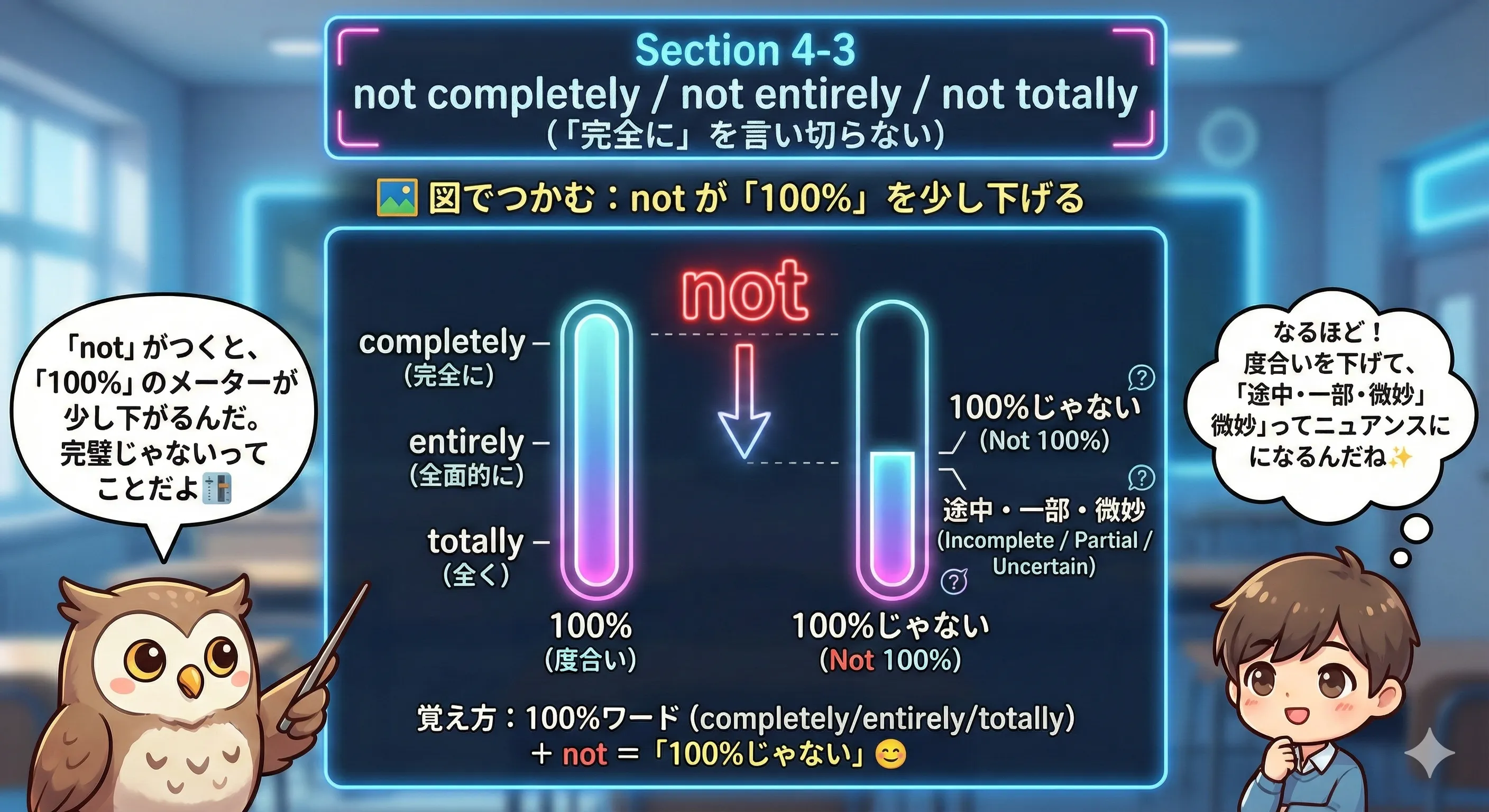
🎚️ 4-3-0 導入:not + 完全ワード は「100%じゃないよ」の合図
ここでのポイントはシンプルです😊
completely / entirely / totally は
「完全に(100%)」の合図。
それに not がつくと、
「0%」ではなく
「100%じゃない(少し足りない/一部は違う)」
になります。
※ “完全否定” ではなく “度合いを下げる否定” だと思うとスッキリします✨
not + 100%ワード = 「100%と言い切らない」 (=少し余地を残す)
I don’t completely understand.
(私は完全に理解しているわけではありません。)
I’m not entirely sure.
(私は完全に確信があるわけではありません。)
I’m not totally convinced.
(私は完全に納得しているわけではありません。)
✅ 4-3-1 not completely:完成・完了・理解の「全部は終わってない」
complete は「完成(かんせい)=できあがり」というイメージです😊
だから not completely は、
「全部は終わってない/全部はできてない」を自然に言えます。
仕事・勉強・準備・理解など、“仕上がり度”を話すときに強い表現です。
✅ 使い方:
not completely + 形容詞/過去分詞 や don’t completely + 動詞
not completely を見たら、 「0じゃない、でも100でもない」と思えばOKです😊
The report isn’t completely finished yet.
(そのレポートはまだ完全には完成していません。)
I don’t completely understand this.
(私はこれを完全に理解しているわけではありません。)
The room wasn’t completely clean.
(部屋は完全にきれいというわけではありませんでした。)
I didn’t completely hear what you said.
(あなたが言ったことを完全には聞き取れませんでした。)
not completely = 「全部は終わってない/全部はできてない」
このイメージが出ればOKです😊
🧠 4-3-2 not entirely:全体・判断・気持ちの「ぜんぶそうとは言い切れない」
entire は「全体(ぜんたい)」というイメージです🧩
だから not entirely は、
「全体として100%とは言い切れない」
という意味になります😊
特に、判断(公平?正しい?)や
気持ち(満足?納得?)
の話でよく使われます。
※ 判断=「どう思うか」/気持ち=「心の中の評価」というイメージ
✅ 「ゼロ」ではなく “少し引っかかる/少し足りない” を表せます😊
not entirely を見たら、 「全体として100%か?」に “NO” をつけているイメージです😊
I’m not entirely sure about that.
(それについて、完全に確信があるわけではありません。)
The decision wasn’t entirely fair.
(その決定が完全に公平だったとは言い切れません。)
I’m not entirely happy with the result.
(その結果に完全に満足しているわけではありません。)
That explanation isn’t entirely clear.
(その説明は完全に分かりやすいとは言えません。)
not entirely = 「全体として100%とは言い切れない」
このイメージが出ればOKです😊
😅 4-3-3 not totally:会話で使いやすい「ぜんぜん…ってほどじゃない」
totally は会話でよく出る「完全に」「めっちゃ」という感じの言葉です😊
そこに not がつくと、
「完全に〜ってほどじゃない」という
やわらかい否定になります。
強い反対ではなく、「少しはOK」「完全ではない」という余地を残せます✨
not totally を見たら、 「100%反対/100%確信」みたいな “言い切りを避けてる” と考える😊
I’m not totally against it.
(それに完全に反対ってわけではありません。)
I’m not totally sure, but I think it’s okay.
(完全に確信はないけど、たぶん大丈夫だと思います。)
That’s not totally my fault.
(それは完全に私のせいというわけではありません。)
I’m not totally ready yet.
(まだ完全に準備できているわけではありません。)
not totally = 「ぜんぜん…ってほどじゃない(言い切らない)」
会話でサラッと言えたら、かなり自然です😊
🧭 4-3-4 使い分け:どれを選ぶ?(迷ったときの基準)
3つとも「100%じゃない」を表しますが、得意分野が少し違います😊
迷ったら、まずは
「何の100%を下げたい?」
を考えると選びやすいです。
✅ not completely 完成・完了(仕上がり度)
「できあがってる?」の100%を下げるイメージ。
作業・理解・準備などに強い😊
I don’t completely understand.
(完全に理解しているわけではありません。)
The report isn’t completely finished.
(そのレポートは完全には完成していません。)
🧠 not entirely 全体・判断(全面的か?)
「全体としてOK?」の100%を下げるイメージ。
公平・明確・満足などの評価に強い😊
I’m not entirely sure.
(完全に確信があるわけではありません。)
The decision wasn’t entirely fair.
(その決定が完全に公平だったとは言い切れません。)
😅 not totally 会話(ノリ・ゆるさ)
カジュアルに「そこまでじゃない」を言う感じ。
反対しすぎない/責めすぎないのが得意😊
I’m not totally against it.
(それに完全に反対ってわけではありません。)
That’s not totally my fault.
(それは完全に私のせいというわけではありません。)
🧾 迷ったときの「一言ルール」
- ✅ 完成・理解の話なら: not completely
- 🧠 評価・判断の話なら: not entirely
- 😅 会話でゆるく言うなら: not totally
3つを「違いを暗記」より、 “どの100%を下げたいか”で選ぶと楽です😊
⚠️ 4-3-5 つまずきポイント:強い否定(ゼロ)と勘違いしない
ここが超大事です😊
not completely / not entirely / not totally は、
「ぜんぶダメ(ゼロ)」ではありません。
「100%とは言い切れない(余地がある)」という
“やさしい否定”です。
not が否定しているのは、 “内容そのもの” ではなく 「完全さ(100%)」です🎚️
I don’t completely disagree.
(私は完全に反対しているわけではありません。)
The information isn’t entirely correct.
(その情報は完全に正しいとは言えません。)
It’s not totally wrong.
(それは完全に間違いというわけではありません。)
I’m not completely satisfied.
(私は完全に満足しているわけではありません。)
not + 完全ワード は 「内容を全部否定」ではなく、 “完全さだけを否定”しています🎚️
🗺️ 4-3 まとめ(1分で戻れる地図)
4-3 は「100%と言い切らない」がテーマです🎚️
どれも便利なので、まずは下の地図で “得意分野” をつかみましょう😊
| 表現 | 得意な場面 | かんたん言い換え |
|---|---|---|
✅
not completely
|
完成・完了 仕上がり/理解/準備 |
「全部は終わってない」 (まだ少し残ってる) |
🧠
not entirely
|
全体・判断 公平/明確/満足 |
「全面的には言えない」 (全体として100%じゃない) |
😅
not totally
|
会話 やわらかい否定/反対しすぎない |
「ぜんぜん…ってほどじゃない」 (完全に〜ではない) |
内容を否定じゃなく、 「完全さ(100%)」を否定しているのが4-3のポイント🎚️
I don’t completely understand, but I’m learning.
(完全に理解できていませんが、学んでいるところです。)
I’m not entirely sure, so I’ll double-check.
(完全に確信がないので、確認します。)
I’m not totally against it. Let’s talk.
(完全に反対ではありません。話し合いましょう。)
「100%って言い切らない」だけで、英語は一気に自然になります😊
ここまで読めたあなたは、もう準備はバッチリです✨
4-4. not both(「両方」と言い切らない=部分否定)
both は「AもBも(2つとも)」の合図です🧩
そこに not がつく not both は、
「2つセットで100%とは言い切らない」という意味になります🔽
ポイントは「どっちもダメ(ゼロ)」ではなく、
“少なくとも片方は違うかも”という “部分否定” になること。
※ 部分否定(ぶぶんひてい)= 全部を否定するのではなく、一部だけ否定すること(100%じゃない)😊
🖼️
図でつかむ:both(2つとも)→ not both(両方とは言えない)
both が「2つセットで100%」だとしたら、
not both は「2つとも100%とは限らない」という切り替えスイッチです🔽
“少なくとも片方は×(または両方×の可能性も残る)” という余地が残ります😊

🔽 4-4-0 導入:not both は「2つセットで100%とは言わない」スイッチ
not both は、英語の “言い切りすぎ防止” です😊
「AもBも」と言い切ると強すぎるとき、
“両方とまでは言えない”に下げられます。
※ ここでの not は “内容を全部否定” ではなく、both(両方)だけを否定しています。
not both = 「少なくとも片方は違うかも」
(※ もう片方が正しい/OKの可能性は残ります😊)
Not both answers are correct.
(答えが両方とも正しいとは限りません。)
Not both of them can come.
(彼らは両方とも来られるとは限りません。)
The two reports are not both finished.
(その2つのレポートは両方とも完成しているわけではありません。)
🧩 4-4-1 基本形:Not both A and B(AとBの“両方”を否定)
形はとてもシンプルです😊
Not both A and B =
「AもBも両方とは言えない」
※ 「どっちもダメ」ではありません。少なくとも片方は×(もう片方はOKの可能性あり)です。
✅ さらに明確:
At least one of them is not ...(少なくとも片方は…ではない)
「AとBが両方〇?」→ そこに not が来たら
“両方〇” を否定しているだけです😊
Not both Tom and Lisa are coming.
(トムとリサは両方とも来るとは限りません。)
Not both keys work.
(その鍵は2本とも使えるとは限りません。)
Not both options are available.
(その選択肢は両方とも利用できるとは限りません。)
At least one of them is not available.
(少なくともどちらか一方は利用できません。)
Not both A and B = 「AもBも両方〇とは言えない」
この読み方ができたらOKです😊
🗣️ 4-4-2 会話で自然:主語の後ろに置く “not … both”
会話では、文の先頭に Not both ... を置くよりも、
主語の後ろに “not … both” を置くほうが
自然で誤解も少ないです😊
「not が否定しているのは “both(両方)”」が見えやすくなります。
✅ “ゼロ”ではなく、「少なくとも片方は違う」の余地が残ります😊
not の直後に both が見えたら、
「両方」を否定してるサインです🧩
They’re not both coming.
(彼らは2人とも来るわけではありません。)
We can’t both leave early.
(私たちは2人とも早く帰れるわけではありません。)
You don’t need both.
(両方は必要ありません。)
I didn’t invite them both.
(私は彼ら2人ともを招いたわけではありません。)
They’re not both ... / We can’t both ... が スッと読めたらOKです😊
📦 4-4-3 応用:not both of + the/these/my/them(“その中の両方”じゃない)
of は「〜の中の」という感覚です😊(小学生向け:グループの中から)
だから not both of ... は
「その2つ(2人)のうち、両方とは言えない」を表せます。
※ the / these / my / them など “特定の2つ” に使えるのが強みです。
not both of を見たら、頭の中で
「その中の2つを、“両方”とは言わない」に変換するとOKです😊
Not both of the doors are locked.
(ドアは2つとも鍵がかかっているとは限りません。)
Not both of these files are correct.
(このファイルは2つとも正しいとは限りません。)
Not both of my parents agree.
(私の両親は2人とも賛成しているわけではありません。)
Not both of them understood the rule.
(彼らは2人ともルールを理解したわけではありません。)
not both of them を見たら 「その2人のうち、両方とは言えない」が出ればOKです😊
✨ 4-4-4 伝え方の選択:断定を下げる/角を立てない言い方
not both は「両方とは言い切らない」なので、
相手を否定しすぎずに事実を伝えられます😊
ただ、場面によっては “もっとハッキリ” か
“もっとソフト” に言い換えると、誤解が減ります。
🌿 やわらかく言う(断定を下げる)
「反対!」よりも、余地を残して話したいとき。
Not both answers are correct.
(答えが両方とも正しいとは限りません。)
I’m not totally sure, but not both options seem necessary.
(確信はないですが、その選択肢は両方とも必要ってわけではなさそうです。)
They’re not both available today.
(彼らは2人とも今日は都合がつくわけではありません。)
🔎 ハッキリ言う(誤解をゼロにする)
誤解が怖いときは、「少なくとも片方は×」を言い切ると安全です。
At least one of the answers is wrong.
(少なくとも答えのうち1つは間違っています。)
Only one of the two keys works.
(2本の鍵のうち使えるのは1本だけです。)
One of them can’t come today.
(彼らのうち1人は今日は来られません。)
“At least one / Only one” は 明確😊
迷ったら、まずは not both で “角を立てずに” 伝えて、
必要なら At least one / Only one で “誤解ゼロ” にするとスマートです😊
⚠️ 4-4-5 つまずきポイント:not both と neither / both … not の注意
ここが一番の落とし穴です😊
not both は
「どっちもダメ(ゼロ)」ではありません。
“両方とは言い切らない”=
少なくとも片方は×のイメージです。
not both = 両方〇ではない(片方は×)
neither = どっちも×(ゼロ)
🧩 対比①:答え(correct)
Not both answers are correct.
(答えが両方とも正しいとは限りません。)
Neither answer is correct.
(どちらの答えも正しくありません。)
🧩 対比②:都合(available)
They’re not both available.
(彼らは2人とも都合がつくわけではありません。)
Neither of them is available.
(彼らは2人とも都合がつきません。)
例:
Both answers are not correct. は
「両方とも正しくない(neither)」に聞こえやすく、意味がブレます。✅ 安全策:Not both ...(部分否定)か Neither ...(ゼロ否定)で言うのがおすすめです😊
🗺️ 4-4 まとめ(1分で戻れる地図)
4-4 の核はこれだけです😊
not both =
「両方〇とは言い切らない」
(=少なくとも片方は×)
| 表現 | 意味 | よく使う型(例) |
|---|---|---|
🧩
not both
|
部分否定 両方〇ではない(片方は×) |
They’re not both ... (2人とも〜ではない) |
📦
not both of ...
|
特定の2つ その中の両方ではない |
Not both of them ... (その2人とも〜ではない) |
🚫
neither
|
ゼロ否定 どっちも×(両方ダメ) |
Neither of them is ... (2人とも〜ではない) |
“部分否定” を言いたいなら not both、
“ゼロ否定” を言いたいなら neither を選ぶと迷いません😊
They’re not both coming.
(彼らは2人とも来るわけではありません。)
Not both of the answers are correct.
(答えが2つとも正しいとは限りません。)
Neither answer is correct.
(どちらの答えも正しくありません。)
not both を使えると、英語が一気に “大人っぽく” なります😊
ここまで読めたあなたは、もう準備はバッチリです✨
4-5. not necessarily have to / need to(「必要」と言い切らない)
not necessarily は、言い切りをやわらげる “クッション”🛋️
have to(〜しなければならない)や need to(〜する必要がある)に付けると、
「必ずそうとは限らない(条件しだい)」という大人っぽい言い方になります✨
ここでは詳しい理屈よりも、
「100%って言い切らないスイッチ」
として感覚をつかみましょう😊
※ necessarily(ネセサリリー)=
「必ず/絶対に(といった強い意味)」
だから not necessarily =
「必ずしも〜ではない(場合による)」 です🧠
🖼️
図でつかむ:not necessarily(“絶対” をゆるめるクッション)
necessarily は「絶対そうなる(100%)」の雰囲気。
そこに not が付くと、
「100%そうとは限らない」に変わります🛋️
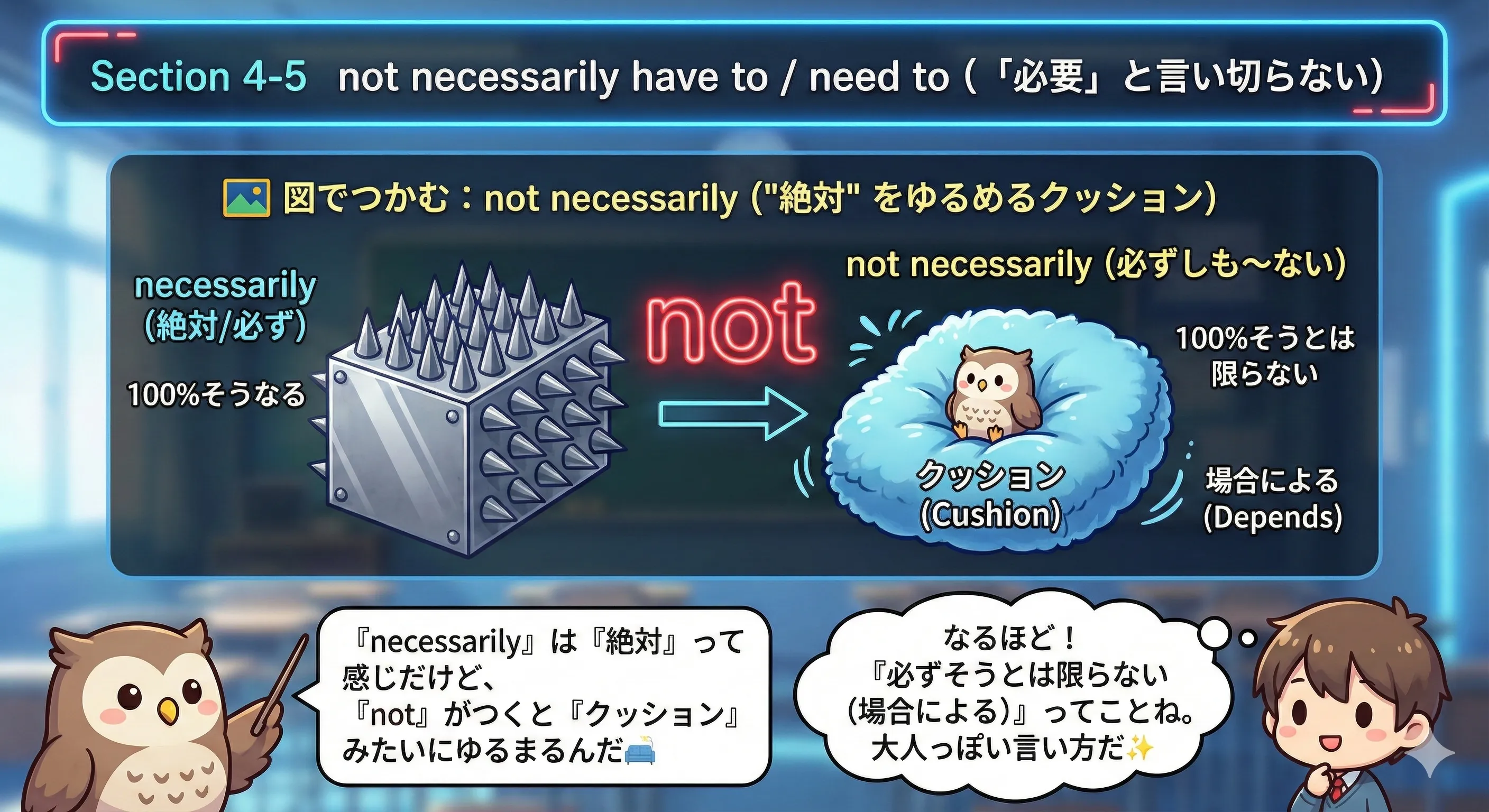
🛋️ 4-5-0 導入:not necessarily は「断定をゆるめるクッション」
not necessarily は、相手を否定しすぎずに
「そうとも限らないよ」と言える便利表現です😊
「絶対!」を少し弱めて、
可能性を残すのがポイントです✨
not necessarily = 「絶対そう!」ではない(=条件しだい)🛋️
That’s not necessarily true.
(それは必ずしも本当とは限りません。)
It’s not necessarily a bad idea.
(それは必ずしも悪いアイデアとは限りません。)
Bigger isn’t necessarily better.
(大きいほど必ずしも良いとは限りません。)
🧩 4-5-1 基本:You don’t necessarily have to …(義務をゆるめる)
have to は「〜しなければならない(義務)」📌
そこに not necessarily を入れると、
「必ずそうしなきゃ、ってわけじゃない」になります😊
※ “ゼロ(絶対やらなくていい)” ではなく、
「状況によっては不要」というクッション感です🛋️
命令っぽくしたくないときに便利!
「やらなきゃダメ」ではなく、選択肢を残して伝えられます😊
You don’t necessarily have to finish it today.
(それを今日中に終わらせなければならないとは限りません。)
You don’t necessarily have to agree with me.
(私に必ずしも賛成する必要はありません。)
We don’t necessarily have to leave early.
(私たちは必ずしも早く出る必要はありません。)
You don’t necessarily have to buy the most expensive one.
(一番高いものを必ず買う必要はありません。)
don’t necessarily have to です🛋️
You don’t necessarily have to ... を見たら、
「必ず〜しなきゃ、ってわけじゃない(場合による)」が出ればOKです😊
🧠 4-5-2 基本:You don’t necessarily need to …(必要性をゆるめる)
need to は「〜する必要がある(必要性)」🔧
そこに not necessarily を入れると、
「必須(ひっす)ではない」にできます😊
※ 必ずしも “ゼロ” ではなく、状況しだいで必要になることもある という含みが残ります🛋️
「それ、やらなきゃダメ?」と聞かれたときに、 “絶対ではないよ” と安心させる言い方です😊
You don’t necessarily need to reply right away.
(すぐに返信する必要は必ずしもありません。)
You don’t necessarily need to explain everything.
(全部を説明する必要は必ずしもありません。)
We don’t necessarily need to change the plan.
(計画を変える必要は必ずしもありません。)
You don’t necessarily need to bring your laptop.
(ノートPCを持ってくる必要は必ずしもありません。)
need to は「必要」🔧 → それを not necessarily がゆるめます🛋️
You don’t necessarily need to ... を見たら、
「必須じゃない(でも状況しだい)」が出ればOKです😊
🧭 4-5-3 使い分け:have to と need to の選び方
どちらも「しないといけない」っぽく見えますが、得意分野が違います😊
have to は「義務(ルールや外の決まり)📌」
need to は「必要(目的や状況)🔧」
そこに not necessarily を足すと、
「必須とは言い切らない(場合による)」になります🛋️
📌 have to(義務:ルール・外から)
「決まりがある」「立場的に必要」みたいな空気。
You don’t necessarily have to ...
You don’t necessarily have to wear a suit.
(スーツを必ず着なければならないとは限りません。)
We don’t necessarily have to follow that old rule.
(その古いルールに必ず従わなければならないとは限りません。)
You don’t necessarily have to come in person.
(直接来なければならないとは限りません。)
🔧 need to(必要:目的・状況から)
「目的達成のために必要」「状況的に必要」みたいな空気。
You don’t necessarily need to ...
You don’t necessarily need to memorize it.
(それを暗記する必要は必ずしもありません。)
We don’t necessarily need to rush.
(急ぐ必要は必ずしもありません。)
You don’t necessarily need to worry about it.
(それを心配する必要は必ずしもありません。)
ルール・義務っぽい → have to 📌
目的・状況っぽい → need to 🔧
どちらも not necessarily をつければ 「必須とは言い切らない(場合による)」にできます😊
🗣️ 4-5-4 会話で便利:やわらかい提案・安心させる言い方
not necessarily は、相手にプレッシャーをかけずに
「絶対じゃないよ」と言える “やさしい否定” です😊
特に have to / need to と組み合わせると、
提案や安心の空気を作れます✨
相手が「やらなきゃダメ?」と不安そうなときに、
「場合によっては、そこまでしなくて大丈夫」と伝えられます😊
💡 やわらかい提案(圧を下げる)
“こうしなきゃ!”をやめて、選択肢を残す言い方😊
You don’t necessarily have to decide now.
(今決めなきゃいけないわけではありません。)
We don’t necessarily need to talk about it today.
(今日その話をする必要は必ずしもありません。)
You don’t necessarily need to say yes.
(必ずしも「はい」と言う必要はありません。)
🧸 安心させる(不安を下げる)
“それ全部やらなきゃ…”の不安をやわらげる😊
You don’t necessarily have to do it alone.
(1人でやらなきゃいけないわけではありません。)
You don’t necessarily need to worry about it.
(それを心配する必要は必ずしもありません。)
You don’t necessarily need to be perfect.
(完璧である必要は必ずしもありません。)
have to は「義務」📌 をゆるめる/ need to は「必要」🔧 をゆるめる
どちらも not necessarily で “角のない言い方” にできます😊
⚠️ 4-5-5 つまずきポイント(誤解しやすい3点)
ここは “意味のズレ” が出やすいので、ポイントを3つに絞って整理します😊
not necessarily は
「ゼロ」ではなく「場合による」です🛋️
① 「ゼロ否定」と勘違いしない
You don’t have to は「しなくていい(義務なし)」✅
You don’t necessarily have to は「必ずそうとは限らない」🟡
You don’t have to come.
(来なくていいです。)
You don’t necessarily have to come.
(必ず来なきゃいけないとは限りません。)
② mustn’t(禁止)と混同しない
mustn’t は「してはいけない(禁止)」🚫
don’t necessarily have/need to は「必須ではない(場合による)」🛋️
You mustn’t park here.
(ここに駐車してはいけません。)
You don’t necessarily need to park here.
(ここに駐車する必要は必ずしもありません。)
③ 語順は “固定” で覚える
学習段階では、形を固定すると迷いません😊
don’t necessarily + have to / need to が安全です。
You don’t necessarily have to do it.
(それを必ずやる必要はありません。)
You don’t necessarily need to do it.
(それを必ずやる必要はありません。)
not necessarily は “ゼロ” じゃなく “場合による”🛋️
迷ったら don’t necessarily + have to / need to の形で固定すると安全です😊
🗺️ 4-5 まとめ(1分で戻れる地図)
このセクションの合言葉はこれ😊
not necessarily =
「必ずそうとは限らない(場合による)」🛋️
| 表現 | ニュアンス | 例(よく使う形) |
|---|---|---|
🛋️
not necessarily
|
クッション 言い切らない(条件しだい) |
That’s not necessarily true. (必ずしも本当とは限らない) |
📌
don’t necessarily have to
|
義務 義務が100%とは限らない |
You don’t necessarily have to ... (必ず〜しなきゃ、ってわけじゃない) |
🔧
don’t necessarily need to
|
必要 必要性が100%とは限らない |
You don’t necessarily need to ... (必ず〜する必要はない) |
✅
don’t have to
|
ゼロ 義務なし(しなくていい) |
You don’t have to ... (〜しなくていい) |
🚫
mustn’t
|
禁止 してはいけない |
You mustn’t ... (〜してはいけない) |
「場合による」なら not necessarily 🛋️
「しなくていい(義務なし)」なら don’t have to ✅
「禁止」なら mustn’t 🚫
That’s not necessarily true.
(それは必ずしも本当とは限りません。)
You don’t necessarily have to decide now.
(今決めなきゃいけないわけではありません。)
You don’t necessarily need to reply right away.
(すぐに返信する必要は必ずしもありません。)
not necessarily が使えると、英語が “押しつけない” 感じになって、会話がラクになります😊
ここまで読めたあなたは、もう準備はバッチリです✨
5. 準否定の使い分け(まずは全体像)
このセクションでは、
“not を使わないのに、ほぼ否定みたいに聞こえる”
表現をまとめて見渡します😊
たとえば few / little(量が少ない)、
rarely / hardly ever(回数が少ない)、
hardly / barely(できる度合いがギリギリ)などが主役です。
ここでは詳しい説明に入る前に、「まずはざっくりイメージをつかむ」ことを目標にしましょう。
むずかしい用語が出たら、かならず一緒にかんたん補足を入れます。
例:準否定(強い否定じゃないけど「ほとんど〜ない」の気持ち)/倒置(語順をひっくり返して強調する形)
🗺️ 図でつかむ:準否定は「何が少ない?」で整理できる

量(few / little)・ 頻度(rarely / hardly ever)・ 程度(hardly / barely) ※ 分類(ぶんるい)=「仲間ごとに分ける」ことです😊
🧭 次はどちらから読む? 5-1 ~ 5-5 へのナビゲーション
ここは「入口ページ」なので、どこから読んでもOKです😊
「量の話が気になる」「会話で“めったに〜ない”を言いたい」など、
今の目的に近いところから進めば、覚えやすくなります。
※ 目的(もくてき)=「何のために学ぶか」。目的があると記憶が強く残ります✨
I have few friends here.
(ここには友だちがほとんどいません。)
I hardly ever drink coffee.
(私はコーヒーをめったに飲みません。)
I could barely finish it in time.
(私は時間内にそれをかろうじて終えられました。)
人は「完璧に分かってから始める」よりも、 「だいたい分かった状態でまず動いてみる」 方が、記憶に残りやすく学習が続きやすいと言われます。
そして——ここまで読めたあなたは、もう準備はバッチリです😊✨
5-1. 【量】few / little(ほとんど〜ない)
ここでは、few と little を使って
「量がほぼゼロ(でも完全な 0 と言い切らない)」
感覚をつかみます😊
few は 数えられる名詞(1つ2つと数えられる:friends, books など)、
little は 数えられない名詞(水・時間・お金など:water, time, money)に使うのが基本です。
※ 準否定(強い否定じゃないけど「ほとんど〜ない」の気持ち)/量(りょう)=「どれくらいあるか」
そして次の 5-1-2 では、a が付くと意味がガラッと変わる
a few / a little もセットで整理します✨
※ a の役割:小学生向けに言うと「ちょっとあるよ」のサインです😊
few
little
Section 5-1
Lesson 112
🧠
図でつかむ:few は “数”、little は “量” を「ほぼない」

※ 不可算名詞(ふかさんめいし)=「1つ2つと数えにくい名詞」(例:time / money / information)
5-1-1. まずは基本:few と little(ほとんど〜ない)📉
まずは「何を “少ない” と言っているか」で選びます😊
数(人・本・席など)なら few、
量(時間・お金・水など)なら little。
※ コツ:最初は「友だち・本 → few」「時間・お金 → little」だけでもOKです✨
friends, books, students意味:ほとんど〜ない(数が少ない)
time, money, water, information意味:ほとんど〜ない(量が少ない)
「1つ2つと数えられる?」→ Yes なら
few / No なら little
I have few friends in this city.
(この街には友だちがほとんどいません。)
👥 friends は数えられる → few が自然です。
Few people know the truth.
(真実を知っている人はほとんどいません。)
🕵️♂️ 文頭の Few は「ほとんどいない」のサインになりやすいです。
We have little time.
(私たちには時間がほとんどありません。)
⏳ time は数えにくい → little が基本です。
5-1-2. 対比が命:a few / a little(少しはある)✨
ここが一番大事ポイントです😊
a が付くと「少しはある(ゼロじゃない)」に変わります。
つまり、
few / little は「ほとんどない」、
a few / a little は「少しある」です✨
※ 対比(たいひ)=「並べて違いを見る」こと。違いがスッと入ります。
| 形 | 意味(やさしい言い換え) | よく一緒に出る名詞 |
|---|---|---|
few
few + 複数
|
ほとんどない
(ゼロに近い感じ)
|
friends, books, people
|
a few
a few + 複数
|
少しはある
(ゼロじゃないよ)
|
friends, days, questions
|
little
little + 不可算
|
ほとんどない
(量が足りない)
|
time, money, water
|
a little
a little + 不可算
|
少しはある
(ちょっと残ってる)
|
time, money, information
|
a は「ちょっとあるよ」のサイン。
few / little で不安になったら、まず a の有無 をチェック!
📉 I have few friends here. 📈 I have a few friends here.
(📉 ここには友だちがほとんどいません。)
(📈 ここには友だちが少しいます。)
✅ 同じ friends でも、a が付くかどうかで気持ちが変わります。
⏳ We have little time. ⏱️ We have a little time.
(⏳ 私たちには時間がほとんどありません。)
(⏱️ 私たちには時間が少しあります。)
💡 time は数えにくい名詞 → little 系で対比します。
I speak a little English.
(私は英語を少し話せます。)
5-1-3. ニュアンス調整:very / so / too / only を足して強さを操る🎛️
few / little は「ほとんど〜ない」ですが、
前に very や too を足すと、“少なさ”の雰囲気を細かく調整できます😊
※ ニュアンス=「ことばの空気感」/操る(あやつる)=「うまくコントロールする」
| 足す語 | 意味(やさしい言い換え) | 型(よく使う形) |
|---|---|---|
very
very
|
かなり少ない
(“ほとんど”をさらに強める)
|
very few / very little |
so
so
|
あまりに少ない
(びっくり・強調)
|
so few / so little |
too
too
|
少なすぎて困る
(足りない!の気持ち)
|
too few / too little |
only
only
|
少ししかない
(控えめに現実を言う)
|
only a few / only a little |
足す語 + few/little の順が基本です。
例:
very few people / too little time / only a few seats
very few
Very few people know his real name.
(彼の本名を知っている人はほとんどいません。)
👀 few を very で強めて「本当に少ない!」の空気に。
so little
So little information was available.
(利用できる情報があまりに少なかったです。)
😲 so は「そんなに!?」の強調。ニュース/報告文でも使えます。
too little
We have too little time to finish this today.
(今日これを終えるには時間が少なすぎます。)
⏳ too は「足りなくて問題になる」ニュアンス。
only a few
Only a few seats were left.
(席は少ししか残っていませんでした。)
🎟️ only は「現実として少ない」を落ち着いて言う感じです。
5-1-4. 「特定の中で少ない」:few/little of + the / my / us 🧩
few students は「生徒がほとんどいない(全体の話)」ですが、
few of the students は「その生徒たちの中で、ほとんどいない(部分の話)」です😊
※ 特定(とくてい)=「その中のこれ!」/部分(ぶぶん)=「全体のうちの一部」
few of + the / these / my / us / them + 複数名詞例:
few of the students / few of us
little of + the / this / my + 不可算名詞例:
little of the water / little of my time
of がある → 「その中の一部(特定グループの中で少ない)」
of がない → 「全体として少ない(一般の話)」
the + 複数名詞
Few of the students answered correctly.
(その生徒たちのうち、正しく答えた人はほとんどいません。)
🎯 the students の「中で」少ない → few of。
us
Few of us knew what to do.
(私たちのうち、どうすべきか分かっていた人はほとんどいません。)
👥 us は「私たち」という特定の集団。だから few of us が自然。
the + 不可算名詞
Little of the water was left.
(その水はほとんど残っていませんでした。)
💧 “その水(特定の水)” の中で少ない → little of the water。
my
Little of my time is free this week.
(今週、私の時間のうち空いているのはほとんどありません。)
🗓️ my time(私の時間)の「中で」少ない → little of がぴったり。
5-1-5. よくある混乱を先に潰す:hardly not/little=小さい?/not many との違い🧯
ここは「間違えやすいところ」を先に片づけて、安心して先へ進むコーナーです😊
※ 混乱(こんらん)=「頭の中がごちゃごちゃになること」/潰す(つぶす)=「先に解決する」
hardly はそれ自体が 「ほとんど〜ない」 の準否定です。だから
not と一緒に使うと、学習者向けには ×不自然 と扱うのが安全です。
※ 例:× I can't hardly hear you.(学習では避ける)
hardly を使うなら “not を足さない”。
強く言い切るなら
can't を使って I can't hear you. でもOKです。
I can hardly hear you.
(あなたの声がほとんど聞こえません。)
hardly がぴったり。
hardly ever
I hardly ever eat out.
(私は外食をめったにしません。)
He hardly slept last night.
(彼は昨夜ほとんど眠れませんでした。)
a little + 名詞 は「小さい〜」になることがあります。例:
a little boy(小さな男の子)
little + 不可算名詞 は「量がほとんどない」です。例:
little time(時間がほとんどない)
後ろが time / money / water / information みたいに「量」で考える名詞なら、 little = ほとんどない の可能性が高いです😊
I met a little girl at the park.
(公園で小さな女の子に会いました。)
I have little time today.
(今日は時間がほとんどありません。)
There is little water left.
(水はほとんど残っていません。)
not many は「多くはない(わりと中立)」、few は「ほとんどない(準否定で強め)」になりやすいです😊※ 中立(ちゅうりつ)=「感情を強くのせない言い方」
「事実として淡々と言う」→
not many「少なさをはっきり出す」→
few
🙂 Not many people came to the event. 😬 Few people came to the event.
(🙂 そのイベントに来た人はあまり多くありませんでした。)
(😬 そのイベントに来た人はほとんどいませんでした。)
🙂 Not many questions were asked. 😬 Few questions were asked.
(🙂 質問はあまり多くありませんでした。)
(😬 質問はほとんどありませんでした。)
🙂 There are not many seats left. 😬 There are few seats left.
(🙂 残っている席はあまり多くありません。)
(😬 残っている席はほとんどありません。)
「ミスしやすいポイント」を先に知っているだけで、読み書きのストレスがグッと減ります😊
5-1 のまとめ:迷ったら「3ステップ」で決めよう🧭
「何が少ない?」を確認すれば、ほとんど迷いません😊
小学生向けに言うと「数(かず)なの?量(りょう)なの?」を先に決めるだけです✨
① 数?量?を決める
-
数(数えられる) →
few + 複数名詞 -
量(数えられない) →
little + 不可算名詞
② a の有無をチェック
few / little:ほとんどないa few / a little:少しはある(ゼロじゃない)
③ 仕上げ:強さと範囲を調整
very / so / too / only
範囲
few/little of + the / us / my
| やりたいこと | おすすめの形 | やさしい意味 |
|---|---|---|
| 少なさを強めたい | very few / very little |
かなり少ない(ほぼない) |
| 少なすぎて困る | too few / too little |
足りなくて問題になる |
| 特定の中で少ない | few of the ... / little of my ... |
“その中の一部”で少ない |
hardly はすでに準否定なので、
not を足さないのが安全です😊
🧪 ミニ例で最終チェック(“型”が見えたら勝ち!)
few
ほとんどない
Few people understood the rule.
(そのルールを理解した人はほとんどいませんでした。)
little
ほとんどない
We have little money right now.
(今、私たちにはお金がほとんどありません。)
a little
少しはある
I have a little time after lunch.
(昼食のあと、時間が少しあります。)
ここまで整理できたら、few / little の基礎は完成です。
あとは例文で「自分の言葉」にしていくだけです😊
5-2. 【頻度】rarely / seldom / hardly ever(めったに~ない)
ここでは、rarely / seldom / hardly ever を使って、
「回数が少ない(=めったに〜ない)」
を自然に言えるようにします😊
few / little が「量(どれくらいあるか)」なら、
こちらは 頻度(ひんど)=「起きる回数」 の話です。
※ 準否定(強い否定じゃないけど「ほぼ〜ない」の気持ち)/頻度=「どれくらいの回数で起きるか」
そして 5-2-2 では、いちばん大事な 語順の型(どこに置く?) をスッキリ整理します📌 ※ 型(かた)=「いつも同じ並びで使えるルール」→覚える負担が激減します✨
rarely
seldom
hardly ever
Section 5-2
Lesson 112
🗺️ 図でつかむ:「頻度が低い」=“めったに〜ない”のゾーン
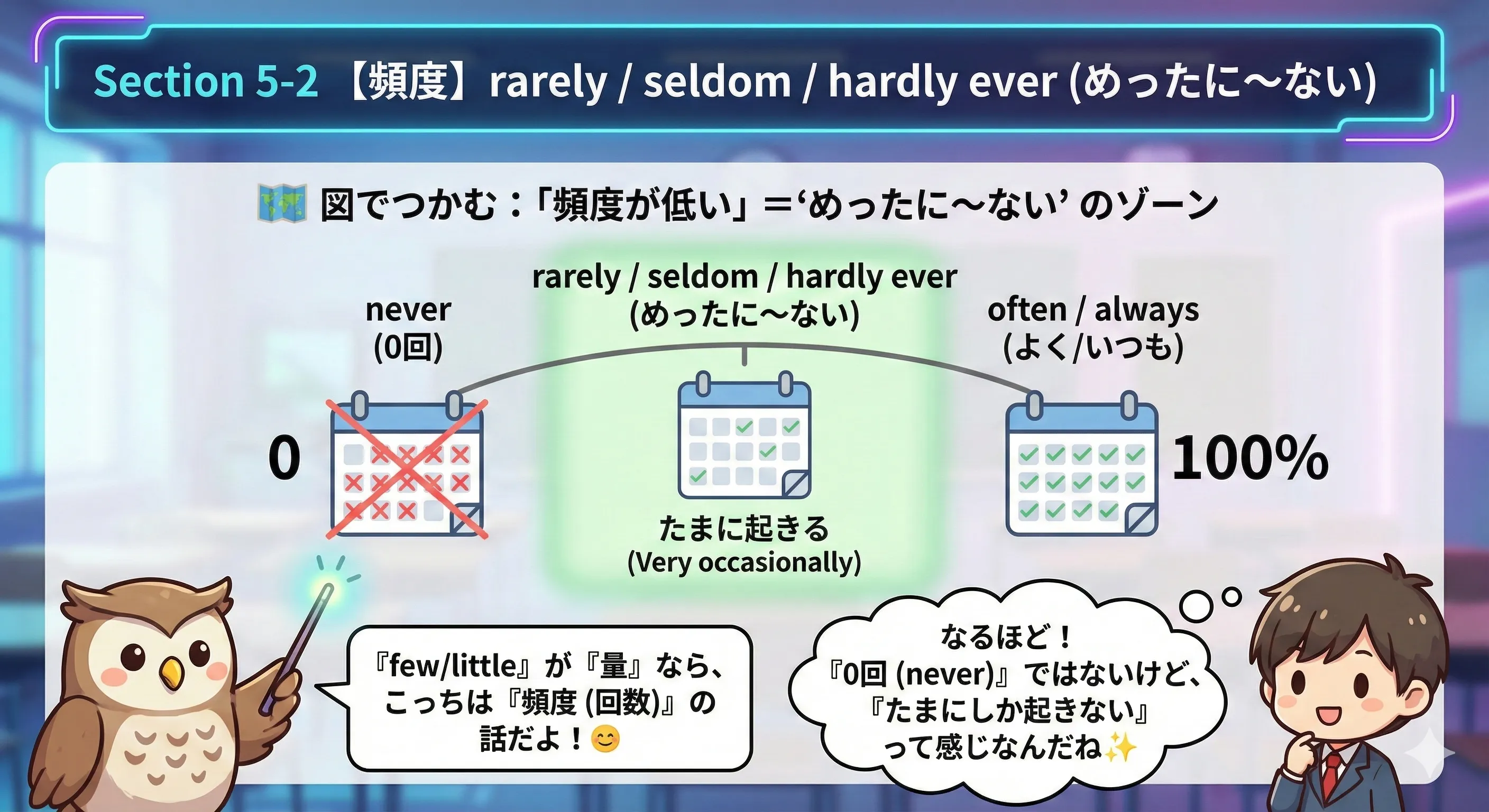
never とは違い、「たまに起きる可能性はある」感じです😊
5-2-1. まずは基本:頻度の準否定ってなに?🗓️
「めったに〜ない」は、“回数が少ない” を伝える言い方です😊
ざっくりキャラ分けすると、
hardly ever は 会話でよく使う やわらかい表現、
rarely / seldom は 少し硬め で文章でもよく出ます。
※ キャラ分け=「使われやすい場面の違い」くらいの意味です(難しく考えなくてOK✨)
(やさしく言う「めったに〜ない」)
(少し大人っぽい言い方)
(フォーマル寄り)
「めったに〜ない」を言いたいときは、 会話なら
hardly ever を選ぶと失敗しにくいです😊
I rarely eat fast food.
(私はファストフードをめったに食べません。)
🍔 生活習慣の話と相性がいいです。
She seldom goes out on weekdays.
(彼女は平日に外出することはめったにありません。)
🏠 “平日はほぼ家” の感じが出ます。
We hardly ever see snow here.
(ここでは雪を見ることはほとんどありません。)
❄️ “ほぼゼロに近い” の空気が出しやすい言い方です。
5-2-2. 語順の型:どこに置く?(動詞の前/be動詞の後)📌
ここがいちばん大事です😊
一般動詞の前/
be動詞の後
の2ルールだけ覚えればOK!
※ 一般動詞=eat / go / play などの動詞 / be動詞=am / is / are
🟦 ルール①:一般動詞の前
rarely / seldom / hardly ever + 動詞例:
I rarely drink coffee.
🟨 ルール②:be動詞の後
be動詞 + rarely / seldom / hardly ever例:
He is rarely late.
文の中に
am / is / are が見えたら、
その後ろに置くのが安全です😊
rarely
I rarely drink coffee.
(私はコーヒーをめったに飲みません。)
☕ drink の前に rarely を置きます。
seldom
She seldom watches TV at night.
(彼女は夜にテレビを見ることはめったにありません。)
📺 watches の前に置くのが型です。
rarely
He is rarely late.
(彼は遅刻することがめったにありません。)
⏰ is の後ろに置くのがポイントです。
5-2-3. 強さの違い:rarely / seldom / hardly ever の感覚🎚️
3つとも「めったに〜ない」ですが、“ほぼゼロ感”の出しやすさが少し違います😊
完璧な順位づけよりも、「場面で選べる」ことが大事です✨
※ 感覚=「ことばの空気」/ほぼゼロ感=「0回に近い感じ(でも never ではない)」
(口語でよく使う)
落ち着いた「めったに〜ない」。
少しフォーマル。
迷ったら
hardly ever(会話で万能) を選べばOK😊文章や少し硬めなら
rarely / seldom も自然です。
I hardly ever check social media in the morning.
(朝にSNSをチェックすることはほとんどありません。)
📱 “ほぼやらない” を自然に言える定番です。
He rarely talks about his past.
(彼は過去について話すことはめったにありません。)
🗣️ “頻度が低い” を落ち着いて言うときに便利です。
She seldom complains.
(彼女は文句を言うことはめったにありません。)
🧾 少しフォーマルな書き方にも合います。
5-2-4. よく一緒に使う表現:almost / quite / very とセットで自然にする🧩
「めったに〜ない」は、強さを少し調整したいときがあります😊
そんなときは almost / quite / very をセットで使うと自然です。
※ セット=「よく一緒に出る組み合わせ」/自然=「ネイティブっぽく聞こえる」
| 組み合わせ | 意味(やさしい言い換え) | ポイント |
|---|---|---|
almost
almost never
|
ほとんど絶対にしない
(0回にかなり近い)
|
“never に近い” 強さ。言い切りたい時に便利。 |
quite
quite rarely
|
わりとめったにない
(少し硬め)
|
文章寄りの表現。淡々と説明したい時に◎ |
very
very seldom
|
とてもめったにない
(強め)
|
seldom と相性が良い。少なさを強調。
|
まずは
hardly ever と
almost never の2つを覚えるだけでも、会話がかなり楽になります😊
almost never
I almost never eat sweets.
(私は甘いものをほとんど食べません。)
🍰 “never にかなり近い” 強さが出ます。
quite rarely
He quite rarely takes a day off.
(彼が休みを取ることはめったにありません。)
🗓️ “説明文” っぽい落ち着いた雰囲気になります。
very seldom
She very seldom drinks alcohol.
(彼女がお酒を飲むことはとてもめったにありません。)
🍷 seldom とセットにすると、丁寧めの強調になります。
5-2-5. よくある混乱を先に潰す:never との違い/hardly と hard/否定の二重化🧯
ここは「間違えやすいポイント」を先に片づけて、安心して先へ進むコーナーです😊
※ 混乱=「頭の中がごちゃごちゃ」/潰す=「先に解決しておく」
never は 「0回(絶対ない)」。rarely / seldom / hardly ever は
「ほぼない(でも0とは言い切らない)」 です😊
「未来も絶対ない?」→ Yes なら
never「たぶん起こらないけど、0とは言い切れない」→
rarely / seldom / hardly ever
I rarely eat out.
(私は外食をめったにしません。)
I never eat out.
(私は外食を決してしません。)
We hardly ever see snow here.
(ここでは雪を見ることはほとんどありません。)
work hard のように「がんばる」意味。(努力・強く)
(頻度・程度が低い)
hard = がんばる💪hardly = ほぼない🚫
He works hard every day.
(彼は毎日一生懸命働きます。)
He hardly works these days.
(彼は最近ほとんど働いていません。)
I hardly ever watch TV.
(私はテレビをめったに見ません。)
hardly / rarely / seldom は
すでに「ほぼ〜ない」の意味があるので、
not を重ねると混乱しやすいです。
否定にしたいなら
I don't go there often.(頻繁には行かない)“めったに〜ない”を言いたいなら
I hardly ever go there.(めったに行かない)
hardly ever
I hardly ever go there.
(私はそこにめったに行きません。)
don't ... often
I don't go there often.
(私はそこに頻繁には行きません。)
rarely
She rarely says that.
(彼女がそれを言うことはめったにありません。)
「never との違い」「hard / hardly」「否定の重ねがけ」を先に知っているだけで、ミスが激減します😊
5-2 まとめ:迷ったら「2ルール+1確認」でOK🧭
目的はシンプルです😊
「回数が少ない=めったに〜ない」 を、
語順の型で安全に言えるようにしましょう✨
① 3語の意味は同じ方向
rarely/seldom/hardly ever=「めったに〜ない」never=「0回(絶対ない)」
② 語順は2ルールだけ
- 一般動詞:前(
I rarely go...) - be動詞:後(
He is seldom late.)
③ 最後に1つだけ確認
hard(一生懸命)と hardly(ほとんど〜ない)は真逆🪤そして
hardly は準否定なので、学習では not を重ねない のが安全です😊
🧪 ミニ例で最終チェック
I hardly ever drink coffee.
(私はコーヒーをめったに飲みません。)
She rarely complains.
(彼女は文句を言うことがめったにありません。)
He is seldom late.
(彼は遅刻することがめったにありません。)
あとは「自分の生活の話」に置き換えて声に出すだけで、すぐ使える表現になります😊
5-3. 【程度】hardly / barely / scarcely(ほとんど~できない/かろうじて)
ここでは hardly / barely / scarcely を使って、
「どれくらいできるか(程度)」 を表します🎚️
5-2 の rarely(頻度=回数が少ない)とは違い、
こちらは 程度(ていど)=「できるレベル・ギリ度」 の話です。
※ 程度=「どれくらいできるか」/準否定=「強い否定ではないが、ほぼ〜ない」
この3つは、どれも “ほぼムリ” の方向ですが、 barely は「できたけどギリギリ」 の感じが強いのがポイントです😊 ※ ギリギリ=「本当にあと少しでダメだった」みたいな感じ
hardly
barely
scarcely
Section 5-3
Lesson 112
🎚️ 図でつかむ:「できる度合い」が低い=“ほとんど〜できない”ゾーン

5-3-1. まずは基本:頻度じゃなくて「程度」の準否定🎚️
ここで扱うのは「回数が少ない」ではなく、
“できるレベルが低い” という話です😊
小学生向けに言うと「できる?できない?…どのくらい?」の “どのくらい” の部分です。
🟩 「程度」=できるレベル
I can hardly hear you.(聞こえるレベルが低い=ほとんど聞こえない)
🟦 「頻度」と混ぜない
I rarely go there.(行く回数が少ない=めったに行かない)
rarely は「回数(何回?)」🗓️ / hardly / barely / scarcely は「レベル(どのくらい?)」🎚️
I can hardly hear you.
(あなたの声がほとんど聞こえません。)
She could barely stand up.
(彼女はかろうじて立てました。)
We scarcely noticed the change.
(私たちはその変化にほとんど気づきませんでした。)
5-3-2. 強さの感覚:hardly / barely / scarcely をざっくり分ける🧭
3つとも “ほぼムリ” 方向ですが、選ぶコツはシンプルです😊
hardly / scarcely は「ほぼできない」寄り🚫、
barely は「できたけどギリ」寄り😮💨
と覚えると迷いが減ります✨
🚫 「ほぼできない」グループ
(=ほとんど〜ない、に近い)
😮💨 「ギリできた」グループ
(=かろうじて)
「できた?できてない?」で選ぶと楽です😊
できてない寄り →
hardly /
できたけどギリ → barely
I hardly know him.
(私は彼のことをほとんど知りません。)
He barely passed the exam.
(彼は試験にかろうじて合格しました。)
There was scarcely any time left.
(時間はほとんど残っていませんでした。)
5-3-3. 語順の型:どこに置く?(動詞の前/be動詞の後)📌
hardly / barely / scarcely は、
「置き場所(語順)」を型で覚えるとミスが激減します😊
基本は 5-2 と同じく
一般動詞の前/
be動詞の後 です。
さらに can / could など助動詞(〜できる)を使うときは、
助動詞の後ろ に置くのが自然です。
※ 一般動詞=eat / go / remember など / be動詞=am / is / are / 助動詞=can / could / will など
🟦 ルール①:一般動詞の前
hardly / barely / scarcely + 動詞
例:I barely remember his name.
🟩 ルール②:be動詞の後
be動詞 + hardly / barely / scarcely
例:He is hardly aware of it.
🟥 ルール③:助動詞の後
can/could + hardly/barely/scarcely + 動詞
例:I can hardly move my arm.
can/could が見えたら、そのすぐ後ろに置くと安全です😊
barely
I barely remember his name.
(彼の名前をかろうじて覚えています。)
remember の前に置くのが型です。
hardly
She is hardly aware of it.
(彼女はそれにほとんど気づいていません。)
is の後ろに置くのがポイントです。
scarcely
We could scarcely believe it.
(私たちはそれをほとんど信じられませんでした。)
could の後ろに置くのが自然です。
5-3-4. よく一緒に使う形:hardly any / barely enough / scarcely ever など🧩
単語だけでなく「よく一緒に出る形(セット)」で覚えると、英語が一気にラクになります😊
このセクションでは、特に使いやすい3つに絞ります👇
※ セット=「よく一緒に出る組み合わせ」/絞る=「まずは少数で固める」
| 形 | 意味(やさしく) | ひとことイメージ |
|---|---|---|
hardly
hardly any + 名詞
|
ほとんど〜ない
(量がほぼゼロ)
|
冷蔵庫の牛乳が ほぼ空 みたいな感じ🥛 |
barely
barely enough + 名詞 / to do
|
ギリ足りる
(不足寸前)
|
電車に ギリ間に合う みたいな感じ🚃 |
scarcely
scarcely ever
|
めったに〜ない
(頻度が低い・やや硬め)
|
“rarely” の少し硬い版。文章で見かけやすい🧾 |
まずは
hardly any と
barely enough の2つが超おすすめです😊scarcely ever は「頻度寄り」なので、5-2(rarely)とセットで覚えると混乱しにくいです。
There is hardly any milk left.
(牛乳がほとんど残っていません。)
We had barely enough time to catch the train.
(電車に乗るのに時間がギリギリ足りました。)
I scarcely ever use cash these days.
(最近、現金を使うことはめったにありません。)
5-3-5. よくある混乱を先に潰す:hard vs hardly/almost との違い/二重否定🧯
ここは「間違えやすいポイント」を先に片づけて、安心して使えるようにするコーナーです😊
※ 潰す=「先に解決しておく」/二重否定=「否定を重ねてごちゃごちゃすること」
(努力して、強く)
(程度が低い)
hard = がんばる💪hardly = ほぼない🚫
He works hard every day.
(彼は毎日一生懸命働きます。)
He hardly works these days.
(彼は最近ほとんど働いていません。)
I can hardly breathe.
(息をするのがほとんどできません。)
almost は 「危うく〜するところだった」(結果は起きてないことが多い)。barely は 「ギリギリできた」(結果はできた)。
※ ざっくり:almost=失敗寸前 / barely=成功ギリギリ
😱 almost(危うく…)
(結果:多くは“しなかった”)
😮💨 barely(ギリできた)
(結果:できた)
almost missed(乗り遅れそうになった)と、
barely caught(ギリ間に合った)は、
セットで覚えると一生モノです🚃✨
I almost missed the bus.
(私はバスに乗り遅れそうになりました。)
I barely caught the bus.
(私はバスにかろうじて間に合いました。)
She could barely stand up.
(彼女はかろうじて立てました。)
hardly / barely / scarcely は、
すでに「ほぼ〜ない」の意味を含むので、
not を重ねると混乱しやすいです。
“ほとんど見えない” →
I can hardly see.“よく見えない” →
I can't see well.この2つを使い分ければ、スッキリ話せます😊
hardly
I can hardly see anything.
(私は何もほとんど見えません。)
can't ... well
I can't see well.
(私はよく見えません。)
scarcely
We could scarcely believe it.
(私たちはそれをほとんど信じられませんでした。)
hard / hardly と almost / barely の違いが分かると、 “ギリ” の表現が一気に上達します😊
5-3 のまとめ:迷ったら「方向+型+結果」でOK🎯
5-3 は「頻度」ではなく、
程度(どれくらいできるか) の話でした🎚️
ここを押さえれば、体調・時間・視界・テストなど、いろんな場面で使えます😊
① 方向(意味の軸)
hardly/scarcely:ほぼできない🚫barely:できたけどギリ😮💨
② 型(語順の軸)
- 一般動詞:動詞の前(
I barely remember...) - be動詞:be の後(
She is hardly...) - 助動詞:助動詞の後(
I can hardly...)
③ 結果(almost との対比)
barely ギリ成功(結果:できた)
※ この対比を覚えると「ギリ表現」が一気に強くなります✨
🧪 ミニ例で最終チェック
I can hardly hear you.
(あなたの声がほとんど聞こえません。)
I barely caught the bus.
(私はバスにかろうじて間に合いました。)
We could scarcely believe it.
(私たちはそれをほとんど信じられませんでした。)
あとは「自分の生活の“ギリ”」に置き換えて声に出すだけで、すぐ使える表現になります😊
5-4. 【強調】文頭に出す準否定 → 倒置(語順チェンジ)
rarely や hardly などの準否定を
文頭に出すと、
英語では 強調(いつもより強く言う)になり、
倒置(語順チェンジ) が起こりやすくなります🔁
見た目は疑問文っぽいですが、疑問文ではありません(?は付けない)😊
※ 倒置=語順をひっくり返すこと/強調=目立たせて強く言うこと
このセクションでは、 「どの言葉を文頭に出すと倒置になりやすいか」 と、 「どう作れば安全か(型)」 の入口を作ります😊 ※ 型=「いつも同じ並び」だと思うとラクです
🔁 図でつかむ:準否定を文頭へ → 語順が「疑問文っぽく」なる(でも疑問文ではない)
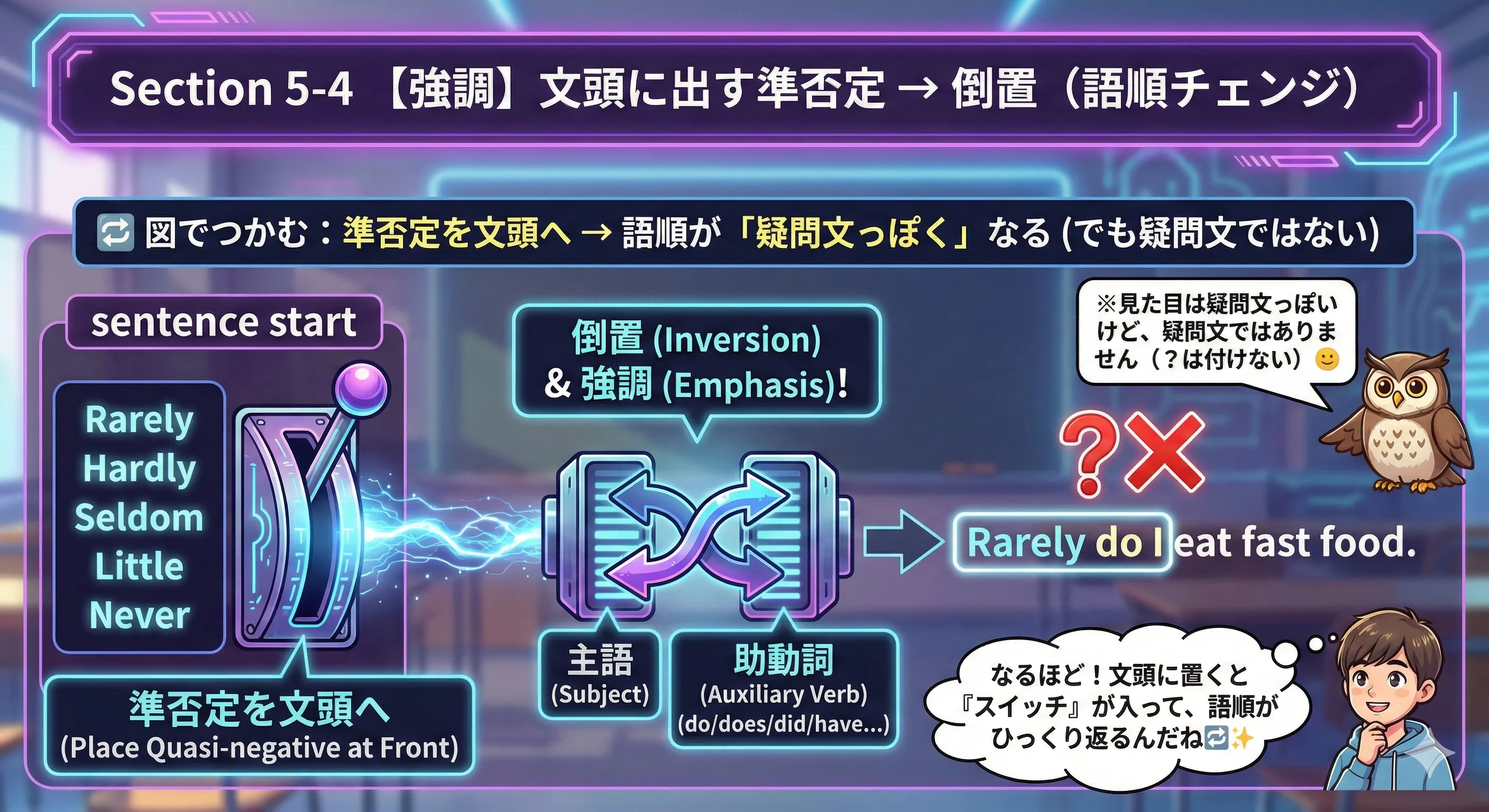
Rarely)を置くと、
do / does / did や
助動詞・be動詞 が前に出やすいです📌
※ ただし意味は「強調」なので、疑問文の?は付けません。
5-4-1. まずは基本:倒置ってなに?「強調すると語順が反転する」🔁
倒置(とうち)は、かんたんに言うと
語順をひっくり返して目立たせることです🔁
小学生向けに言い換えると「並び替えて強く言う」イメージ😊
準否定を文頭に出すと「めったに〜ない」を強調したくなり、
do / does / did などが前に出ます。
🙂 ふつうの語順(強調なし)
I rarely eat fast food.
(私はファストフードをめったに食べません。)
✨ 倒置(強調あり)
Rarely do I eat fast food.
(ファストフードはめったに食べないんです。)
見た目が疑問文っぽくても、これは 疑問文ではありません。
× Rarely do I eat fast food? みたいに「?」を付けないのが基本です😊
rarely
Rarely do I eat fast food.
(私はファストフードをめったに食べません。)
seldom
Seldom does he get angry.
(彼が怒ることはめったにありません。)
does になります。
hardly
Hardly did we sleep last night.
(昨夜はほとんど眠れませんでした。)
did です。
5-4-2. トリガー一覧:文頭に出すと倒置になりやすい準否定ワード📌
「どれを文頭に置くと倒置になりやすい?」を先に整理します😊
まずは使いやすい代表だけ覚えればOKです(全部いっぺんに覚えなくて大丈夫)✨
🗓️ 頻度(回数が少ない)
rarely
seldom
hardly ever
scarcely ever
never
Rarely do I ... / Never have I ...
🎚️ 程度(どれくらいできる?)
hardly
scarcely
barely
Hardly did we ... / Barely could I ...
😲 意外性(「まさか〜とは」)
little
little は「小さい」ではなく、
「ほとんど〜ない/まさか〜とは」 の強調でよく出ます。
例:Little did I know ...
まずは
Rarely / Seldom / Hardly の3つだけでOK😊慣れてきたら
Never(強め)や Little did I know(意外性)に広げましょう✨
rarely
Rarely do we talk about money.
(私たちはお金の話をすることはめったにありません。)
barely
Barely could I keep my eyes open.
(目を開けているのがやっとでした。)
little
Little did I know the truth.
(私は真実をほとんど知りませんでした/まさか知らなかったのです。)
5-4-3. 作り方のコア:do / does / did を使う倒置(doサポート)🧰
準否定を文頭に出して倒置するとき、いちばん大事なのが
do / does / did を入れることです😊
ふつうの文に助動詞(can / have など)がない場合、
倒置のために「doサポート」を呼びます🧰
※ doサポート=「助動詞がない一般動詞の文」を倒置できるようにする仕組み
🙂 ふつうの語順
I rarely eat out.
✨ 倒置(doサポート)
Rarely do I eat out.
- まず普通の文:
I rarely eat out. - 準否定を文頭へ:
Rarely ... I eat out. -
do/does/did を入れて倒置:
Rarely do I eat out.✅
現在 →
do / does /
過去 → did /
主語が三単現(he/she/it) → does
rarely
Rarely do I go out on weekdays.
(平日に外出することはめったにありません。)
do で倒置します。
seldom
Seldom does she complain.
(彼女が文句を言うことはめったにありません。)
she なので does です。
hardly
Hardly did he say a word.
(彼はほとんど一言も話しませんでした。)
did を使います。
5-4-4. when / before とセット:Hardly / Scarcely / Barely の「〜するとすぐ」倒置⚡
ここは倒置の中でも 型が決まっていて覚えやすい人気パターンです😊
「〜したとたん、…した」という
スピード感(すぐ起きた感じ)を出せます⚡
※ とたん=「すぐ」「瞬間に」みたいな意味
Hardly / Scarcely / Barely
+
had
+
S
+
過去分詞
+
when / before
+ ...
Hardly had I sat down when the phone rang.
Hardly had S + 過去分詞 when ...
(〜したとたん…)⚡
when
Hardly had I sat down when the phone rang.
(座ったとたん、電話が鳴りました。)
when
Scarcely had we arrived when it started to rain.
(到着したとたん、雨が降り始めました。)
before
Barely had she finished speaking before everyone applauded.
(彼女が話し終えるやいなや、みんなが拍手しました。)
5-4-5. よくあるミスを先に潰す:疑問文にしない/notの二重化/カジュアルでは言い換えも◎🧯
倒置はかっこよく強調できる反面、 ミスしやすいポイントもあります。ここで先に整理して安心して使いましょう😊 ※ 潰す=「先に解決しておく」/言い換え=「別の言い方で安全に伝える」
❓ ① 疑問文にしない
NG
Rarely do I ... ?OK
Rarely do I ... .
🧨
② not を重ねない
注意
rarely not などは学習では避けてOK😊
🙂 ③ 会話では言い換えも◎
言い換え
I rarely ... / I hardly ever ...
「文頭に準否定 → do/does/did か助動詞が前 → でも?は付けない」
この3つだけ守れば、倒置は安定します😊
rarely
Rarely do I complain.
(私は文句を言うことはめったにありません。)
notを重ねない
hardly
Hardly did he speak during the meeting.
(彼は会議中、ほとんど話しませんでした。)
hardly 自体が “ほぼ〜ない” を含みます。
rarely
I rarely complain.
(私は文句を言うことはめったにありません。)
5-4 のまとめ:強調したいなら「文頭+倒置」、迷うなら通常語順でOK🎯
5-4 は、準否定を 文頭に出して 倒置(語順チェンジ)を起こし、 「めったにない」「ほとんどない」を強く目立たせるテクニックでした🔁✨
✅ 3ポイントで整理
-
文頭に準否定:
Rarely/Seldom/Hardly/Neverなど - 倒置:do/does/did または 助動詞 が前へ
- 疑問文ではない:?は付けない
🧠 覚え方のコツ
慣れたら Hardly had S + 過去分詞 when ...(〜したとたん)⚡へ。
🧪 ミニ例で最終チェック(強調 vs カジュアル)
Rarely do I make mistakes.
(私はミスをすることはめったにありません。)
I rarely make mistakes.
(私はミスをすることはめったにありません。)
Hardly had I arrived when the meeting started.
(到着したとたん、会議が始まりました。)
倒置は「使えたら強い」武器なので、まずは Rarely do I ... を1つ丸ごと口になじませましょう😊
6. 否定の転移(I don't think ... 型)
ここでは I don't think + 文 のように、
否定(not)を前に出す言い方を整理します😊
見た目は think を否定しているのに、意味は「後ろの文(中身)」に
否定がかかる感じになるのがポイントです。
まずは「全体像だけ」つかめばOK! ここから 6-1 ~ 6-4 で、順番にやさしく解きほぐします。
むずかしい言い方に見えますが、言っていることはシンプルです✨
「転移(場所がうつること)」= 否定の“居場所”が前に見える、というイメージ。
さらに「スコープ(かかる範囲)」= どこまで否定が効いているか、もここでスッキリします。
🧠 図でつかむ:否定の「見た目」と「意味」のズレ
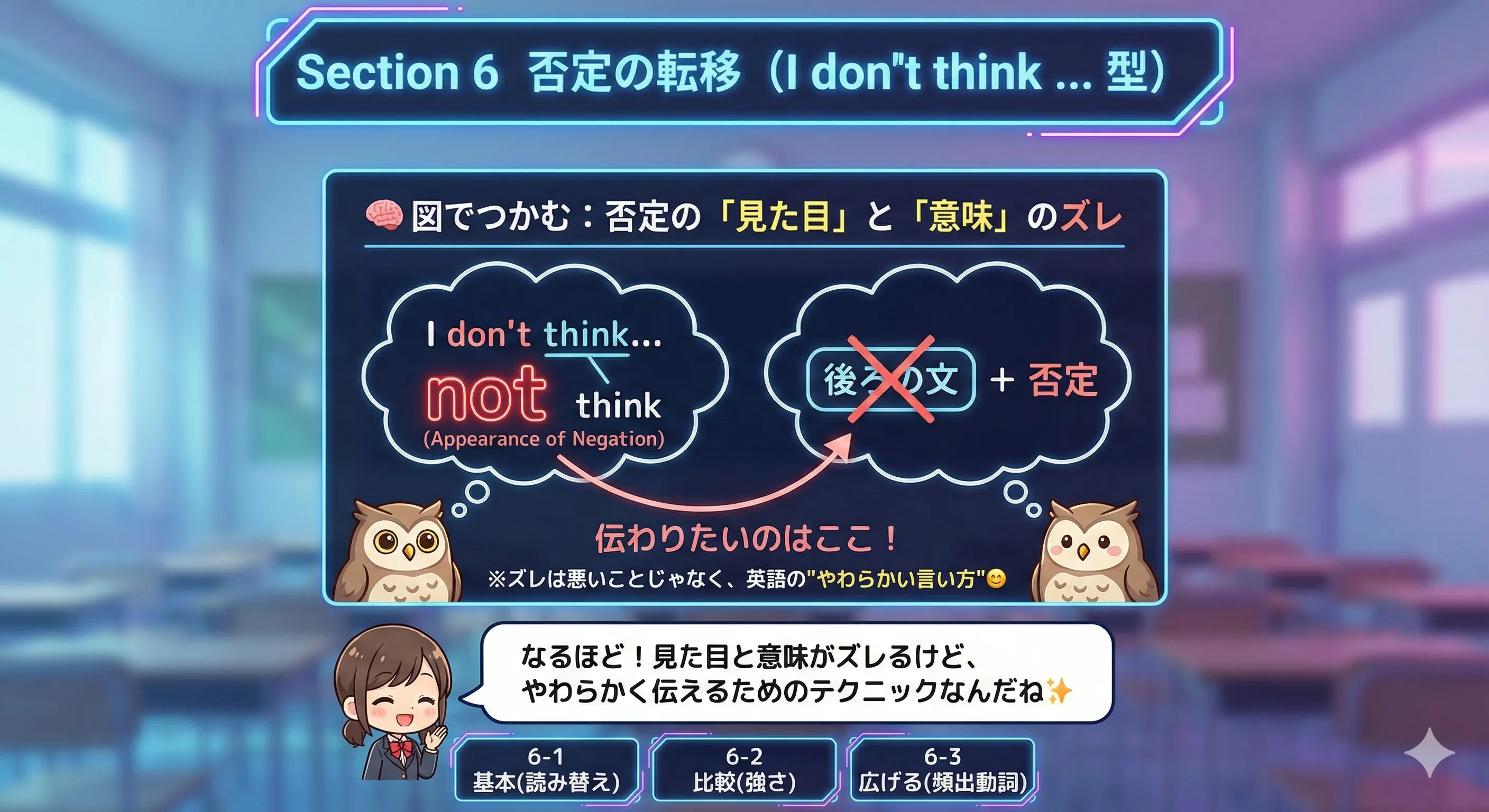
I don’t think(見た目はここが否定)
→ でも、伝えたいのは後ろの文の否定※ 「ズレ」は悪いことじゃなく、英語の“やわらかい言い方”としてよく使われます😊
🌟 これから何を学ぶ?(6-1 ~ 6-4 の地図)
この Section 6 は、「否定の転移」を
迷わず読めるようにするためのスタート地点です😊
I don't think ... は、相手に角が立ちにくい
やわらかい否定としてもよく使われます。
ここまで読めたあなたは、もう準備はバッチリです✨
※ 「角が立つ」=言い方がきつく聞こえてしまうこと(ケンカになりやすい感じ)
I don't think it's a good idea.
(それは良い考えだとは思いません。)
think を否定 / 伝えたいこと:「良い考え」ではない寄り
🗺️ 次はどちらから読む? 6-1 ~ 6-4 へのナビゲーション
6-1 ~ 6-4 は、どこから読んでもOKです😊
「まずは形を覚えたい」なら 6-1、
「言い方の強さが気になる」なら 6-2 から、という感じで進めましょう。
人は「完璧に分かってから始める」よりも、 「だいたい分かった状態でまず使ってみる」 方が、記憶に残りやすく学習が続きやすいです😊 まずは 6-1 を読んで、1つ例文を口に出せたら大成功!
「否定がどこにかかるか」を意識できた時点で、あなたはもう一段レベルアップしています✨ ここからは “気づける回数” が増えるほど、自然に読めるようになります😊
6-1. 「I don't think ...」の基本(意味の読み替え)
このパートでは I don't think + 文 を見た瞬間に、
意味をスッと読み替えるコツを身につけます😊
見た目は think を否定しているのに、
伝えたいのは 後ろの文(中身)の否定っぽい意味になることが多いのがポイントです。
※ 読み替え=頭の中で「言いかえる」こと(むずかしい理屈より “読める” を優先します)
さらに I don't think ... は、
言い方がやわらかい(角が立ちにくい)
表現として会話で超よく使われます✨
※ 角が立つ=言い方がきつく聞こえること(ケンカっぽくなる感じ)
🧠 図でつかむ:否定は前に見えるけど、意味は後ろに落ちやすい
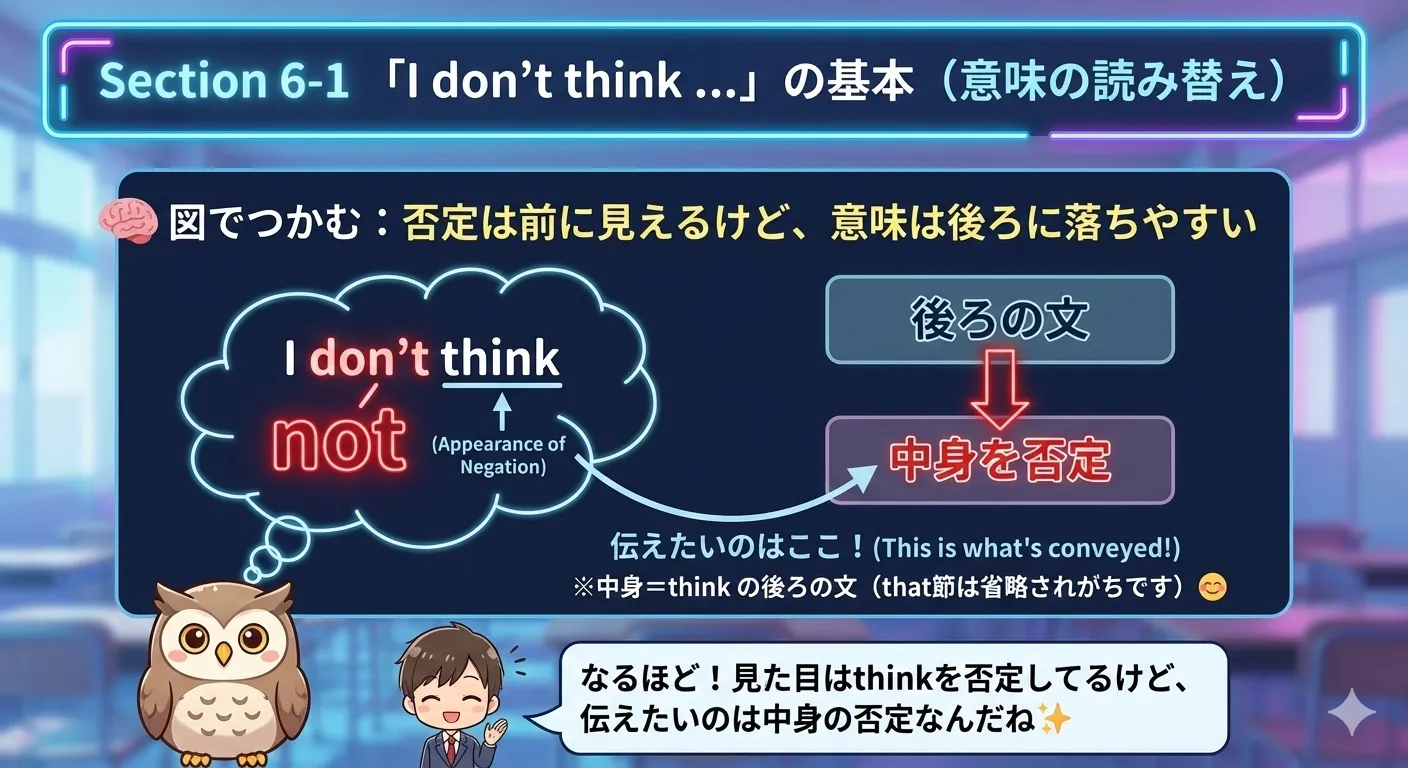
I don’t think(見た目はここが否定)
→ でも “中身” を否定っぽく伝える※ 中身=
think の後ろの文(that節は省略されがちです)
🌟 ゴール宣言:ここで「できるようになること」
ここでは、むずかしい説明よりも
「すぐ読める・使える」を優先します😊
下の3つができたら、もう合格ラインです✨
I don't think + 文 を見たら、
「〜だとは思わない」→「(だいたい)中身の否定」とスッと読める
最初から完璧に理解しなくてOKです😊 「読める回数が増える」=上達なので、まずは例文で感覚をつかみましょう!
I don't think he is right.
(彼が正しいとは思いません。)※だいたい「彼は正しくないと思う」寄り
don't think を見たら「中身の否定っぽい意味?」と一瞬チェック!
I don't think it will rain today.
(今日は雨は降らないと思います。)
I don't think we have enough time.
(私たちは時間が十分にあるとは思いません。)※だいたい「時間が足りない」寄り
🧩 1行ルール:否定は前に見えるけど、意味は後ろに落ちやすい
I don't think + 文 は、まずこう読んでOKです😊
「(その文は)〜だとは思わない」
→ 日本語ではだいたい
「〜じゃないと思う」
に近い意味になります。
※ “落ちる”=意味の中心が「後ろの文」に移るイメージ
I don't think + [S V ...]
「don't think を見たら、中身に not を足してみる」
(頭の中だけでOK! 実際に英文へ not を書き足す必要はありません😊)
I don't think she is ready.
(彼女は準備ができているとは思いません。)※だいたい「準備できていない」寄り
I don't think he understands.
(彼は理解しているとは思いません。)※だいたい「理解していない」寄り
I don't think they will agree.
(彼らが賛成するとは思いません。)※だいたい「賛成しない」寄り
🧯 誤読を防ぐ:「考えてない」ではなく「〜だとは思わない」
I don't think ... は、
「今それを考えていない」ではなく、
「〜だとは思わない」が基本です😊
つまり、意見(自分の判断)をやわらかく否定している形なんです。
※ 誤読(ごどく)=読み間違い/意見=「私はこう思う」という考え
I don't think + 文 = 「(その文は)そうだと思わない」
※「考えてない」を言いたいときは
I'm not thinking about ... など別の形になります。
- I don't think の後ろに 文(S + V)が来ていたら、 ほぼ「〜だとは思わない」
- 「考えてない(今そのことを頭に入れてない)」は、 thinking about + 名詞 の形で言うのが自然
I don't think he knows the answer.
(彼は答えを知っているとは思いません。)
I'm not thinking about the answer right now.
(今は答えのことを考えていません。)
I don't think は「意見の否定」、
not thinking about は「今その話題を頭に入れてない」イメージです😊
I don't think the store is open today.
(その店は今日は開いているとは思いません。)
I'm not thinking about shopping today.
(今日は買い物のことは考えていません。)
I don't think she meant to be rude.
(彼女は失礼にするつもりだったとは思いません。)
I'm not thinking about her intention.
(彼女の意図のことは考えていません。)
🌿 ニュアンス:やわらかい否定(角を立てにくい言い方)
I don't think ... が人気なのは、
相手を強く否定せずに、
自分の意見を伝えられるからです😊
「角を立てにくい」= 言い方がキツく聞こえにくい、ということ。
He isn't right.
(言い切り)
I think he isn't right.
(意見だけど、やや直接)
I don't think he is right.
(やんわり否定)
反対するときほど、「やわらかい形」を使うと会話が続きやすいです😊 (続く=次の情報も引き出せる、というメリット!)
I don't think that's the best option.
(それが最善の選択肢だとは思いません。)
I don't think we should do it that way.
(そのやり方でやるべきだとは思いません。)
should(〜すべき)は強く聞こえやすいので、
I don't think でクッションを置くと安心です😊
I don't think he's being fair.
(彼は公平にしているとは思いません。)
I don't think it's your fault.
(それはあなたのせいだとは思いません。)
I don't think ... の強みです😊
🧩 形のバリエーション:後ろが変わっても読み方は同じ
I don't think の後ろは、いろんな形に変わります😊
でも安心してOK!読み方の基本は同じで、まずは
「〜だとは思わない」→(だいたい)「中身の否定」
を意識すれば大丈夫です。
-
be動詞(〜です/〜にいる)
:
I don't think S is ... -
一般動詞(行く/知る/好き など)
:
I don't think S V ... -
助動詞(will/can/should など)
:
I don't think S will/can/should ... -
完了形(今まで〜したことがある/ずっと〜してきた)
:
I don't think S has/have ...
「後ろが何でも、まずは “中身の否定?” をチェック」
(“チェック”=頭の中で確認するだけでOK😊)
I don't think this room is clean.
(この部屋はきれいだとは思いません。)※だいたい「きれいじゃない」寄り
I don't think he knows my name.
(彼は私の名前を知っているとは思いません。)※だいたい「知らない」寄り
I don't think it will take long.
(それは長くかからないと思います。)※「長くかかると思わない」→「長くかからない」寄り
I don't think I've seen this movie before.
(この映画を前に見たことがあるとは思いません。)※だいたい「見たことない」寄り
💬 超よく使う会話の返し(短い形)
I don't think ... は、会話では
短くサッと返す形がとても便利です😊
「言い切らない」= やわらかく、相手の顔も立てやすいのが強みです。
迷ったら I don't think so.(そうは思わないよ)だけでも会話が成立します😊
“Are you coming?” — “I don't think so.”
(「来る?」—「たぶん来ないと思う。」)
so は「そう(=来ること)」の代わり。短くて超便利!
“Can you help me today?” — “I don't think I can.”
(「今日手伝える?」—「できないと思う。」)
“Is it important?” — “I don't think it matters.”
(「それ重要?」—「重要じゃないと思うよ。」)
matter は「重要だ」という意味。会話でよく出ます。
“Will it be expensive?” — “I don't think it will.”
(「高くなる?」—「たぶん高くならないと思う。」)
I don't think it will は “そうはならないと思う” の短い言い方です😊
✅ 6-1 まとめ:この1ページで身につけたいこと
I don't think + 文 は、
見た目(否定が前)と
意味(中身の否定っぽさ)のズレがポイントでした😊
でも大丈夫。読み替えのコツさえ持てば、英語が一気に読みやすくなります✨
-
基本:
I don't think= 「〜だとは思わない」 - 誤読防止: 「考えてない」ではなく 意見の否定が多い
-
会話:
I don't think so.など短い返しが超便利
“don't think” を見たら、まず「中身の否定?」と考えられたら合格です😊
ここまで読めたあなたは、もう準備はバッチリです😊✨
次の 6-2 では、似ている形(
I think ... isn't など)との
“温度差(きつさ・やわらかさ)”を整理して、さらに迷いを減らします!
6-2. 似てる形の差(I think ... not / I think ... isn't)
このパートでは、同じ「否定」でも
言い方によって伝わり方が変わることを整理します😊
I don't think ... / I think ... isn't / I think not は、
日本語だと似た訳になりがちですが、英語では
“強さ(温度)”や
“当たり方(きつく聞こえるか)”
が変わるのがポイントです。
※ 温度=言い方のきつさ・やわらかさ(熱い=きつい、冷たい=やわらかいイメージ)
ここを押さえると、英語の否定が 自然でやさしい言い方 に見えてきます✨ ※ 当たり方=相手がどう受け取るか(「否定された!」と感じやすいかどうか)
🌡️ 図でつかむ:同じ否定でも“温度(きつさ)”が変わる
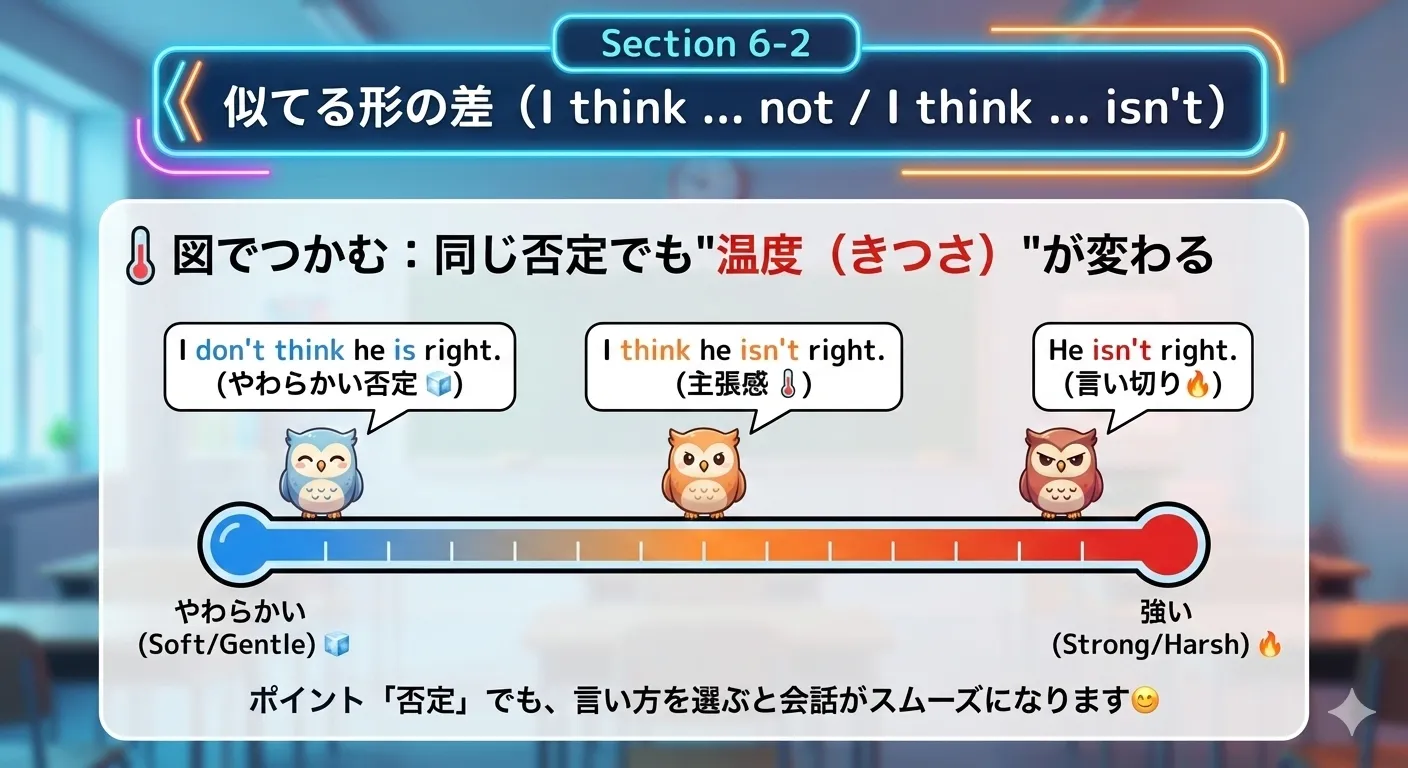
※ ここではまず “全体像” をつかみ、次の 6-2-0 / 6-2-1 で整理します。
🎯 ゴール宣言:同じ「否定」でも“伝わり方”が変わる
ここでの目標はカンタンです😊
同じ内容を言うときに、言い方の強さを調整できるようになること。
たとえば「反対したい」場面でも、いきなり強く言い切るより、
やわらかい形を選ぶと会話が続きやすいです✨
- 相手にきつく聞こえにくい否定の形を選べる
-
I don't think ...とI think ... isn'tの 温度差(きつさ)を説明できる - 迷ったときに、事故が少ない言い方を選べる
「言い方を選べる」だけで英語力が一段上がります😊✨ 完璧な理屈より、まずは 例文で温度を体感しましょう!
I don't think he is right.
(彼が正しいとは思いません。)※やわらかい否定
I think he isn't right.
(彼は正しくないと思います。)※意見だが、やや直接
He isn't right.
(彼は正しくありません。)※言い切り(強め)
🌡️ 温度表(強さのグラデーション):どれが一番きつい?
“きつい/やわらかい” は、文法の正しさではなく
受け取り方の話です😊
まずはこの順番を覚えると、英語の否定がグッと楽になります✨
This is a bad idea.
(言い切り)
I think this isn't a good idea.
(意見だが、やや直接)
I don't think this is a good idea.
(クッションあり)
反対意見でも、まずは I don't think ... でスタートすると 角が立ちにくいです😊
This is a bad idea.
(これは悪い考えです。)※言い切りで強め
I think this isn't a good idea.
(これは良い考えではないと思います。)※意見だが、やや直接
I don't think this is a good idea.
(これは良い考えだとは思いません。)※やわらかい否定
🧩 「I think ... not」って何?(使われる場面と注意)
I think not は、会話でときどき出る
短い否定の返事です😊
意味はシンプルで、「そうは思わない」に近い感じ。
※ 文の中で I think ... not を長く作るより、返事として I think not. の形が有名です。
初心者はまず I don't think so.(そうは思わないよ)を使えるようにすればOK😊
I think not. は「見かけたら読める」「返事で使える」くらいで十分です。
- 質問に対して、短く否定したいとき(返事)
- 少し「かため」の響きになりやすいので、場面を選ぶと安心
-
迷ったら
I don't think so.(万能)に戻ればOK😊
“Will he agree?” — “I think not.”
(「彼は賛成する?」—「そうは思いません。」)
“Is that a good idea?” — “I think not.”
(「それは良い考え?」—「そうは思いません。」)
“Are they coming?” — “I think not.”
(「彼ら来る?」—「来ないと思うよ。」)
🎯 「I think ... isn’t」:意見だけど、やや直接(当たりが強くなりやすい)
I think + 否定(例:I think he isn't ...)は、
「私はそう思う」と 判断を前に出す形です。
そのぶん I don't think ... より
主張が強く聞こえることがあります😊
※ 当たりが強い=相手が「否定された」と感じやすい、ということ
I don't think S is ...
(クッションあり)
I think S isn't ...
(意見+否定で主張感が出やすい)
反対を言うときに迷ったら、まずは I don't think ...(やわらかい)から言うと安心です😊
I think he isn't ready.
(彼は準備できていないと思います。)
I think this isn't the best option.
(これは最善の選択肢ではないと思います。)
I think she isn't being fair.
(彼女は公平にしていないと思います。)
I think it isn't going to rain.
(雨は降らないと思います。)
🧰 使い分けの実戦:同じ内容を3パターンで言い換える
ここは「知識」よりも 選べる感覚を育てるパートです😊
同じ内容でも、言い方を変えるだけで
空気(会話の雰囲気)が変わります。
まずは 3パターンセットで覚えると、すぐに使えます✨
-
やわらかい
I don't think + 肯定文(クッションあり) -
中
I think + 否定(意見としてはっきり) -
強い
否定を言い切る(ストレート)
まずは やわらかいで言ってみて、 必要なら少しずつ強さを上げると会話がスムーズです😊
🗣️ セットA:提案に反対(同じ内容を温度で調整)
I don't think this is a good idea.
(これは良い考えだとは思いません。)
I think this isn't a good idea.
(これは良い考えではないと思います。)
This is a bad idea.
(これは悪い考えです。)
📊 セットB:うまくいかない予想(仕事・計画で使える)
I don't think your plan will work.
(あなたの計画はうまくいくとは思いません。)
I think your plan won't work.
(あなたの計画はうまくいかないと思います。)
Your plan won't work.
(あなたの計画はうまくいきません。)※言い切り
⚖️ セットC:公平さを言う(人間関係で空気が変わりやすい)
I don't think that’s fair.
(それは公平だとは思いません。)
I think that isn't fair.
(それは公平ではないと思います。)
That isn't fair.
(それは公平ではありません。)※言い切り
🧭 まとめ:迷ったらどれ?(初心者の安全ルート)
迷ったら、まずは
I don't think + 肯定文
を選ぶのが安全です😊
反対意見でも角が立ちにくく、会話が続きやすいからです。
-
まずはやわらかく:
I don't think ... -
少しはっきり言うなら:
I think ... isn't/I think ... won't - 強く言い切るのは: 必要な場面だけ(安全・ルール・緊急など)
「否定の強さ」を選べるようになった時点で、あなたはもう “会話の英語” ができています😊✨
I don't think so.
(そうは思いません。)
I think it isn't necessary.
(それは必要ではないと思います。)
It isn't necessary.
(それは必要ありません。)※言い切り
6-3. よく出る動詞に広げる(think / believe / suppose など)
6-1 / 6-2 で身につけた「読み替え」のコツは、
think だけの特別ルールではありません😊
believe(信じる)や suppose(たぶん〜だと思う)など、
“心の動詞”(頭の中の判断を言う動詞)でも
似た現象がよく起きます。
※ 心の動詞=思う・信じる・想像する・予想する(「頭の中の判断」を表す動詞)
ここでは、動詞が変わっても 同じ読み方の型で読めるように、 共通ルールを整理します✨ ※ “いつも必ず” ではなく「そうなることが多い」傾向として覚えるのが安全です😊
🧠 図でつかむ:「否定+心の動詞」でも内容否定っぽく落ちやすい
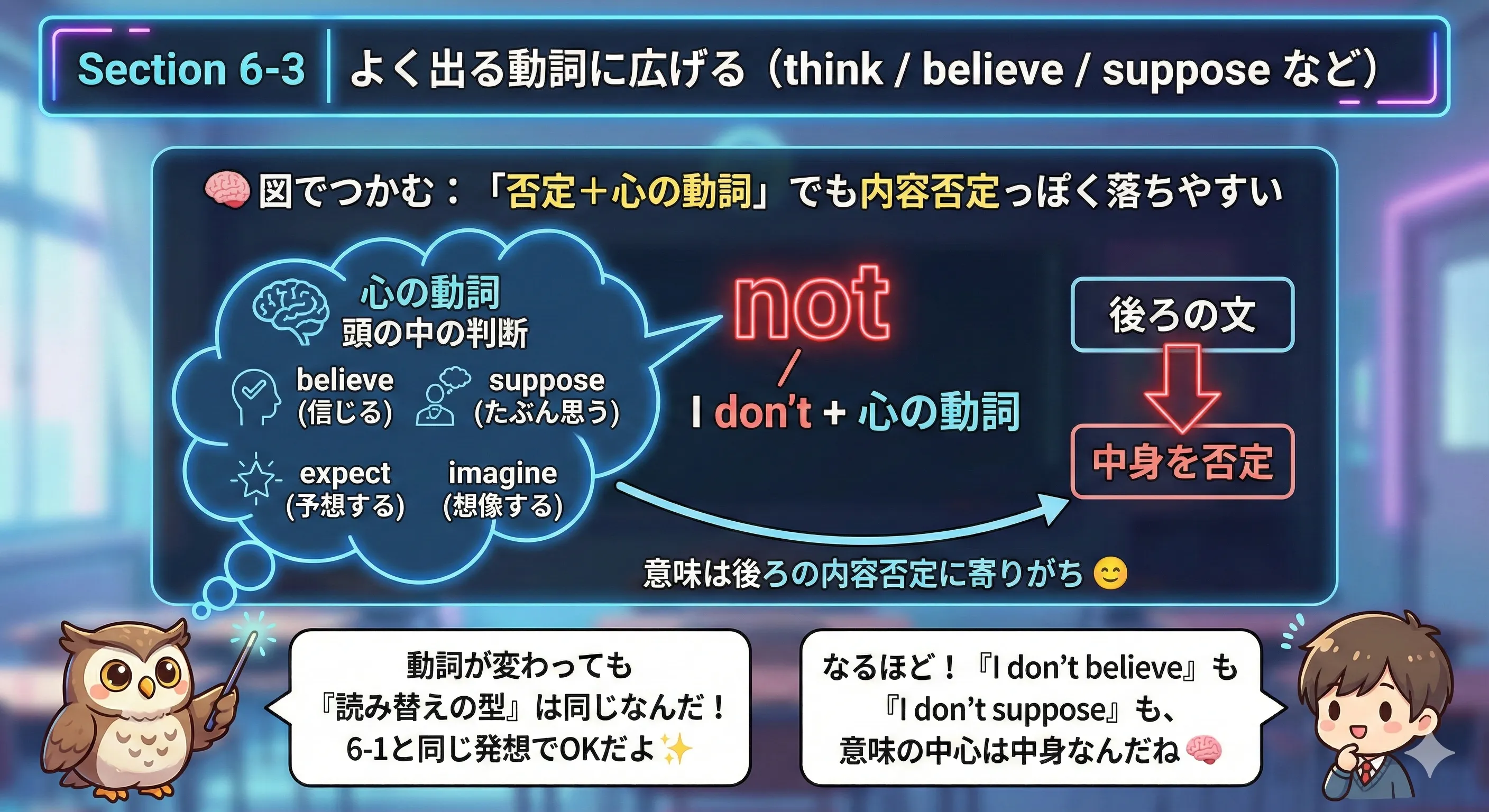
I don’t + 心の動詞(見た目の否定)
→ でも意味は “後ろの内容” の否定に寄りがち※ “寄りがち”=そうなることが多い、ということ(100% ではありません)
🎯 ゴール宣言:動詞が変わっても「読み替えの型」は同じ
ゴールはカンタンです😊
動詞が変わっても、
「あ、これ 6-1 の読み替えと同じだ!」と気づけるようになること✨
そうすると、初見の文でもグッと読みやすくなります。
-
I don't believe .../I don't suppose ...を見ても、 意味の中心をサッとつかめる - 「否定が前」でも、内容否定として自然に読める
- 会話で やわらかい否定のバリエーションが増える
ここまで来たあなたはもう “読み替え脳” が育ってます😊✨ 今日はそのスキルを 他の動詞にもコピーするだけ!
I don't believe he is serious.
(彼が本気だとは思いません。)※だいたい「本気じゃない」寄り
believe(信じる)は “確信寄り” の think みたいなイメージです。
I don't suppose she knows.
(彼女は知らないと思います。)※控えめな否定(やんわり)
suppose は「たぶん〜だと思う」っぽい、軽めの予想に合います。
I don't expect it will be easy.
(それは簡単にはならないと思います。)※現実的な見通し
expect は「そうなる見込み」=予定・予測でよく使います😊
🔁 まずは共通ルール:否定+心の動詞 → 内容否定っぽく読む
心の動詞(思う・信じる・想像する・予想する系)が否定になると、 意味は 後ろの内容(文)の否定に寄りやすいです😊 ※ “寄りやすい”=そう受け取られることが多い、ということ(いつも必ずではありません)
I don't + [think / believe / suppose / imagine / expect] + (that) S V ...
「I don't + 心の動詞」= “内容が違うかも” サイン
迷ったら、後ろの文に not を足したイメージで読んでみましょう(頭の中だけでOK😊)
I don't imagine he has much time.
(彼にはあまり時間があるとは思いません。)※だいたい「時間があまりない」寄り
imagine(想像する)は「たぶん〜じゃない」の推測にも使えます。
I don't believe this is true.
(これは本当だとは思いません。)
believe は「信じる」なので、think より少し強めに聞こえることがあります。
I don't expect they’ll agree.
(彼らが賛成するとは思いません。)※だいたい「賛成しない」寄り
🧠 believe:少し“確信寄り”の think(信じる=強めの思う)
believe は「信じる」なので、
think より 確信(かくしん)が少し高めに聞こえやすいです😊
でも 否定形になると、
6-1 と同じ発想で
「後ろの内容を信じない」=内容否定寄り
で読めることが多いです。
※ 確信=「かなりそうだと思っている気持ち」/寄り=そうなることが多い(100%ではない)
I think ...
(私はそう思う)
I believe ...
(私はそう信じる)
I don't believe + 文 = 「(その文は)本当だと思わない」
→ 日本語ではだいたい「〜じゃないと思う」寄りになりやすいです。
I don't believe he is telling the truth.
(彼が本当のことを言っているとは思いません。)※だいたい「本当のことを言ってない」寄り
I don't believe this plan will work.
(この計画がうまくいくとは思いません。)※だいたい「うまくいかない」寄り
I don't believe she knows about it.
(彼女がそれを知っているとは思いません。)※だいたい「知らない」寄り
🌿 suppose:やわらかい予想・控えめな意見(「たぶん〜だと思う」)
suppose は、強く言い切らないタイプの「思う」です😊
「たぶん〜かな」「そうかもしれないけど…」みたいな控えめな空気が出やすいので、
会話で やわらかく否定したいときに便利です✨
※ 控えめ=自信が100%じゃない感じで、やさしく言うこと
I (don't) suppose ...
(たぶん〜だと思う / たぶん〜じゃないと思う)
I don't suppose + 文 = 「(その文は)たぶん違うと思う」
→ 日本語では「〜じゃないと思うな」みたいに、ふわっと否定になりやすいです😊
I don't suppose he’ll come today.
(彼は今日は来ないと思います。)※控えめな予想
I don't suppose this is a good time.
(今は良いタイミングじゃないと思います。)※角が立ちにくい
I don't suppose you remember me.
(私のこと、覚えてないですよね。)※控えめでやさしい聞き方
📅 expect:予想・見込み(現実的な見通し)
expect は「そうなる見込み(みこみ)」というイメージで、
現実的な予測に強い動詞です😊
なので仕事・予定・結果の見通しなどでよく出ます。
否定形 I don't expect ... は、6-1 と同じで
“後ろの内容が起きない見込み”
と読めることが多いです。
※ 見込み=「たぶんこうなる」という現実的な予想
I don't expect + (that) S will ...
expect は「感想」より 予定・結果・数字に強いです。
(例:時間 / 値段 / 同意 / 進み具合)
I don't expect it will take long.
(長くはかからないと思います。)※「長くかかる見込みは低い」
I don't expect him to agree.
(彼は賛成しないと思います。)※同意する見込みが低い
expect + 人 + to ...(〜すると思う)もよく出ます😊
I don't expect the price to drop soon.
(値段はすぐには下がらないと思います。)※下がる見込みが低い
🙂 imagine / guess:軽めの推測(断言しない便利さ)
imagine は「想像する」、guess は「たぶんね(当てずっぽうでもOK)」という感じで、
断言しないのが強みです😊
「確実じゃないけど、たぶん…」を気楽に言えるので、会話でとても便利✨
※ 断言しない=言い切らずに、少し余白を残す言い方
-
imagine:想像ベース(根拠が薄くてもOK) -
guess:かなりカジュアル(「たぶんね」) - 否定形でも 6-1 の発想で 内容否定寄りに読めることが多い
はっきり言い切りたくないときは、 guess / imagine を使うと空気がやわらかくなります😊
I don't imagine she’s free today.
(彼女は今日は暇じゃないと思います。)※断言しない推測
I don't imagine this will be cheap.
(これは安くはならないと思います。)※「安いとは想像しにくい」
I guess he won't come.
(たぶん彼は来ないと思う。)※かなりカジュアル
🧭 まとめ:動詞別“温度早見”+迷ったらこの型
ここまでで、心の動詞でも
「否定が前 → 意味は後ろの内容否定寄り」
がよく起きることが分かりました😊
最後に、動詞ごとの “温度(確信の強さ)” をざっくり整理しておきましょう✨
-
確信寄り
believe(信じる) -
標準
think(思う) -
控えめ
suppose(たぶん〜だと思う) -
現実的
expect(見込み) -
軽め
guess/imagine(断言しない推測)
I don't think + 文 がいちばん安全で万能です😊
(角が立ちにくく、会話が続きやすい)
I don't think so.
(そうは思いません。)
I don't believe so.
(そうだとは思いません。)※少し硬め・確信寄り
I don't suppose so.
(たぶんそうじゃないと思います。)※控えめでやさしい
7. 二重否定(打ち消し×打ち消し=強い肯定)
ここでは not / no / never などの「否定」と、
but / without が組み合わさって、
意味がプラス方向に“くるっ”と変わるパターンをつかみます😊
見た目は否定っぽいのに、実は「強めの肯定」になることがあるのがポイントです。
ここでは詳しい説明に入る前に、「まずはざっくりイメージをつかむ」ことを目標にしましょう。
二重否定(否定が2回重なる言い方)は、直訳(そのまま日本語にすること)だと迷いやすいです。
なのでこの章では、「結果としてどっちの意味?」を
素早く判断するコツを身につけます✨
(判断=どっちか決めること)
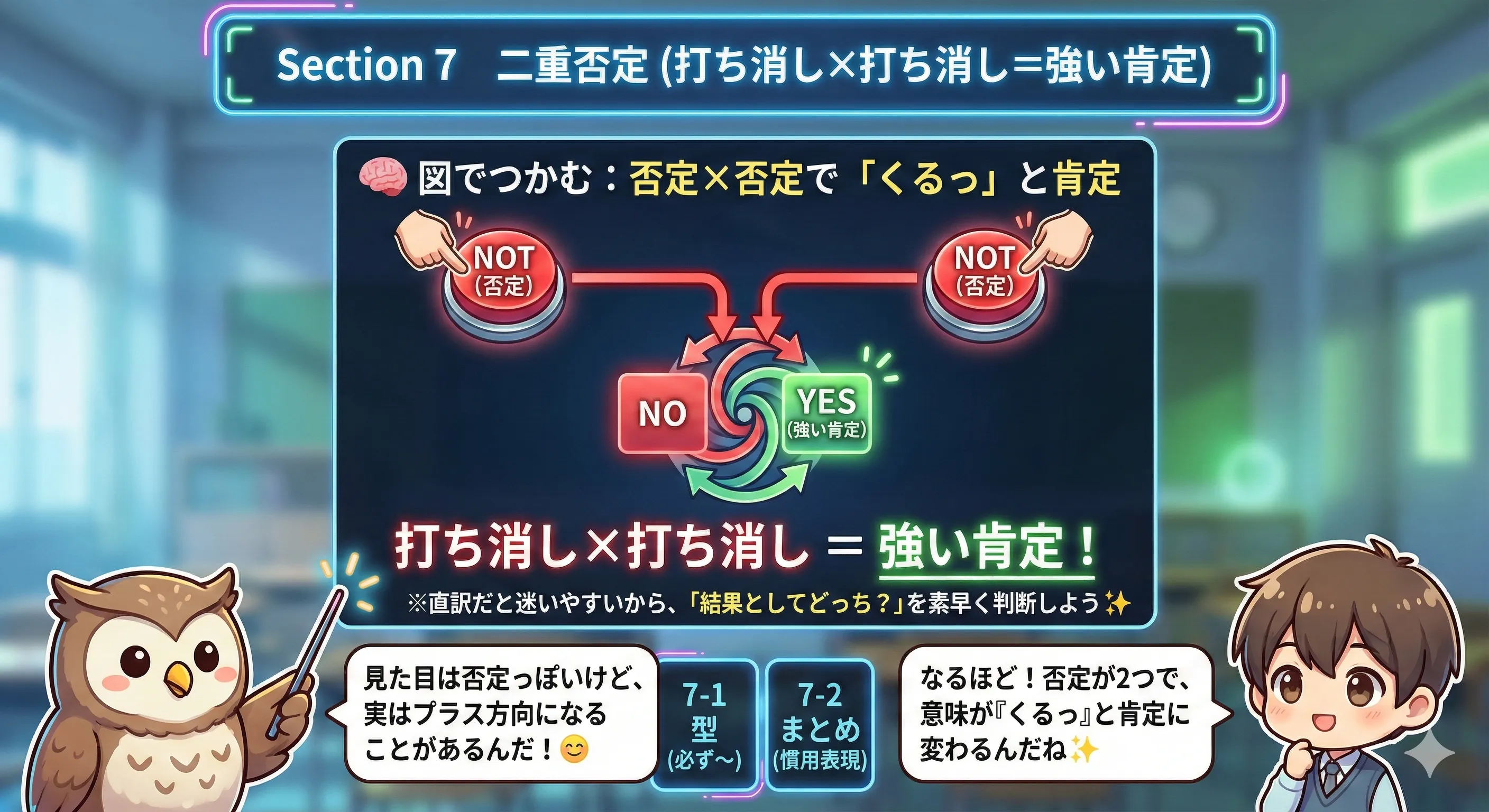
🌟 「否定が2回」なのに前向きになる?(7-1 ~ 7-2 の地図)
二重否定は、ざっくり言うと
「否定 × 否定で、肯定寄りの意味になる」現象です😊
ただし「ただの肯定」ではなく、
“控えめ・含みのある肯定”や
“けっこう強い肯定”
になりやすいのが面白いところです。
※ 含み(ふくみ)=ハッキリ言い切らず、少し余白を残す感じ
-
否定語(
not/no/never)が 2つ見えたら「意味が反転するかも」と気づく。 -
without(〜なしで)やbut(〜以外)と組むと、 「必ず〜する」寄りになることがある。 -
not a few(少なくない)みたいな “決まった言い方(慣用表現)”は、直訳より 意味で覚えるのが近道✨
He is not without talent.
(彼は才能がないわけではない=才能はある。)
not(否定)+ without(〜なし)で「〜なしではない」→「〜がある」へ。※ talent(才能=できる力)
Not a few people agreed.
(賛成した人は少なくなかった=けっこう多かった。)
not a few は「少し」ではなく、“意外と多い/けっこう多い”の感覚。
🧭 次はどちらから読む? 7-1 ~ 7-2 へのナビゲーション
7-1 と 7-2 は、どちらから読んでもOKです😊
「仕組み(型)から入りたい」なら 7-1、
「よく見る言い回しを先に覚えたい」なら 7-2 から進めましょう。
人は「完璧に理解してから」より、 「だいたい分かった状態で先に読んでみる」 方が、脳が勝手にパターンを拾ってくれます😊
二重否定は特に、“見慣れた回数”が増えるほどラクになります。
ここまで読めたあなたは、もう準備はバッチリです✨
この先は「見た瞬間に意味が分かる」が増えていくゾーン。まずは 7-1 か 7-2、気になる方から一歩だけ進めばOKです😊
7-1. not / no / never + but / without(見た目は否定→意味は「必ず」)
このセクションでは、not / no / never などの「否定」と、
but / without が組み合わさったときに起きる
意味の“反転(ひっくり返ること)”
を整理します😊
見た目は「否定」っぽいのに、実は
「〜すると必ず…」
に近い意味になるのが最大のポイントです。
※ 反転=プラス/マイナスが入れ替わるイメージ。むずかしく感じたら「意味が逆になる」くらいでOK!
ここで覚えるのは “単語” というより、 型(いつも同じ形で出るパターン)。 型で見抜けると、読解が一気にラクになります✨
🧭 図でつかむ:否定×否定 → 「必ず」っぽい意味へ
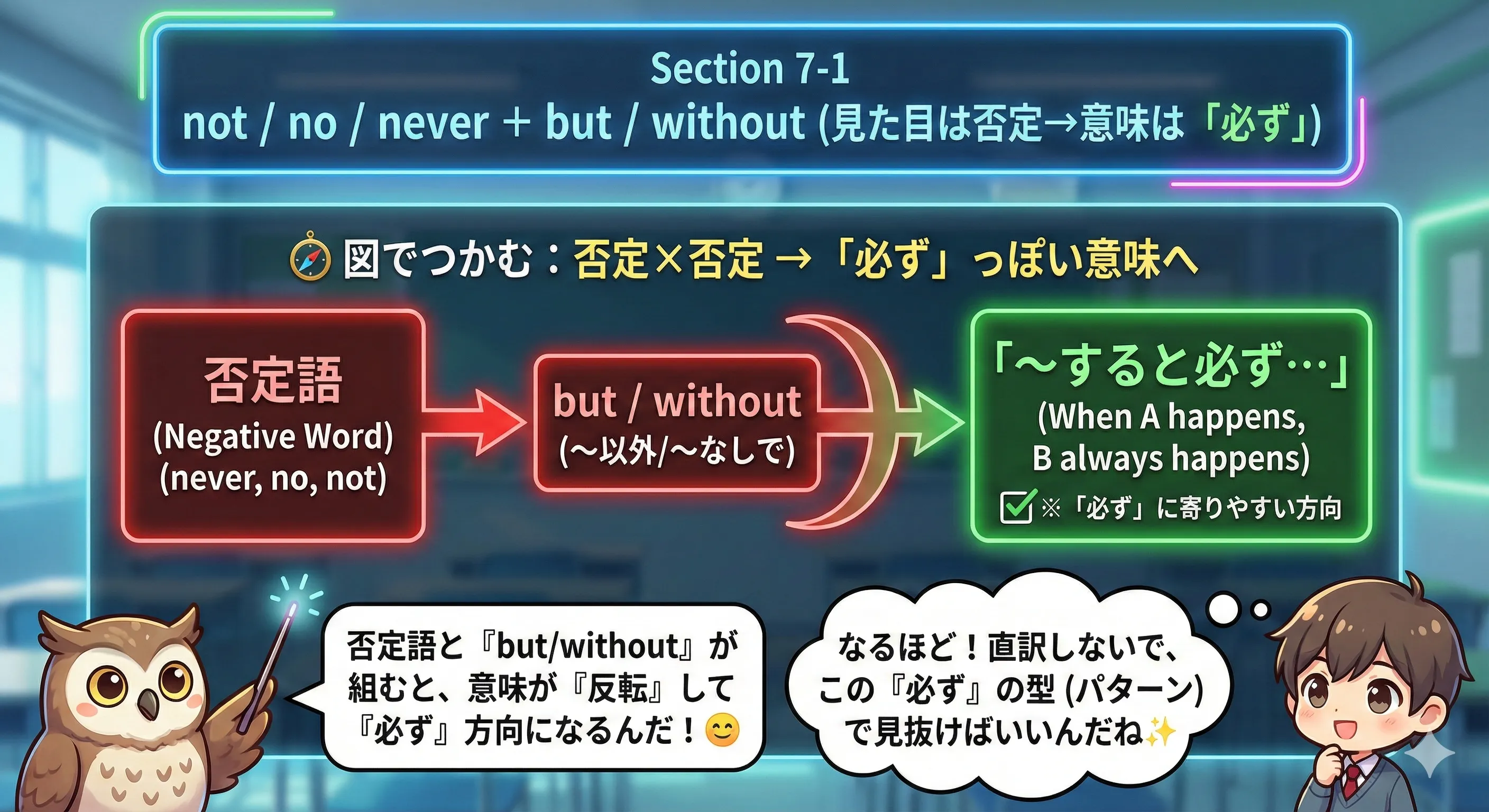
never など)
+ but / without
→ 「〜すると必ず…」 に近い意味に変化😊
※ 「近い意味」=いつも100%同じ訳になるわけじゃないけど、方向として “必ず” に寄りやすい、ということです。
🌟 7-1-0. まず全体像:二重否定は「必ず」に聞こえることがある
まず大切なのは、「否定がある=マイナスの意味」と
決めつけないこと😊
never(決して〜ない)や no(〜ない)などの否定語があっても、
without(〜なしで)や but(〜以外)と組むと、
「結局、必ずこうなる」
という方向に意味が動くことがあります。
※ 決めつけ=早とちり(はやとちり)してしまうこと
never ... withoutno ... but (to)英文を見た瞬間に「直訳」じゃなくて、 “意味の方向(プラス?マイナス?)”をサッと決められるようになることです😊
I never go out without my keys.
(外出するときは、鍵を必ず持っていきます。)
never + without を見たら「毎回セット!」の合図。
There is no choice but to wait.
(待つしかありません。)
no + but は「他に選択肢がない」→ 結果としてそうなる。
She never leaves the house without her phone.
(彼女は家を出るとき、スマホを必ず持っていきます。)
🏆 7-1-1. 最重要パターン:never ... without=「〜すると必ず…」
never ... without は、
直訳すると「〜なしでは決して…ない」ですが、
実際の意味は
「〜すると必ず…」
に近いことが多いです😊
※ 直訳(ちょくやく)=単語をそのまま置き換える訳。ここでは直訳より「意味」を優先!
S + never + V ... without + ~ing / 名詞
Whenever S V, S always ... (whenever=〜するたびに / always=いつも)
never を見て「絶対しない」と思い込むとミスりやすいです。“without があるか?” をチェックして、 「毎回セットで起きる話」だと判断しましょう😊
I never drink coffee without milk.
(私はコーヒーを飲むとき、ミルクを必ず入れます。)
I never see him without smiling.
(彼を見ると、私は必ず笑ってしまいます。)
We never meet without talking about work.
(私たちは会うと、仕事の話を必ずします。)
meet(会う)+ without(〜なしで)→「会うたびにセットで起きる話」
He never leaves without saying goodbye.
(彼は帰るとき、別れのあいさつを必ずします。)
never + without を見て「必ず!」に変換できたら、 もう読解の準備はバッチリです😊
🧩 7-1-2. 似た型:not ... without=「〜するとだいたい…/ほぼ必ず…」
not ... without は、
「〜なしで…することはない」という形なので、
結果として
「(毎回ではなくても)たいてい一緒に起きる」
という意味になりやすいです😊
※ たいてい=だいたい毎回、というイメージ(100%と決めつけないのがコツ)
S + do not / cannot / did not ... without + ~ing / 名詞
S always / usually ... (always=いつも / usually=たいてい)
否定(not)+ without がセットで出たら、 「〜しないで…することは(ほぼ)ない」 → つまり「(だいたい)必ず〜する」と判断しやすいです😊
I can't leave without checking my wallet.
(私は財布を確認せずに出かけることはまずありません=出かけるときはだいたい確認します。)
can't は「できない」→ 実際は「〜せずにはいられない」寄りに聞こえることもあります。
She didn't go to bed without setting an alarm.
(彼女はアラームをセットせずに寝ることはありませんでした=寝る前にだいたいセットしました。)
We don't start meetings without a quick check-in.
(私たちは簡単な確認なしに会議を始めることはほとんどありません=だいたい最初に確認します。)
don't start ... without は「〜なしで始めない」→「(だいたい)必ず〜してから」。
Not a day goes by without me learning something new.
(新しいことを学ばない日がほとんどない=ほぼ毎日、何か学んでいます。)
not + without を見て 「否定じゃなくて(ほぼ)肯定だ!」と切り替えられたら、もうかなり強いです😊
🚪 7-1-3. 逃げ道なし:no ... but (to)=「〜するしかない」
no ... but は
「…以外ない」という意味で、
結果として
「〜するしかない」
に直結します😊
ここでの but は
(でも)ではなく、
「〜以外」 のニュアンスです。
※ ニュアンス=細かい感じ・空気感(完全に1語で言い切れない意味)
There is no + 名詞 + but to do
(例:no choice / no option)
S + have no + 名詞 + but to do
must / have to / can only (must=〜しなければならない / can only=〜するしかない)
but を「しかし」と読んでしまうと意味が崩れます。「…以外ない」=「〜するしかない」 とセットで覚えましょう😊
There was no choice but to cancel the trip.
(その旅行をキャンセルするしかありませんでした。)
no choice=「選択肢がない」→「やるしかない」へ直結。
I have no option but to accept the offer.
(その提案を受け入れるしかありません。)
option=選べる案(選択肢)。「ない」なら、やる方向が決まる😊
She had no way but to tell the truth.
(彼女は本当のことを言うしかありませんでした。)
no way=「方法がない」→「それをするしかない」。
We had no plan but to try again.
(もう一度挑戦するしかありませんでした。)
「しかない」を英語でスッと言えたら強い!
no + 名詞 + but to do は、覚える価値が高い型です😊
⚡ 7-1-4. 見抜きコツ:直訳をやめて「言い換え」で瞬時に判断する
二重否定は、直訳(単語をそのまま置き換える訳)をすると迷いやすいです😵💫
そこでおすすめなのが、「言い換え(別の言い方に変える)」で
一瞬で意味を決める方法!
とくに 7-1 の型は、次の3つに変換するとスッキリします😊
| 見つけた型 | まずの言い換え | 日本語の感覚 |
|---|---|---|
🧩 never ... without
|
✅ Whenever ... / always ...
|
「〜すると必ず…」 |
🧩 not ... without
|
✅ usually ... / almost always ...
|
「〜するとだいたい…」 |
🚪 no ... but (to)
|
✅ can only ... / have to ...
|
「〜するしかない」 |
否定語を見ても焦らず、 「変換3点セット」で意味を決めよう!
🧠 1秒で言い換え練習(読んだら即変換!)
I never go out without my keys.
(外出するとき、鍵を必ず持っていきます。)
We don't start meetings without a quick check-in.
(私たちは簡単な確認なしに会議を始めることはほとんどありません。)
There was no choice but to wait.
(待つしかありませんでした。)
She never leaves without saying goodbye.
(彼女は帰るとき、必ず別れのあいさつをします。)
英文を見た瞬間に、頭の中で always / usually / can only に置き換えられたら、 7-1 はもう勝ちです😊
🧯 7-1-5. ありがちミス:否定っぽさに引っぱられるポイント
7-1 の型は、
「否定語が見える」せいで、
ついマイナス方向に読んでしまうのが最大の落とし穴です😵💫
ここでは “よくあるミス” を先に知って、回避できるようにします。
without が続くと、意味は「毎回セット」になりやすいのに、 そこで止まってしまうパターン。
I never go out without my keys.
(外出するとき、鍵を必ず持っていきます。)
no ... but の but は
「〜以外」の but。
ここを間違えると意味が崩れます。
There is no choice but to wait.
(待つしかありません。)
例:don't ... without を
「〜しないで…する」と読んでしまう。
実際は「(たいてい)〜してから…する」になりやすいです。
We don't start meetings without a quick check-in.
(私たちは簡単な確認なしに会議を始めることはほとんどありません。)
never ... without は「必ず」寄り、
not ... without は「だいたい」寄り。
強さの違いを意識すると自然になります😊
never...without → always
not...without → usually / almost always
7-1 のミスはほとんど 「直訳で止まる」ことが原因です。
見つけた瞬間に always / usually / can only に変換してしまえばOK😊
📌 7-1-6. ミニまとめ:7-1 の型を1枚で整理(覚え方つき)
| 型(見た目) | 意味(日本語) | 一瞬の言い換え | 覚え方(ミニ) |
|---|---|---|---|
🏆 never ... without
|
「〜すると必ず…」 |
Whenever / always
|
「never と without が並んだら 毎回セット」 |
🧩 not ... without
|
「〜するとだいたい…」 |
usually / almost always
|
「not + without は “ほぼ一緒” の合図」 |
🚪 no ... but (to)
|
「〜するしかない」 |
can only / have to
|
「no で道をふさぐ → 1本に決まる」 |
- never + without を見たら → always!
- not + without を見たら → usually!
- no + but を見たら → can only!
7-1 は「否定に見えるのに、意味が前向き」に変わるのがポイント。
1つでも瞬時に言い換えできたら、もう読解力が伸びています😊
7-2. 二重否定の慣用表現(not a few など “少なくない=けっこう”)
7-2 は、二重否定が入った
「決まった言い方(慣用表現=セットで覚える表現)」
をまとめるセクションです😊
たとえば not a few は直訳だと「少なくない」ですが、意味としては
「けっこう多い」に近いのがポイント✨
※ 直訳(ちょくやく)=単語をそのまま置き換える訳。ここでは「意味」でつかむのがコツ!
7-1 の「型(形)」とはちがって、7-2 は “言い回しごと暗記するとラク” なものが中心です。読むスピードも上がります😊
🎯 図でつかむ:直訳より「意味」を先に取ろう
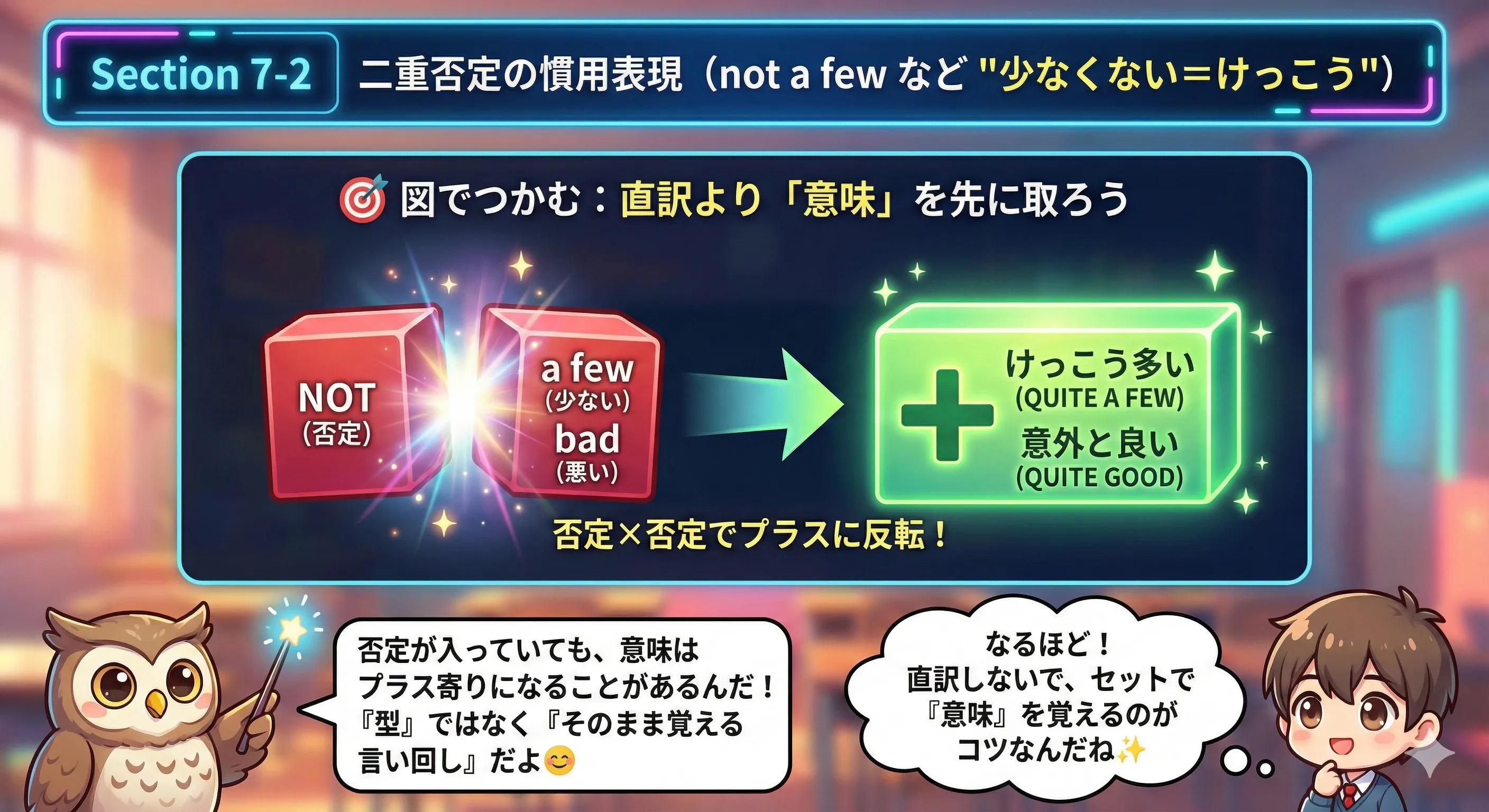
7-2 は「型」ではなく、 “そのまま覚える言い回し”を増やすゾーンです✨
🚪 7-2-0. 入口:慣用表現は「直訳しないで意味で覚える」
慣用表現(かんようひょうげん=セットで使う決まり文句)は、
直訳すると遠回りになりがちです😵💫
だから 7-2 では、
「この形を見たら、この意味!」
で覚えていきます😊
-
not a fewを見たら → 「けっこう多い」 -
not uncommonを見たら → 「わりとよくある」 -
not badを見たら → 「意外と良い」
「少なくない」→「少ない?多い?」みたいに、頭が一瞬止まりがち。
でも慣用表現は
“意味の丸暗記”
がいちばん速いです😊
英語は「意味が分かる回数」が増えるほどラクになります。
まずは“だいたいの意味”でOK!あとから精度が上がっていきます😊
📦 7-2-1. 量が多い:「少なくない=けっこう多い」系
まずは最重要のグループ!
not a few / not a little / no small / no little などは、
直訳だと「少なくない」ですが、意味としては
「けっこう多い / かなり / 意外と」
の方向に寄ります😊
※ “量” は人数・時間・影響・安心感など、いろいろに使えます。
| 表現 | 意味(日本語) | ニュアンス(やさしく) |
|---|---|---|
🧩 not a few |
けっこう多い | 「意外と多いよ」という感じ |
🧩 not a little |
かなり(量・時間) | 「思ったよりある/かかる」 |
🧩 no small |
大きい(影響など) | 「小さくない=重要」 |
🧩 no little |
かなり(感情など) | 「少しじゃない=けっこう」 |
「少なくない」ではなく、“多い寄り”に倒して読むとスムーズです😊
not / no + “少ない系” が来たら、 だいたい 「多い」 に反転!
Not a few people agreed.
(賛成した人は少なくなかった=けっこう多かった。)
It took not a little time to fix it.
(直すのに少なからぬ時間がかかった=けっこう時間がかかった。)
not a little は「少しじゃない」→ かなり、の感じ😊
She has no small influence in the team.
(彼女はチームで小さくない影響力がある=かなり影響力がある。)
He felt no little relief.
(彼は少なからぬ安心を感じた=かなりホッとした。)
not / no + “少ない系” を見たら、意味はだいたい 「多い・大きい」へ反転! ここが分かると、英文が一気に読みやすくなります😊
🔁 7-2-2. よくある:「珍しくない=わりとよくある」系
rare(珍しい)や uncommon(よくあるわけではない)などの
「珍しさ」を表す語を、否定(not)すると、
意味は 「わりとよくある」 に寄ります😊
※ わりと=思ったより多め(100%じゃないけど、けっこうある)
| 表現 | 意味(日本語) | 言い換え(英語) |
|---|---|---|
🔹 not uncommon |
珍しくない(わりとよくある) | often / quite common |
🔹 not unusual |
よくある(普通にある) | sometimes / normal |
🔹 not rare |
珍しくない(起こりうる) | it happens / can happen |
🔹 not infrequent |
わりとよく(意外と多い) | fairly often |
「珍しくない」=「毎日ある!」ではなく、 “わりとある / よくある部類” くらいの温度感で読むと自然です😊
It’s not uncommon to work overtime in this industry.
(この業界で残業するのは珍しくありません=わりとよくあります。)
not uncommon は “common(よくある)寄り” と覚えると速い😊
It’s not unusual for him to reply late.
(彼の返信が遅いのはよくあることです。)
unusual=普通じゃない(変わってる)。not がつくと「普通にある」寄り。
Such mistakes are not rare among beginners.
(初心者の間では、そういうミスは珍しくありません。)
not rare は “rare(レア)じゃない” → 「あるある」寄り😊
Delays are not infrequent during the rainy season.
(雨の季節は遅延がわりとよく起こります。)
not + 珍しい系 は 「わりとある」方向に反転して読む!
🌟 7-2-3. 評価・感想:「悪くない=けっこう良い」系
英語の not bad は、
直訳の「悪くない」よりも
「けっこう良い / 意外といいね」
のニュアンスで使われることが多いです😊
断言しすぎずに、やわらかく褒める感じが出せる便利表現✨
※ ニュアンス=言葉の温度感(強い/弱い・やわらかい/きっぱり など)
| 表現 | 意味(ざっくり) | 温度感(やさしく) |
|---|---|---|
😊 not bad |
意外と良い | 合格点〜ちょい上 |
👍 not too bad |
まあまあ良い | 気楽な返事 |
✨ not half bad |
なかなか良い | 少し強めに褒める |
😮💨 not terrible |
思ったほど悪くない | 控えめ(ホッとした感じ) |
文脈によっては「まあまあ(すごく良いわけではない)」にも聞こえます。
でも基本は プラス評価 と考えてOK😊
The movie was not bad.
(その映画は悪くなかった=意外と良かった。)
Your idea is not too bad.
(そのアイデア、悪くないね=けっこういいね。)
not too bad は「まあまあ良い」の軽い褒め方😊
He did not half bad in the interview.
(彼は面接でなかなかやった=けっこううまくやった。)
not half bad は “半分どころじゃない=かなり良い” のイメージ✨
The test wasn’t terrible.
(テストはひどくはなかった=思ったよりマシだった。)
not + 悪い系 は 「意外と良い」の合図😊
断言しすぎずに褒めたいときに便利です✨
🔮 7-2-4. 可能性:「ありえなくない=ありえる」系
impossible(不可能)や unlikely(起こりそうにない)など、
“できなさそう” な語に not が付くと、
意味は 「可能性はある(ゼロじゃない)」 に反転します😊
※ 「ゼロじゃない」=少しでも可能性がある、ということ(成功が確定!ではありません)
| 表現 | 意味(日本語) | 言い換え(英語) |
|---|---|---|
🟦 not impossible |
不可能ではない(可能性はある) | possible / can be done |
🟦 not unlikely |
ありえなくない(起こりうる) | quite possible |
🟦 not inconceivable |
考えられなくはない | it can happen |
🟦 not out of the question |
ありえない話ではない | still possible |
7-2-4 は「できる!」ではなく 「できる可能性はある」くらいの控えめさ。
だから文章が丁寧・大人っぽく聞こえます😊
It’s not impossible to finish today.
(今日中に終わらせるのは不可能ではありません=可能性はあります。)
It’s not unlikely that he will come.
(彼が来るのはありえなくはありません=来る可能性はあります。)
unlikely=起こりそうにない。not で「起こりうる」方向へ😊
It’s not inconceivable that prices will rise.
(物価が上がるのは考えられなくはありません=起こりうることです。)
A win is not out of the question.
(勝つこともありえない話ではありません=可能性はあります。)
7-2-4 は「断言しない前向き」!
可能性はある、くらいのやさしい肯定です😊
🧭 7-2-5. まとめ&使い分け:「強い肯定」ではなく「控えめ肯定」が多い
7-2 の二重否定は、7-1 のように「必ず!」と強く言うものより、
“やわらかく肯定する”表現が多いです😊
だから文章が丁寧に見えたり、会話で角が立ちにくくなったりします✨
※ 角が立つ=言い方がきつく聞こえること
🎚️ “肯定の強さ” メーター(だいたいの目安)
| グループ | 代表表現 | 意味(日本語) | 温度感 |
|---|---|---|---|
| 📦 量が多い | not a few / not a little |
けっこう多い/かなり | 意外と多い |
| 🔁 よくある | not uncommon / not unusual |
わりとよくある | 普通にある |
| 🌟 評価 | not bad / not half bad |
意外と良い/なかなか | 控えめに褒める |
| 🔮 可能性 | not impossible / not unlikely |
可能性はある | 断言しない前向き |
二重否定は「強く言い切る」より、 “やさしくプラスに寄せる”のが得意な表現😊
「言い切りを避けたい」場面で、 not impossible / not unlikely のように “可能性を残す” 言い方がよく使われます😊
not bad は “褒めすぎない褒め方” として超便利😊 相手に圧をかけずに、いい評価を伝えられます。
7-2 は「否定があるのに、意味はプラス寄り」なセット表現がたくさん!
直訳より、“意味の丸暗記”で読むスピードが伸びます😊
8. 否定を表す慣用表現(会話・読解で頻出)
ここでは、否定の意味を作る
慣用表現(決まり文句)をまとめて身につけます😊
たとえば anything but は not が出てこないのに、
「全然〜じゃない」 の意味になったりします。
ここでは詳しい説明に入る前に、
「まずはざっくりイメージをつかむ」ことを目標にしましょう。
むずかしい用語が出たら、
(小学生にもわかる言いかえ)
をいっしょに添えます。たとえば「否定語(not や never みたいに“ちがうよ”と言う語)」などです😊
🧩 図でつかむ:否定は「not」だけじゃない!

🗺️ 次はどちらから読む? 8-1 ~ 8-2 へのナビゲーション
8-1 と 8-2 は、どちらから読んでもOKです😊
「見た目にだまされた経験がある」なら 8-1、
「決まり文句をスッと理解したい」なら 8-2 から進むのがおすすめです。
-
否定語がないのに否定:
anything butみたいに、見た目がポジティブでも意味はネガティブになることがある😳 -
否定語がある慣用表現:
cannot help -ingのように “セットで意味が決まる” ものは、覚えると読解が速い🚀 - ここまで読めたあなたは、もう準備はバッチリです✅(あとは少しずつ数を増やすだけ!)
It’s anything but easy.
(それは全然簡単じゃない。)
anything but は「なんでも〜以外」→ 意味としては「全然〜じゃない」に寄ります😊
人は「完璧に分かってから始める」よりも、 「だいたい分かった状態でまず使ってみる」 方が、記憶に残りやすく学習が続きやすいです😊
まずは “意味を1つつかむ” だけでOK。少しずつ増やしていきましょう!
8-1. 否定語なしで否定する慣用表現(anything but など)
このパートは、not や never みたいな
否定語(“ちがうよ” を表す語)
が見えないのに、意味は
否定(〜じゃない)
になる表現を集めたコーナーです😊
たとえば anything but は、見た目はふつうでも
意味は「全然〜じゃない」に一気に反転します。
ここではまず、細かい理屈よりも「見た瞬間に意味が出る」感覚を育てましょう✨
むずかしい用語が出たら、
(小学生にもわかる言いかえ)
をいっしょに添えます。
例:慣用表現(決まり文句)
🧩 図でつかむ:「not がないのに否定」ってどういうこと?
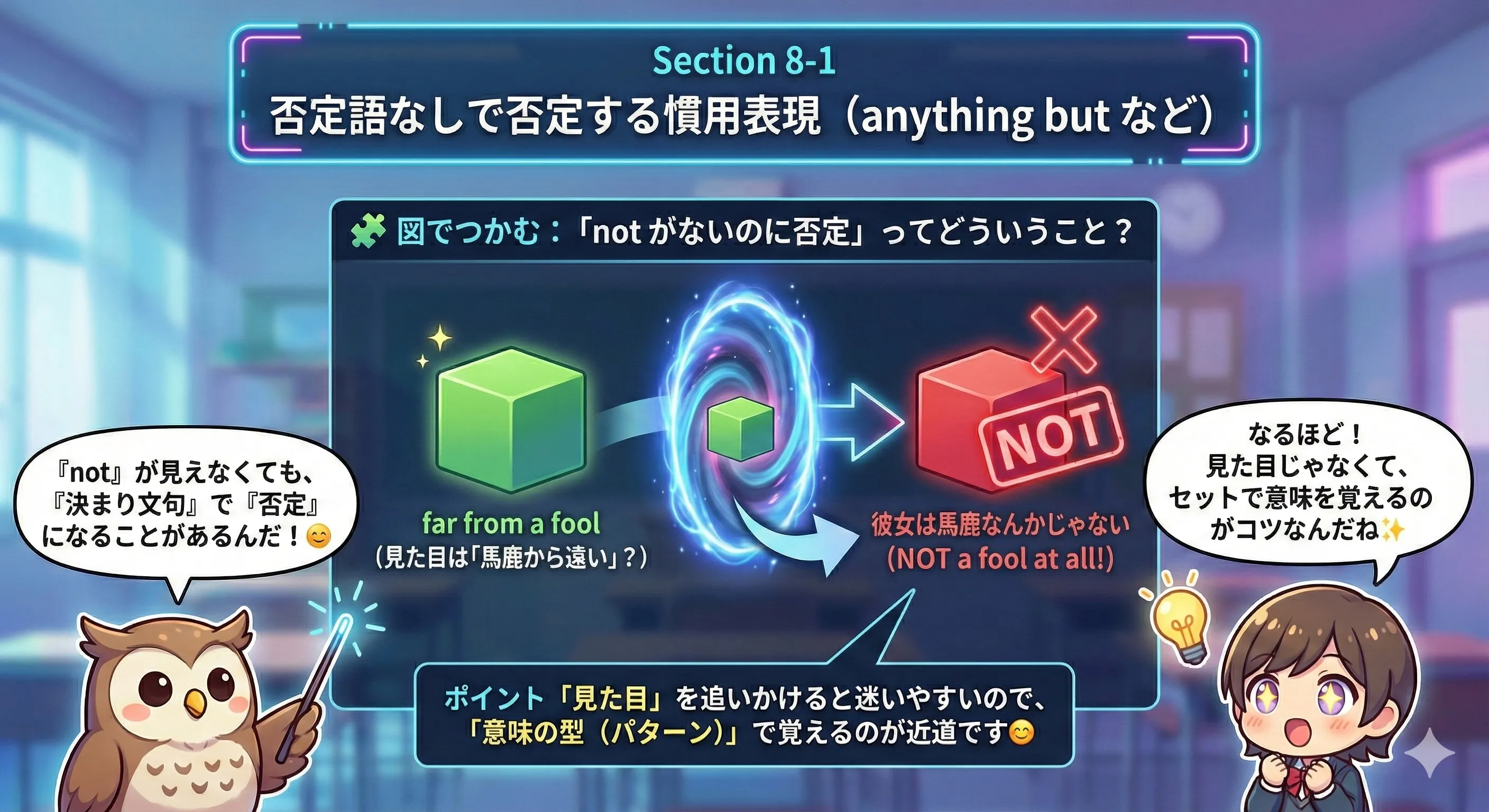
🚪 8-1-0. 入口:否定語がなくても否定になる(見た目トラップ)
英語の否定は not だけではありません😳
決まり文句(慣用表現)の中には、
否定語が見えなくても、意味としては
「全然〜じゃない」や
「まだ〜していない」
になるものがあります。
まずは「直訳(単語をそのまま訳す)」をやめて、
見た瞬間に意味が出る
ことを目指します😊
anything but を見て
「anything=何でも?」で止まると迷子になりがち😵💫
8-1 は “丸ごと意味で暗記” が最短ルートです。
“見た目トラップ” は、気づいた瞬間に弱点が消えます😊
ここまで読めたあなたは、もう準備はバッチリです✅
🏆 8-1-1. 最重要:anything but ~(決して~ではない/全然~じゃない)
anything but は、見た目は「anything=何でも」ですが、
意味としては 「全然〜じゃない」 に近い表現です😊
※ but はここでは「しかし」ではなく
「〜以外(except)」 のイメージ。
| 形 | 意味(日本語) | 言い換え(英語) |
|---|---|---|
🧩 anything but + 形容詞 |
全然〜じゃない | definitely not / by no means |
🧩 anything but + 名詞 |
決して〜ではない | not a / far from |
anything but を見たら、まず
「全然〜じゃない」
と決めてOK😊
anything but は
“anything” に引っぱられないのが大事!ここは丸ごと 「全然〜じゃない」 と覚えるのが最速です😊
He is anything but a liar.
(彼は決してうそつきではない。)
It’s anything but easy.
(それは全然簡単じゃない。)
easy(簡単)を否定して、「むしろ難しい」方向に寄せる言い方です😊
Her explanation was anything but clear.
(彼女の説明は全然分かりやすくなかった。)
clear(明確)を強く否定して「分かりにくい」寄りにします😊
This is anything but a small problem.
(これは小さな問題なんかじゃない=大きな問題だ。)
anything but を見たら、まず
「全然〜じゃない」に変換!“anything” に引っぱられなければ、読解が一気に速くなります😊
📏 8-1-2. 強い否定の距離感:far from ~(少しも~でない)
far は「遠い」なので、far from は
「〜から遠い」というイメージです😊
そこから転じて、意味は
「少しも〜でない」「全然〜じゃない」
になります。
※ 距離感=どれくらい離れてるか、という感覚(= 全然ちがう!)
| 形 | 意味(日本語) | 言い換え(英語) |
|---|---|---|
📌 far from + 名詞 |
〜とは言えない(全然ちがう) | anything but / not a |
📌 far from + 形容詞 |
少しも〜でない | not at all / by no means |
📌 far from + V-ing / 過去分詞 |
〜どころか…ない | instead of(の逆感覚) |
far from を見たら、
「全然〜じゃない」
に寄せて読むと迷いません😊
far(遠い) → 「到達してない」 → 「全然ちがう」 😊
She is far from a fool.
(彼女は馬鹿なんかじゃない。)
I’m far from ready.
(私は準備ができているとは言えない=全然できていない。)
ready(準備OK)から “遠い” → 「まだまだ」😊
The result is far from ideal.
(結果は理想にはほど遠い=全然理想的じゃない。)
He is far from satisfied with the deal.
(彼はその取引に満足しているとはとても言えない。)
far from は「遠い」→
「全然〜じゃない」に変換😊
🕊️ 8-1-3. 「~がない状態」=否定の近道:free from ~(~がなくて)
free は「自由」。
free from は
「〜から自由」なので、
意味はズバリ
「〜がない」「〜の心配がない」
です😊
※ “心配” みたいに目に見えないものにも使えます(ストレス・偏見など)
| 形 | 意味(日本語) | よく一緒に出る語 |
|---|---|---|
✅ be free from + 名詞 |
〜がない | stress, worry, bias, additives |
✅ free from + 名詞(形容詞的) |
〜のない | error, defect, pollution |
free from は without(〜なしで)に近い、と覚えると速い😊
free(自由)=「縛るものがない」 → 「〜がない」😊
He is free from money worries.
(彼はお金の心配がない。)
This product is free from additives.
(この商品は添加物が入っていない。)
additives=添加物(食品などに足すもの)
Try to stay free from stress.
(ストレスのない状態でいよう。)
The report should be free from bias.
(その報告は偏りがないべきだ。)
free from は「〜から自由」→
「〜がない」に変換😊
😢 8-1-4. 否定の結果:「努力したけどダメ」=in vain(むだに)
in vain は「むだに」。
つまり、頑張ったのに結果が出なかった という
否定の結末(=うまくいかない) を表します😵💫
※ “結末”=最後の結果(ハッピーエンドかどうか、みたいなイメージ)
| よくある形 | 意味(日本語) | 言い換え(英語) |
|---|---|---|
🔸 try in vain to ... |
〜しようとしたがダメだった | try ... but fail |
🔸 search in vain for ... |
探したが見つからなかった | look for ... but can't find |
🔸 in vain(文末) |
むだに/効果なく | without success |
in vain を見たら、
「結果は出なかった」 を先に取るとスムーズです😊
スペルは
in vain(vain)です。vail と書くのは誤りなので、ここでしっかり修正して覚えましょう✅
She tried in vain not to cry.
(彼女は泣かないようにしたが、むだだった=結局泣いてしまった。)
I searched in vain for my keys.
(鍵を探したが見つからなかった=探すのはむだだった。)
search=探す(しっかり探す)
They argued in vain.
(彼らは議論したが、結論は出なかった=むだだった。)
He apologized in vain.
(彼は謝ったが、許してもらえなかった=むだだった。)
in vain は「むだ」=
結果が出ない(否定の結末) を表す!
⏳ 8-1-5. まだ起きていない否定:be yet to ~(まだ~していない)
yet は「まだ」。
be yet to + 動詞 は
「まだ〜していない」
という意味になります😊
※ “未完了(みかんりょう)”=まだ終わっていない、ということ
| 形 | 意味(日本語) | 言い換え(英語) |
|---|---|---|
🟦 The time is yet to come. |
その時はまだ来ていない | The time hasn't come yet. |
🟦 We are yet to decide. |
私たちはまだ決めていない | We haven't decided yet. |
🟦 is yet to be + 過去分詞 |
まだ〜されていない | hasn't been ... yet |
be yet to は少し硬めの言い方。意味はシンプルに 「まだ〜していない」 です😊
yet を見たら「まだ」→
“未完了” を疑う!長文で出てきても、ここを押さえると一気に読みやすくなります😊
The best is yet to come.
(最高のものはまだこれからだ=まだ来ていない。)
We are yet to receive a reply.
(私たちはまだ返信を受け取っていない。)
reply=返信(返事)
The final decision is yet to be made.
(最終決定はまだされていない。)
is yet to be made=「まだ作られてない」→「まだ決まってない」😊
The cause is yet to be determined.
(原因はまだ特定されていない。)
be yet to は「まだ」→
未完了(まだ〜していない) の合図😊
🧊 8-1-6. “絶対しない人”を言う否定:the last + 名詞 + to ~(決して~しない)
the last は「最後の」。
でもこの形では、直訳ではなく意味で
「そんなことをする人じゃない(=決してしない)」
と取ります😊
※ “人柄(ひとがら)”=その人の性格や雰囲気のこと
| 形 | 意味(日本語) | よく一緒に出る動詞 |
|---|---|---|
🧩 the last person to + 動詞 |
決して〜しない人 | lie, steal, cheat, complain |
🧩 be the last one to + 動詞 |
自分がそんなことするはずない | judge, blame, say |
the last を見たら、
「強めの否定」が来る合図😊
「最後にそんなことをする人」= “そんなこと絶対しない人”(逆に取る)😊
He is the last person to steal.
(彼は盗みなどする人ではない。)
She is the last person to lie.
(彼女は嘘をつくような人じゃない。)
lie=嘘をつく
I’m the last one to complain.
(私が文句を言うなんてありえない。)
He’s the last man to give up.
(彼があきらめるなんてまずない。)
the last + 名詞 + to は
強い否定(そんなことしない)を一発で言える!😊
🚫 8-1-7. できない原因を表す:too ~ to …(あまりに~なので…できない)
too は「〜すぎる」。
too + 形容詞/副詞 + to + 動詞 は、
“〜すぎる” のせいで
結果としてできない
という否定になります😵💫
※ “原因”=できない理由(重すぎる、若すぎる、速すぎる…など)
| 形 | 意味(日本語) | 言い換え(英語) |
|---|---|---|
🧩 too tired to move |
疲れすぎて動けない | so tired that I can't move |
🧩 too young to drive |
若すぎて運転できない | not old enough to drive |
🧩 too fast to understand |
速すぎて理解できない | so fast that I can't understand |
too を見たら、
「できない結果」までセットで読もう😊
too を「とても」とだけ読むと意味がズレます😵💫ここは必ず 「〜すぎて…できない」 で受け止めましょう。
I was too tired to move.
(疲れすぎて動けなかった。)
She is too young to drive.
(彼女は若すぎて運転できない。)
drive=運転する
The box was too heavy to lift.
(その箱は重すぎて持ち上げられなかった。)
He spoke too fast to understand.
(彼は速すぎて理解できなかった。)
too ... to は
「〜すぎて…できない」がセット!too を見たら “できない結末” まで一気に読みましょう😊
🛑 8-1-8. “できないようにする”の否定:prevent A from -ing(Aが~できないようにする)
prevent は「防ぐ(させない)」です。
prevent A from -ing は
「A が〜するのを止める」なので、
結果として 「A はできない」 につながります😵💫
※ “妨げる(さまたげる)”=邪魔してできなくする、ということ
| 形 | 意味(日本語) | よくある主語(原因) |
|---|---|---|
🧩 prevent A from -ing |
Aが〜できないようにする | rain, injury, rules, nothing |
🧩 Nothing can prevent A from -ing |
何もAを止められない | 強い意志・決意の文で頻出 |
prevent を見たら
「できない方向」へ読む😊
(“邪魔されて無理” のイメージ)
この表現は「否定語がなくても否定になる」タイプです。
prevent を見た瞬間に 「〜できない」が頭に出れば勝ちです😊
Nothing can prevent her from marrying him.
(何事も彼女が彼と結婚することを妨げることはできない。)
The rain prevented us from going out.
(雨のせいで外出できなかった。)
go out=外出する
His injury prevented him from playing.
(ケガのせいで彼はプレーできなかった。)
This rule prevents accidents from happening.
(このルールは事故が起きるのを防ぐ。)
prevent A from -ing は
「Aが〜できないようにする」の型!😊
🧱 8-1-9. “まだ残っている=未完了”の否定:remain to be + 過去分詞(まだ~されていない)
remain は「残る」です。
remain to be + 過去分詞 は
「〜されることが残っている」という形なので、
意味としては
「まだ〜されていない」
になります😊
※ 過去分詞(かこぶんし)= done / decided / solved みたいな “される形”
| 形 | 意味(日本語) | よく出る過去分詞 |
|---|---|---|
✅ issues remain to be solved |
問題がまだ解決されていない | solved, fixed, addressed |
✅ details remain to be decided |
詳細がまだ決まっていない | decided, confirmed |
✅ work remains to be done |
作業がまだ残っている | done, completed |
remain を見たら
「まだ終わってない」の合図😊
(残ってる=未完了!)
長文で
remain to be が出たら、
そこは「まだ〜されていない」ゾーン!未完了を押さえると文の流れが見えやすくなります😊
Several issues remain to be solved.
(いくつかの問題がまだ解決されていない。)
Much work remains to be done.
(まだやるべき作業がたくさん残っている。)
much=たくさん(量が多い)
The details remain to be decided.
(詳細はまだ決まっていない。)
One question remains to be answered.
(まだ答えるべき質問が1つ残っている。)
remain to be + p.p. は
「まだ〜されていない」の合図!😊
🧠 8-1-10. ミニまとめ:見た目で迷ったら「意味の型」に変換する
8-1 のゴールは、英文を見た瞬間に
“意味の型(パターン)”
に変換できることです😊
直訳(単語をそのまま訳す)より、
「型で意味を決める」
ほうが読解が速くなります✨
🗂️ 迷ったらこの “変換表” を思い出そう
| 見た目(形) | 意味の型(日本語) | キーワード |
|---|---|---|
🏆 anything but |
全然〜じゃない | 強い否定 |
📏 far from |
少しも〜でない | 距離=否定 |
🕊️ free from |
〜がない | without |
😢 in vain |
結果が出ない | 努力→失敗 |
⏳ be yet to |
まだ〜していない | 未完了 |
🛑 prevent A from -ing |
Aが〜できない | 邪魔する |
🧱 remain to be + p.p. |
まだ〜されていない | 残ってる |
まずは 1つの型を、 例文ごと丸暗記でOK😊
数が増えるほど、英文がスイスイ読めるようになります✨
8-2. 否定語ありの慣用表現(否定が入っても“意味の型”で読む)
このセクションでは、
cannot / no / not など
否定語(打ち消しの言葉)
が入っているのに、
意味が「ただの否定」では終わらない
決まり文句(慣用表現)をまとめて整理します😊
とくに
cannot help -ing(つい〜してしまう)や
cannot ... too ...(いくら〜しても、しすぎない)が
読解・会話で頻出です。
※ 慣用表現(けいようひょうげん)=「決まり文句」/直訳より “意味の型” で覚えると速い✨
ここでは詳しい文法の説明に入る前に、 「見た目にだまされない読み方」 を先に身につけます。
🧭 図でつかむ:否定語があっても “意味は別ルート” になる
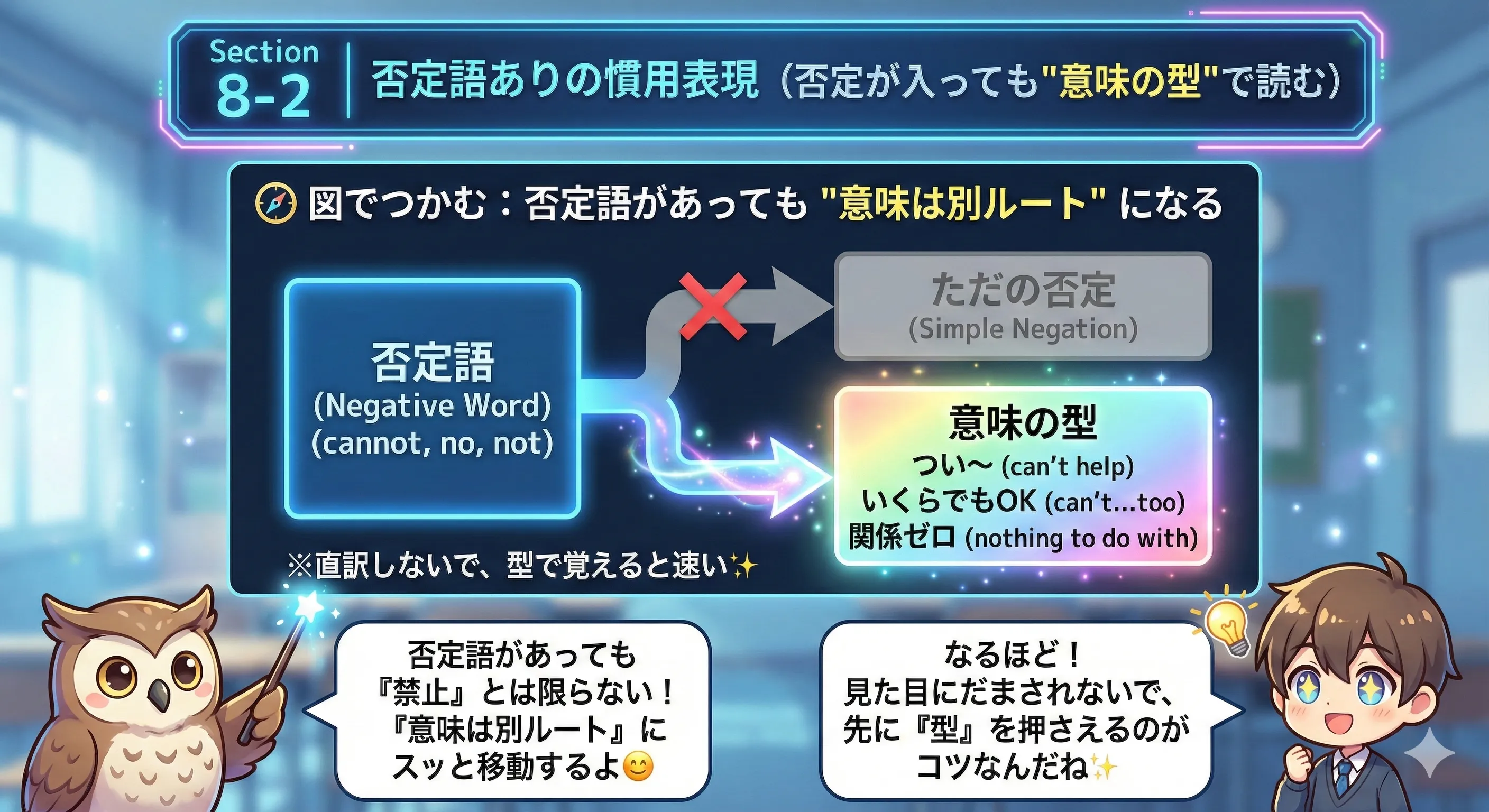
※ 直訳(ちょくやく)=単語をそのまま日本語にすること。慣用表現は直訳しない方がスムーズです✨
🚪 8-2-0. 否定語があっても “禁止” とは限らない(まず型で読む)
cannot があると「できない?」と反射しがちですが、
慣用表現では
意味が別の方向
にスッと移動することがあります😊
だから先に、次の “意味の型” を押さえましょう。
cannot help -ing →
「止められない=つい〜してしまう」
cannot ... too ... →
「いくら〜しても、しすぎない」
まずは “型” をつかんでから例文を見ると、英文が一気に読みやすくなります。
🧲 8-2-1. cannot help -ing(〜せずにはいられない)
ここでのポイントは、
cannot = できない と読まずに、
「止められない」 に変換することです😊
※ help(助ける)という単語ですが、ここでは「(やめるのを)止める手助けができない」→「やめられない」のイメージ
| 形 | 意味(日本語) | よくある動詞 |
|---|---|---|
🧩 cannot help + V-ing |
〜せずにはいられない | laughing, smiling, admiring, checking |
🧩 couldn’t help + V-ing |
(過去)〜せずにはいられなかった | 気持ちが動いた場面でよく出ます |
cannot help を見たら、
「つい〜してしまう」 を先に置く😊
×「助けられない」 と直訳で止まると意味が迷子になります。
○「止められない」 に変換して読みましょう😊
I can’t help laughing at the joke.
(その冗談に、笑わずにはいられない。)
We can’t help admiring their effort.
(彼らの努力には、賞賛しないわけにはいきません。)
effort=努力
She couldn’t help smiling when she saw the photo.
(その写真を見て、彼女は思わず笑顔になってしまった。)
couldn’t help が自然です😊
He can’t help checking his phone.
(彼はついスマホをチェックしてしまう。)
cannot help -ing は
「止められない=つい〜」 の型!
✅ 8-2-2. cannot … too …(いくら〜しても、しすぎることはない)
見た目は cannot(できない)が入っていますが、
ここは意味が反転して
「いくら〜してもOK(やりすぎにならない)」
になります😊
つまり、強いおすすめ・注意 を言う便利な型です。
※ 上限(じょうげん)=これ以上はダメ、という“限界”のこと
| 形 | 意味(日本語) | よく出る語 |
|---|---|---|
🧩 You can’t be too careful. |
用心はいくらしてもしすぎない | careful, patient, polite |
🧩 We cannot praise A too highly. |
Aはいくら褒めても褒めすぎない | praise, thank |
cannot と too がセットで出たら、
「上限なし(いくらでもOK)」に変換😊
cannot を見て「できない」で止まると逆の意味になります😵💫この型は “おすすめ・注意の強調” と覚えましょう。
You can’t be too careful.
(用心はいくらしてもしすぎることはない。)
You can’t be too patient with children.
(子どもには、いくらでも辛抱強く(=やさしく)していい。)
patient=我慢強い/やさしく待てる
We cannot praise her too highly.
(私たちは彼女を、どれだけ褒めても褒めすぎにならない。)
I can’t thank you too much.
(あなたには、どれだけ感謝しても感謝しきれない。)
cannot ... too ... は
「上限なし=いくらでもOK」の型!
🚶 8-2-3. no longer / not … any longer(もう〜ない)
この2つはどちらも
「もう〜ではない/もう〜しない」
という意味です😊
long(長く)から来ていて、
「これ以上長く続かない」→「もう終わった(もうない)」のイメージ✨
※ “これ以上”=more(もっと)という意味。any longer は「これ以上長く」の感覚です。
🧭 使い分け(ここだけ押さえればOK)
| 形 | 意味(日本語) | よくある形 |
|---|---|---|
🟦 S + be + no longer + 名詞/形容詞 |
Sはもう〜ではない | no longer a child, no longer necessary |
🟩 S + not + 動詞 + any longer |
Sはもう〜しない | don’t live here any longer |
🟨 I can’t ... any longer |
もうこれ以上…できない | I can’t wait any longer |
longer を見たら
「これ以上続かない」 →
「もう〜ない」へ変換😊
no longer は “今はもう違う” のサイン。前と今の変化(昔は〜だったけど今は違う)を意識すると読みやすいです😊
He is no longer a child.
(彼はもう子どもではありません。)
She doesn’t live here any longer.
(彼女はもうここには住んでいない。)
live=住む
I can’t wait any longer.
(もうこれ以上待てません。)
This method is no longer effective.
(この方法はもう効果がありません。)
no longer / not ... any longer は
「もう〜ない」の型!😊
🚫 8-2-4. have nothing to do with …(〜と関係がない)
have nothing to do with は、
「関係がない」を強く言う型です。
nothing(ゼロ)が入るので、
「関係が少ない」ではなく「関係ゼロ」 のニュアンスになります😊
※ “関係”=つながり。仕事の担当・原因・理由などの “つながり” がない、ということ。
🧩 形のポイント(ここだけ)
| 形 | 意味(日本語) | よくある相手 |
|---|---|---|
🟥 have nothing to do with + 名詞 |
〜とは無関係だ | money, you, the accident |
🟦 That has nothing to do with it. |
それは関係ないよ | 会話でよく使う |
nothing を見たら
「ゼロ」!
関係が “薄い” ではなく “ない” と読む😊
「何もすることがない?」と直訳すると迷子になります😵💫
ここは “無関係” の決まり文句として丸ごと覚えましょう。
I have nothing to do with them.
(私は彼らと全く関係がない。)
This has nothing to do with money.
(これはお金とは関係ない。)
money=お金
That has nothing to do with it.
(それは関係ないよ。)
The accident had nothing to do with the weather.
(その事故は天気とは関係がなかった。)
have nothing to do with は
「関係ゼロ(無関係)」の型!😊
🧱 8-2-5. There is no V-ing(〜することはできない)
There is no は「〜は存在しない」。
だから There is no V-ing は、
「〜する方法がない=〜できない」
という意味になります😵💫
※ “存在しない”=そこに “ない” ということ。道(方法)がない → できない、のイメージです。
🧭 いったん “型変換” すると速い
| 形 | 意味(日本語) | よく出る V-ing |
|---|---|---|
🧩 There is no telling ... |
〜は分からない | telling, knowing |
🧩 There is no denying ... |
〜は否定できない | denying, doubting |
🧩 There is no accounting for ... |
〜は説明できない | accounting(決まり) |
There is no を見たら
「方法がない=できない」に変換😊
There is no は「禁止」ではなく
“不可能” を言うことが多いです。「ダメ!」より「ムリ!」の気持ちで読むと自然😊
There is no accounting for tastes.
(人の好みは説明できないものだ。)
There is no knowing what may happen.
(何が起こるか知る由もない。)
may=〜かもしれない
There is no telling what he really means.
(彼が本当は何を言いたいのか、分からない。)
There is no denying that she is talented.
(彼女が才能あることは否定できない。)
There is no V-ing は
「〜できない(不可能)」の型!😊
⚡ 8-2-6. No sooner … than / Hardly … when(〜するとすぐに…)
これは
「〜した瞬間に…」
を強調する上級パターンです✨
見た目に否定っぽい語(no, hardly)がありますが、
ここでは意味は
「超スピード」
です😊
※ 倒置(とうち)=語順をひっくり返して強調する形(had I などになる)
🧭 まずは意味だけ先に(ここが大事)
| 形 | 意味(日本語) | よくある特徴 |
|---|---|---|
⚡ No sooner had S p.p. than ... |
Sが〜した瞬間に… | had が前に出る(倒置) |
⚡ Hardly had S p.p. when ... |
Sが〜したとたんに… | hardly=ほとんど〜ない(否定っぽい) |
No sooner / Hardly を見たら、
「瞬間(とたん)」に変換😊
文法は後でOK!
形としては
had が前に出る “倒置” がよくありますが、
最初は 「意味=超すぐ」 だけ取れれば十分です😊
No sooner had I sat down than the phone rang.
(座ったとたんに電話が鳴った。)
rang=(電話などが)鳴った
No sooner had she arrived than it started to rain.
(彼女が着くやいなや雨が降り出した。)
Hardly had we started when the power went out.
(始めたとたんに停電した。)
went out=(電気が)消えた/停電した
Hardly had I met her when I fell in love with her.
(彼女に会ったとたんに恋に落ちてしまった。)
No sooner / Hardly は
「〜した瞬間に…」の型!😊まず意味を取って、文法(倒置)はあとでOKです✨
⏳ 8-2-7. It will not be long before …(間もなく〜だ)
見た目は not(否定)が入っていますが、意味は前向きに
「もうすぐ〜だ/遠くない」
になります😊
直訳すると「長くはならない」→ つまり
“時間があまりかからない”
=「間もなく」という発想です✨
※ before(〜の前に)=「〜が起こる前に(時間が短い)」というイメージ
🧭 まず “型変換” で一発理解
| 形 | 意味(日本語) | よく来る内容 |
|---|---|---|
⏳ It will not be long before S V |
間もなくSがVする | dream comes true, results are announced |
⏳ It won’t be long before ... |
(短縮)もうすぐ〜だ | 会話・メールでもよく出る |
not be long を見たら
「長くない=すぐ」 に変換😊
「否定語がある=悪い話」ではありません。
これは “時間が短い” を伝える表現なので、 文全体は明るいトーンになりやすいです✨
It will not be long before your dream comes true.
(君の夢が実現する日も遠くないだろう。)
It won’t be long before we meet again.
(また会えるのも、もうすぐだよ。)
meet again=また会う
It will not be long before the results are announced.
(結果が発表されるのも間もなくだ。)
announce=発表する
It won’t be long before she feels better.
(彼女の具合がよくなるのも、もうすぐだよ。)
It will not be long before ... は
「もうすぐ〜だ」の型!😊
🧠 8-2-8. ミニまとめ:否定語が見えたら「意味の型」に変換!
8-2 のポイントは、
否定語を見た瞬間に
“ただの否定” と決めつけず、
どの型か を選ぶことです😊
ここまで来たあなたは、もう読み方がかなり整っています✨
🗂️ 8-2 変換表(これだけ見ればOK)
| 見た目(形) | 意味の型(日本語) | 覚え方(ひとこと) |
|---|---|---|
🧲 cannot help -ing |
つい〜してしまう | 止められない |
✅ cannot ... too ... |
いくら〜しても、しすぎない | 上限なし |
🚶 no longer / not ... any longer |
もう〜ない | 変化 |
🚫 have nothing to do with |
関係ゼロ | ゼロ |
🧱 There is no V-ing |
〜できない(不可能) | 道がない |
⚡ No sooner ... than / Hardly ... when |
〜した瞬間に… | 超スピード |
⏳ It will not be long before ... |
もうすぐ〜だ | 時間が短い |
最初は「型→意味」が出るだけで大成功です😊
例文を声に出して(音声でもOK)3回ずつ触れると、自然に体に入ってきます✨
🧾 まとめ:否定の要点チェック
否定は、まず 合図(not / never など) を見つけて、 次に 範囲(どこを否定?) を決め、 最後に 強さ(全否定/部分否定/準否定/二重否定) を判定します😊 📱 スマホでも一瞬で判断できるように「超短チート表+チェック」で回収しましょう!
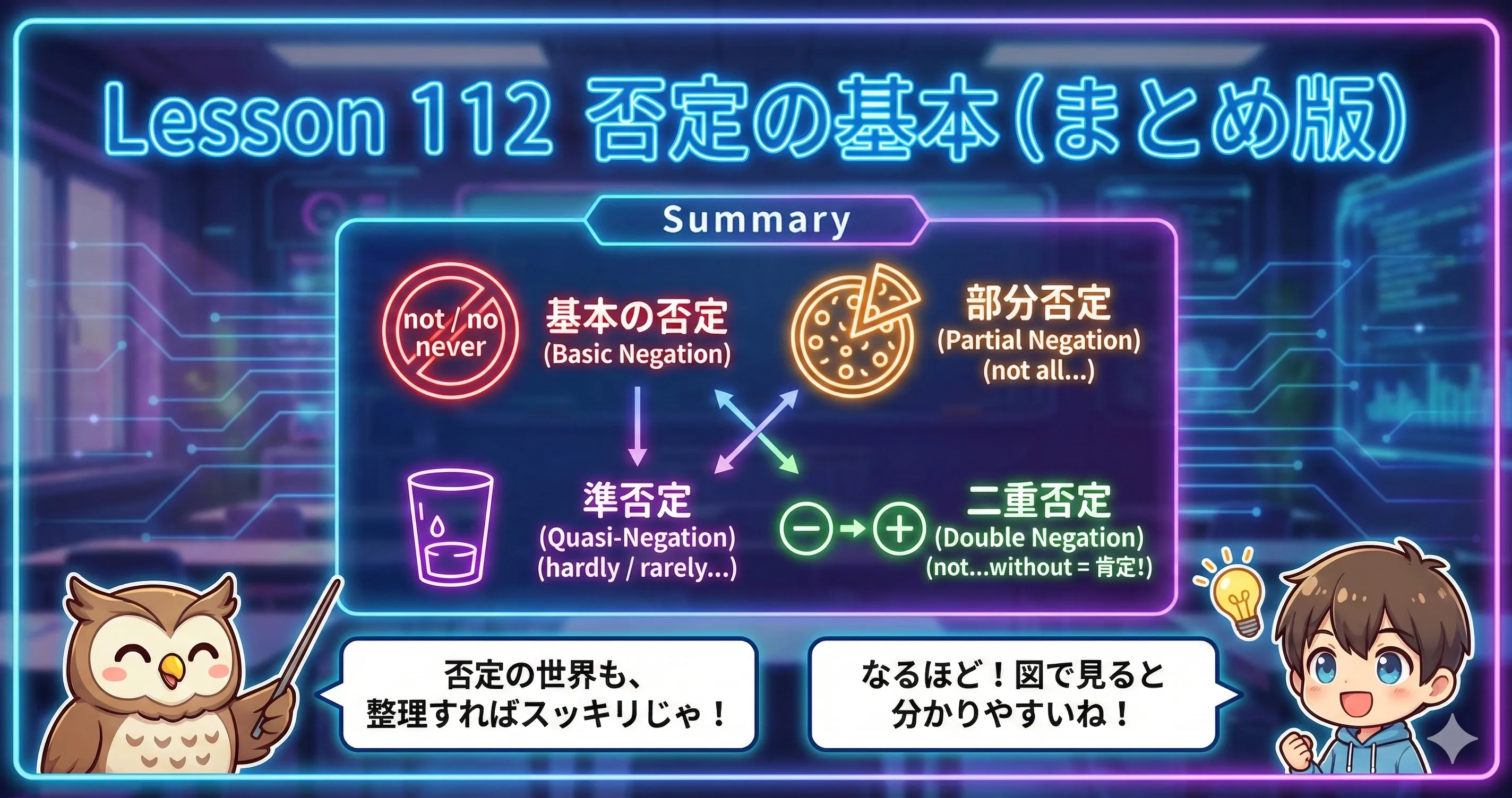
否定ワードを発見👀
まずは「否定のサイン」を見つけよう!見つけた瞬間に、文章の空気が変わります⚡
- not / no / never
- few / little(準否定になりやすい)
- hardly / rarely / seldom
どこを否定してる?🎯
否定は「文全体」なのか「一部分」なのかで意味が激変!ここがいちばん大事です✅
I don’t think he will come.
(彼は来ないと思います。)
どれくらい否定?💪
「ゼロ」なのか「全部じゃない」なのかで点差がつきます。ここで誤読を防止!🚨
○ まず “否定のタイプ” を確定してから訳す
否定は 合図 を見つけて、 範囲 を決め、 強さ を判定するだけ😊 これで「全否定?部分否定?」のモヤモヤがスッキリします✨
📌 「否定の種類×強さ」チート表(超短)
迷ったらここだけ見よう!「どのタイプ?」と「どれくらい強い?」が一瞬で分かる📱✨
| 種類(何をする?) | 強さ(どれくらい?) | 代表サイン(超定番) | 読み方のコツ(ミス防止) |
|---|---|---|---|
|
🧩 文否定 文全体を否定 |
⚖️ 中〜強
内容による
|
not (be/助動詞の後ろ) |
✅ まず 範囲 を確認:文全体が「〜ではない」になる
例:
He is not tired.(彼は疲れていない)
|
|
🎯 語句否定 一部だけ否定 |
⚖️ 中
対比が多い
|
not (否定したい語句の前) |
✅ 「AではなくB」の形になりやすい(言い分け)
例:
Not today, but tomorrow.(今日じゃなく明日)
|
|
🚫 全否定 ゼロを言う |
🔥 強い
0%
|
never no not … at all |
✅ 「一度も/ひとつも」の感覚を入れると誤読しない
例:
I have never met him.(彼に会ったことが一度もない)
|
|
🟠 部分否定 全部ではない |
⚠️ 要注意
100%否定ではない
|
Not all not always not necessarily |
🚨 「全部ダメ」ではない!一部はOKの余地がある
例:
Not all students agree.(全員が賛成というわけではない)
|
|
🟣 準否定 ほぼ〜ない |
🧊 弱〜中
でも「少し」は残ることも
|
few little hardly rarely |
✅ few / little は「少しある」じゃなく
“ほとんどない寄り”に倒れやすい
例:
He has little time.(彼はほとんど時間がない)
|
|
🔁 否定の転移 否定がズレる |
🧠 読解ポイント
意味は中身へ
|
I don’t think … (think/believe など) |
✅ 文の否定より中身が否定寄りになりやすい(結論を先に取る)
例:
I don’t think he’ll come.(彼は来ないと思う)
|
|
♻️ 二重否定 否定×否定 |
✅ 肯定寄り
ニュアンス注意
|
not … without not a few |
✅ 「〜しないではいられない」や「結構いる」などむしろ肯定に変わる
例:
I can’t speak of it without crying.(泣かずにそれを語れない)
|
迷ったら 部分否定 と 準否定 を優先チェック!ここで点差がつきます🔥
🚨 読み間違いワースト3(ここで点が落ちる)
「単語は知ってるのに失点する…」の原因はココ!📉 パターンで覚えると、読解もテストも一気に安定します😊
「全部ダメ」と読んでしまう😱
Not all A are B を「Aは全部Bじゃない(=全部ダメ)」にしてしまう
Not all students agree.
(生徒全員が賛成というわけではない。)
few / little を「少しある」と誤解😵
few / little を「少しある」だと思ってしまう
He has little time.
(彼はほとんど時間がない。)
「思わない」だけで止めてしまう🤔
I don’t think ... を「私はそう思わない」だけで終わらせ、
結論(来る/来ない) を取り損ねる
I don’t think he will come.
(彼は来ないと思います。)
⚡ 倒置(語順チェンジ)は“合図だけ”でまとめる
否定っぽい語が文頭に来たら要注意👀 英語では、強調のために 助動詞 / be動詞 が 主語の前に出ることがあります(=倒置)📱✨
こういう語が文頭に来たら倒置しやすい⚡
形はこれだけ覚えればOK✅
Never have I seen such a thing.
(そんなものは一度も見たことがない。)
🔧 構造:Never + have + I + seen ...(have が前へ出る)
✅ ポイント:意味は 「一度も〜ない」 の強調!
文頭に 否定っぽい語 が来たら、 助動詞 / be が 主語の前に出るかも⚡ まずは「倒置=強調」と覚えて、意味を落とさないのが最優先です😊
